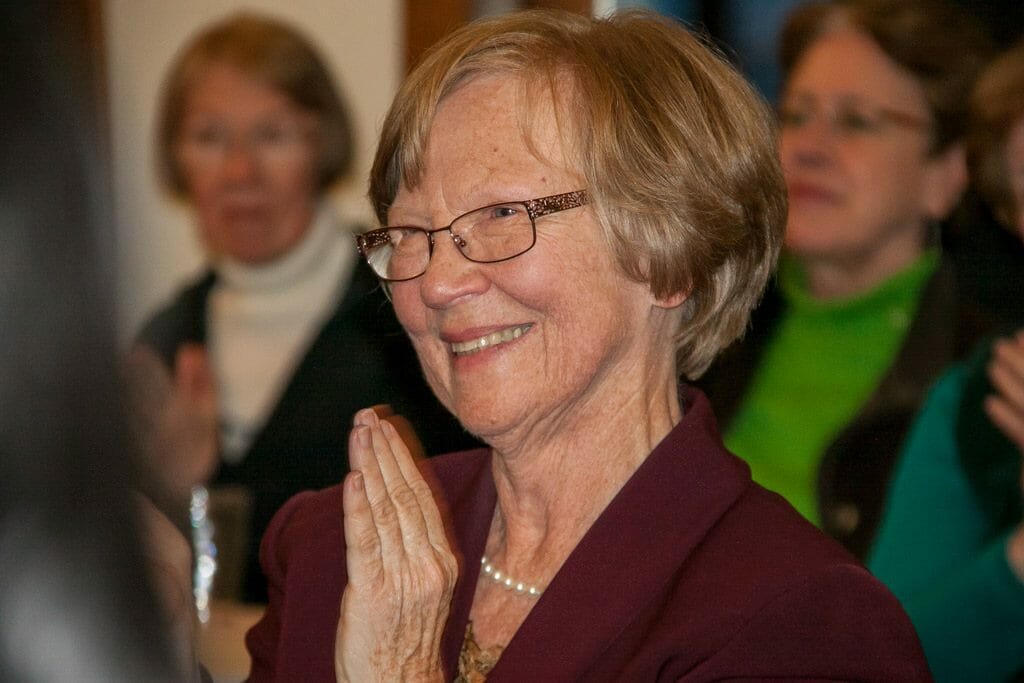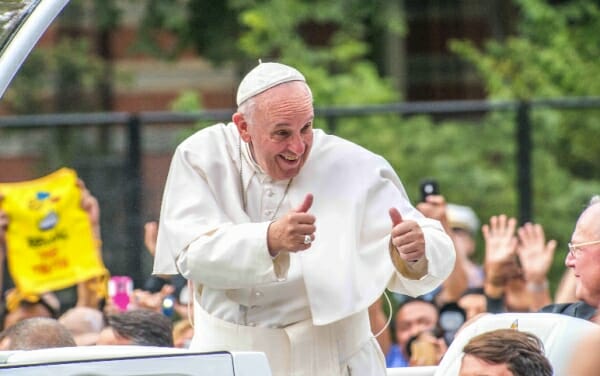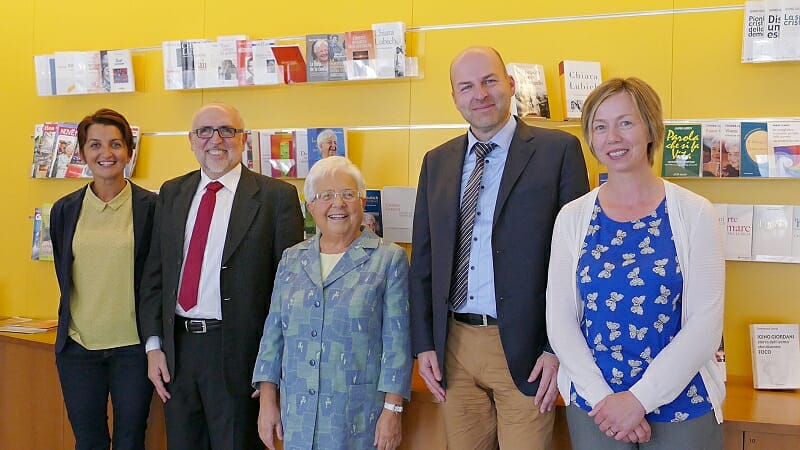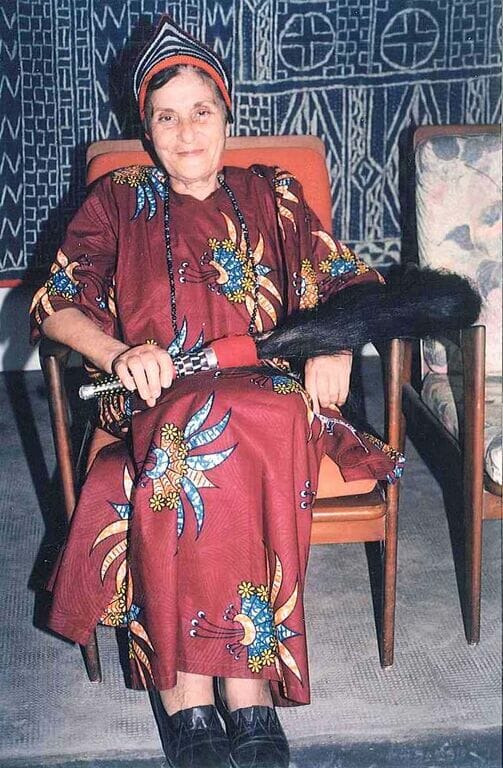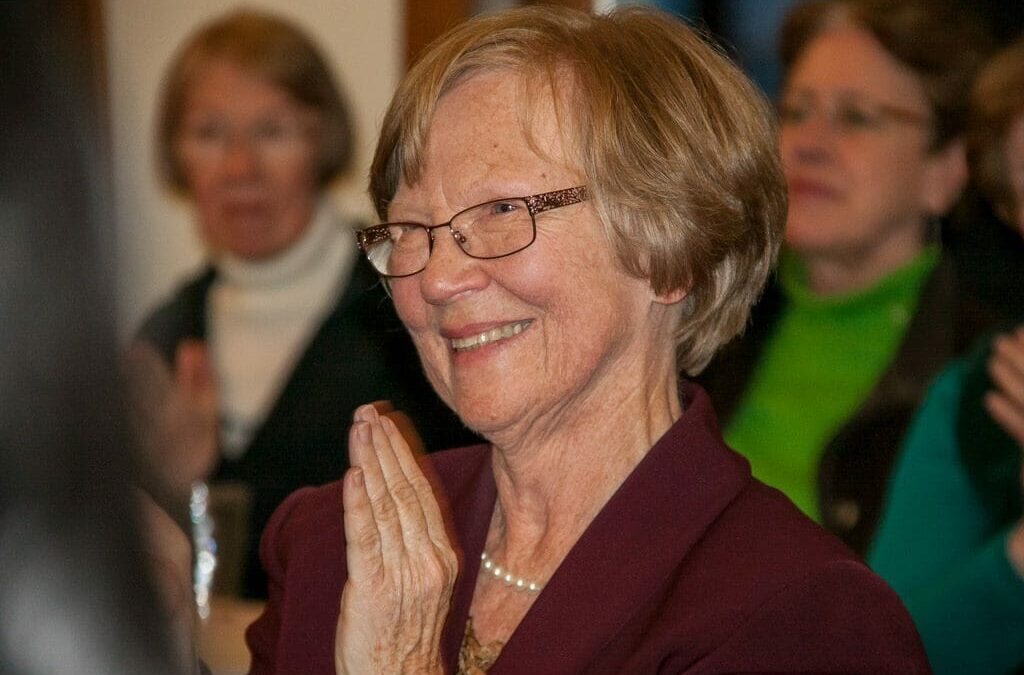
Is it possible to face suffering?
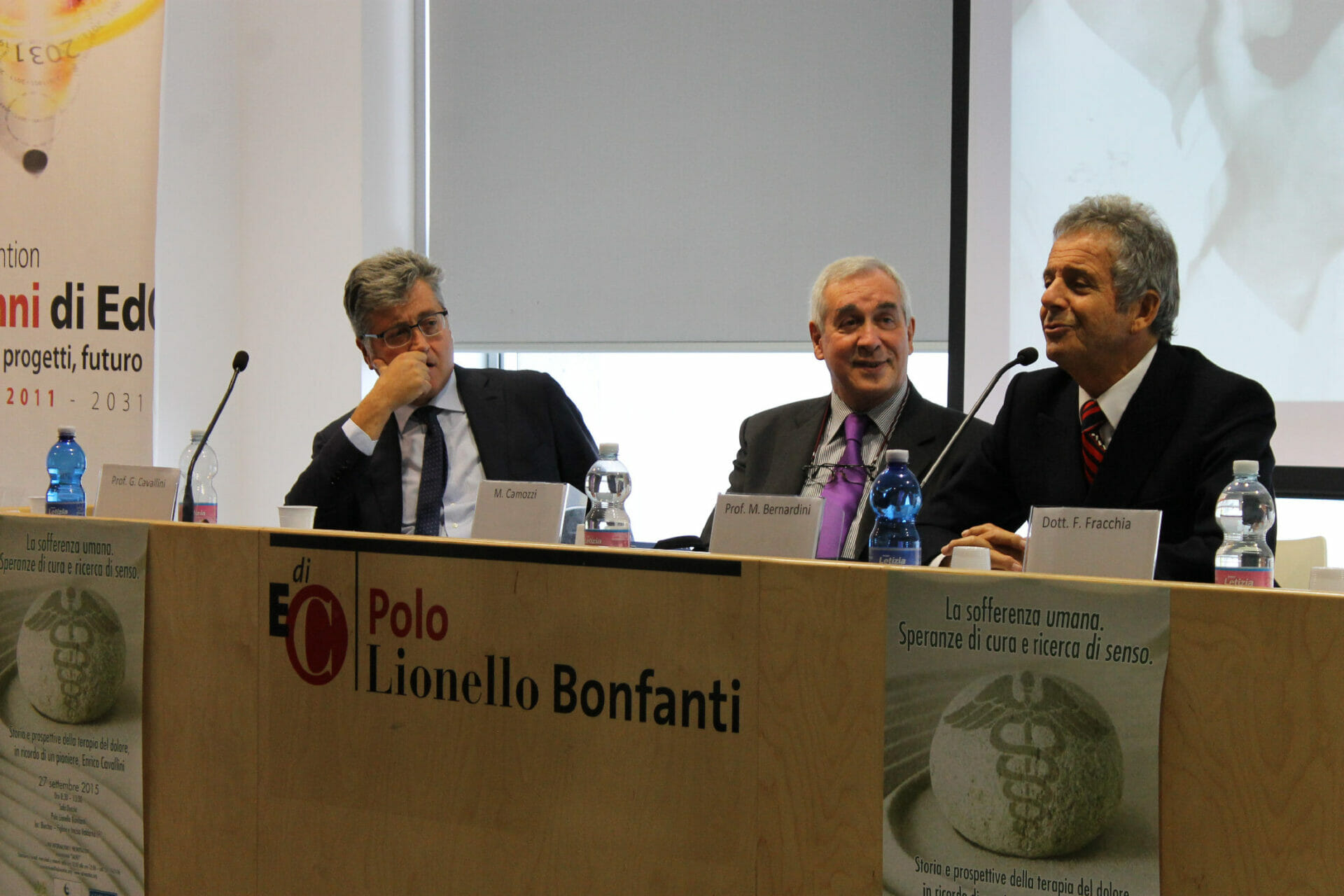 Nancy O’Donnell has worked as a psychotherapist with drug addicts and was once in charge of a medical centre that helps alcoholic women and their children. The issue of the meaning of suffering is central to the lives of people especially during their illness. We would like to ask if it is possible to face the problem of illness and find hope. “Suffering is part of every human life and it would be very difficult to help those who suffer if we ourselves have not found meaning in our own suffering. The path towards hope lies in this effort. Science offers new treatments and new therapies to improve the lives of many. The danger is when we let ourselves be fooled, believing that we will find a way not to get old, sick or suffer. If we seek only the hope of healing, we run the risk of deceiving ourselves, and this may lead to desperation which is the opposite of hope.” What is the role of psychology in the experience of the sick people, and in helping them to find hope? “We could summarise it in four points: the role of the personality and the possibility to change it, the importance of healthy relationships in facing disease, the need to know and accept one’s own limits, and the human capacity to be a gift to others. Personality: being optimistic or having a positive attitude may reduce the risk of illnesses and chronic disorders. At the Davis University in California, they discovered that writing down each day the things you are grateful for helped to increase happiness. The results were more significant when compared with a group that was asked to note down instead, only the things that had provoked greater stress.
Nancy O’Donnell has worked as a psychotherapist with drug addicts and was once in charge of a medical centre that helps alcoholic women and their children. The issue of the meaning of suffering is central to the lives of people especially during their illness. We would like to ask if it is possible to face the problem of illness and find hope. “Suffering is part of every human life and it would be very difficult to help those who suffer if we ourselves have not found meaning in our own suffering. The path towards hope lies in this effort. Science offers new treatments and new therapies to improve the lives of many. The danger is when we let ourselves be fooled, believing that we will find a way not to get old, sick or suffer. If we seek only the hope of healing, we run the risk of deceiving ourselves, and this may lead to desperation which is the opposite of hope.” What is the role of psychology in the experience of the sick people, and in helping them to find hope? “We could summarise it in four points: the role of the personality and the possibility to change it, the importance of healthy relationships in facing disease, the need to know and accept one’s own limits, and the human capacity to be a gift to others. Personality: being optimistic or having a positive attitude may reduce the risk of illnesses and chronic disorders. At the Davis University in California, they discovered that writing down each day the things you are grateful for helped to increase happiness. The results were more significant when compared with a group that was asked to note down instead, only the things that had provoked greater stress. 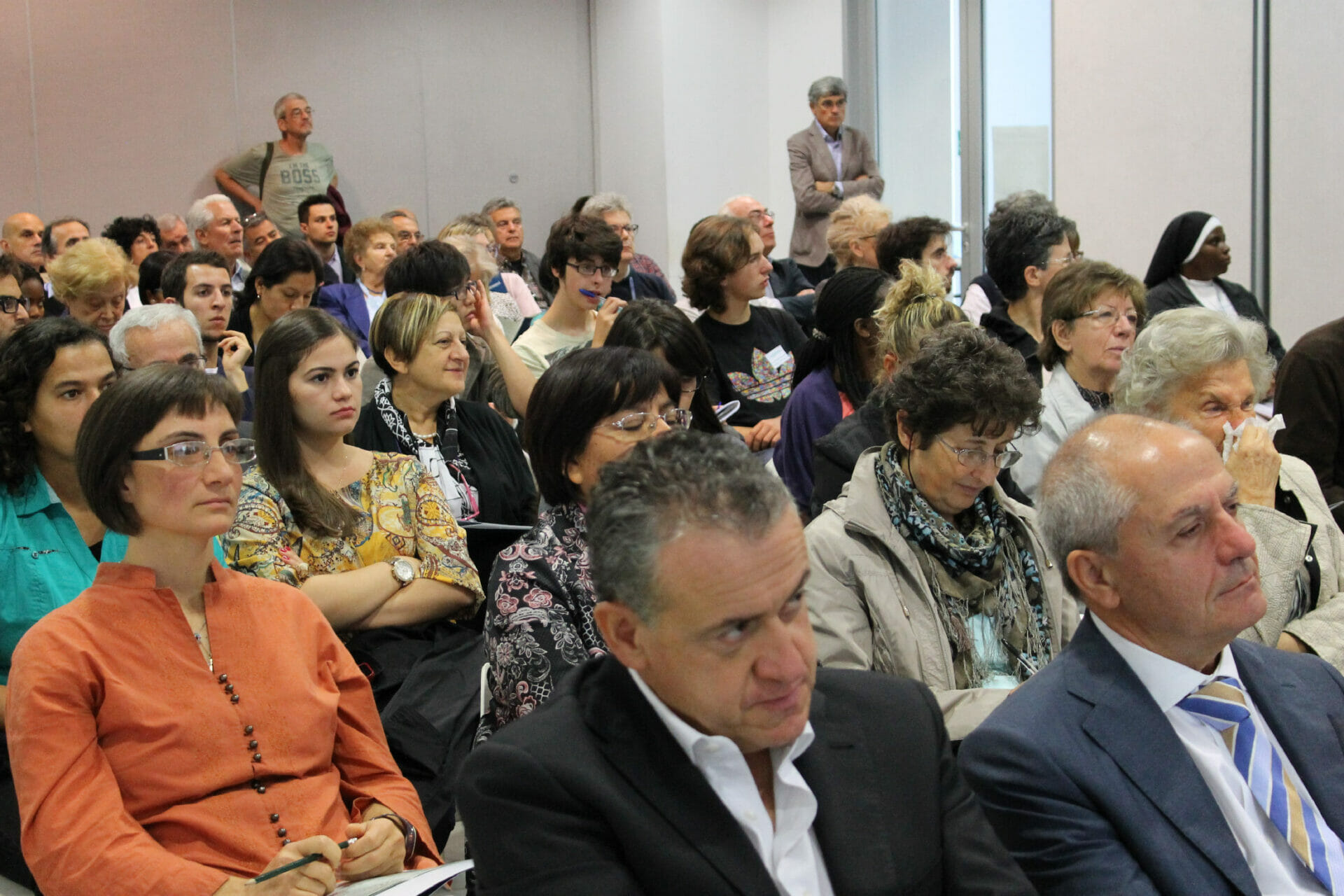 The second point: relationships. From the moment we are born, we have the capacity to establish relationships. The mental health of every person depends on his capacity to “coordinate” himself and “tune in” with others. The human mind is healthy when it possesses some strategic relational skills that allow it to “open up” to a multitude of social realities, that is, with the ability to “perceive” the others and their diversity in an adequate manner. If our identity is relational, it would be logical in moments when nurturing hope becomes a challenge to find the support of people close to us and with whom we have built deep relationships which strengthen the positive energy we need to remain hopeful. Furthermore, not accepting one’s own limits is one of the most typical difficulties people have today. The limit appears through the person’s condition and his/her story, through those experiences that imply the risk of frustration. In a world that offers us a life “without limits,” the onset of illness takes on numerous expressions of that limitation which becomes a decisive transition towards achieving one’s own fulfillment. Lastly, being a gift for the others even when your physical strength is greatly reduced makes a person play an active role always. This is where you acquire a dignity that is born in the depths of our being.”
The second point: relationships. From the moment we are born, we have the capacity to establish relationships. The mental health of every person depends on his capacity to “coordinate” himself and “tune in” with others. The human mind is healthy when it possesses some strategic relational skills that allow it to “open up” to a multitude of social realities, that is, with the ability to “perceive” the others and their diversity in an adequate manner. If our identity is relational, it would be logical in moments when nurturing hope becomes a challenge to find the support of people close to us and with whom we have built deep relationships which strengthen the positive energy we need to remain hopeful. Furthermore, not accepting one’s own limits is one of the most typical difficulties people have today. The limit appears through the person’s condition and his/her story, through those experiences that imply the risk of frustration. In a world that offers us a life “without limits,” the onset of illness takes on numerous expressions of that limitation which becomes a decisive transition towards achieving one’s own fulfillment. Lastly, being a gift for the others even when your physical strength is greatly reduced makes a person play an active role always. This is where you acquire a dignity that is born in the depths of our being.”
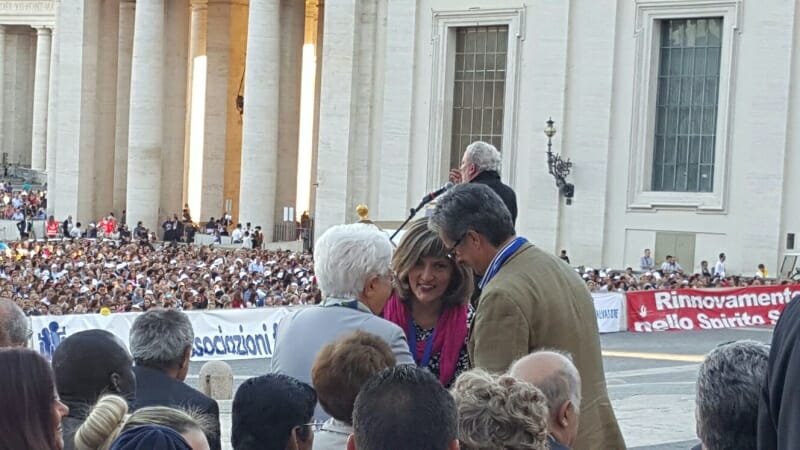
Synod on the Family: hopes and expectations
 Maria Voce took part in the prayer vigil in St. Peter’s Square on Saturday, October 3rd where she gave a short talk. The journalist began by asking her: Why is this time of prayer so important? “It is because, as Christians, we believe it is above all the Holy Spirit who should be at work. This is a very delicate time when we hear many different opinions in the media. But it is only the Holy Spirit who can satisfy the great expectations, and do so as He wants and not how people think. So the most important thing is to pray for special help from the Holy Spirit, first of all for the Pope and then for all the Synod Fathers.” It helps us broaden our horizons a bit… “The family is the most wounded part of humanity at the moment. In a certain sense, it is like a sick daughter who the Church is watching over with a mother’s love, wanting her to get well. The Church is doing this act of pastoral conversion to care to one of its members who is suffering. I think all of us should have this attitude. I think we should disregard expectations for some kind of major changes from the doctrinal point of view or in the laws that govern the institution of marriage. I think that the greatest expectation is to ask ourselves as a Church what conversion is required of us towards these suffering brothers and sisters. The family is bombarded from all sides nowadays, by politics and by business lobbies; by those who want to take advantage of family issues as opportunities to pursue their own interests. The Focolare Movement has always had special concern for the family. One of its branches is especially dedicated to them and seeks to follow all the families in the world. They help prepare young people for marriage so that they can face married life with greater awareness. As far as possible they also help them find what they need (work, home, and so on) so as to start a family. And after marriage, they accompany these young couples on their new journey so that at the first signs of possible crises, which are natural, they may find a community ready to welcome and make them feel that they are not alone, that the love of the community is always present and caring. They do courses on addressing crises, with trained specialists. They help people who are separated and also those who are divorced and remarried, so that they feel, even in these circumstances, that they are members of the community and are loved and respected in their dignity as God’s children. They are helped to discover that being part of the community does not only mean sharing in the Eucharist but is manifested in living Gospel love together, sharing joys and sufferings, experiencing the closeness of God and the Church. The Synod asks all of us to make this conversion together, and this seems to me to be very important. However, I do not think that we should only focus on the divorced and remarried. The Synod is concerned with the family in its whole lifespan: widows, parents with young people who cannot find work, refugees, children, and so on. We need to look at the family as an icon of today’s society: it is humanity today that is suffering in the family. And humanity today must take on this suffering family and make this burden its own.” So the family is an encounter with the Church “going outwards” as Pope Francis continually urges us? “Absolutely! I believe it is the family that you can bear witness to the possibility of deep personal relationships, not only those you have by phone or on the internet. It is person to person relationships, with your children’s friends, and their parents, for example. Our role as laypeople is to be alongside everyone, to leave our own safe backyard so as to journey with them every day, in schools, at work, in the daily problems. This is why laity are at the Synod, and we too are very glad that a Focolare couple from Colombia were invited as auditors, Angelica Maria and José Luis from Colombia.” Last year, there was a couple from Rwanda, am I right? “Yes. I think that these married lay people at the Synod bring all the challenges that they too live and encounter, together with the others. Naturally, the Synod Fathers come with all the experiences, statements and sufferings that they have collected around the world. But this encounter between the ministerial Church and the laity is good. The Church is just one reality in which lay people and priests are together. The Church is the people of God on the move, taking care of all her children.” Listen to the complete interview of Radio Inblu with Maria Voce, 3 October 2015 (in Italian from 11’ 15’’)
Maria Voce took part in the prayer vigil in St. Peter’s Square on Saturday, October 3rd where she gave a short talk. The journalist began by asking her: Why is this time of prayer so important? “It is because, as Christians, we believe it is above all the Holy Spirit who should be at work. This is a very delicate time when we hear many different opinions in the media. But it is only the Holy Spirit who can satisfy the great expectations, and do so as He wants and not how people think. So the most important thing is to pray for special help from the Holy Spirit, first of all for the Pope and then for all the Synod Fathers.” It helps us broaden our horizons a bit… “The family is the most wounded part of humanity at the moment. In a certain sense, it is like a sick daughter who the Church is watching over with a mother’s love, wanting her to get well. The Church is doing this act of pastoral conversion to care to one of its members who is suffering. I think all of us should have this attitude. I think we should disregard expectations for some kind of major changes from the doctrinal point of view or in the laws that govern the institution of marriage. I think that the greatest expectation is to ask ourselves as a Church what conversion is required of us towards these suffering brothers and sisters. The family is bombarded from all sides nowadays, by politics and by business lobbies; by those who want to take advantage of family issues as opportunities to pursue their own interests. The Focolare Movement has always had special concern for the family. One of its branches is especially dedicated to them and seeks to follow all the families in the world. They help prepare young people for marriage so that they can face married life with greater awareness. As far as possible they also help them find what they need (work, home, and so on) so as to start a family. And after marriage, they accompany these young couples on their new journey so that at the first signs of possible crises, which are natural, they may find a community ready to welcome and make them feel that they are not alone, that the love of the community is always present and caring. They do courses on addressing crises, with trained specialists. They help people who are separated and also those who are divorced and remarried, so that they feel, even in these circumstances, that they are members of the community and are loved and respected in their dignity as God’s children. They are helped to discover that being part of the community does not only mean sharing in the Eucharist but is manifested in living Gospel love together, sharing joys and sufferings, experiencing the closeness of God and the Church. The Synod asks all of us to make this conversion together, and this seems to me to be very important. However, I do not think that we should only focus on the divorced and remarried. The Synod is concerned with the family in its whole lifespan: widows, parents with young people who cannot find work, refugees, children, and so on. We need to look at the family as an icon of today’s society: it is humanity today that is suffering in the family. And humanity today must take on this suffering family and make this burden its own.” So the family is an encounter with the Church “going outwards” as Pope Francis continually urges us? “Absolutely! I believe it is the family that you can bear witness to the possibility of deep personal relationships, not only those you have by phone or on the internet. It is person to person relationships, with your children’s friends, and their parents, for example. Our role as laypeople is to be alongside everyone, to leave our own safe backyard so as to journey with them every day, in schools, at work, in the daily problems. This is why laity are at the Synod, and we too are very glad that a Focolare couple from Colombia were invited as auditors, Angelica Maria and José Luis from Colombia.” Last year, there was a couple from Rwanda, am I right? “Yes. I think that these married lay people at the Synod bring all the challenges that they too live and encounter, together with the others. Naturally, the Synod Fathers come with all the experiences, statements and sufferings that they have collected around the world. But this encounter between the ministerial Church and the laity is good. The Church is just one reality in which lay people and priests are together. The Church is the people of God on the move, taking care of all her children.” Listen to the complete interview of Radio Inblu with Maria Voce, 3 October 2015 (in Italian from 11’ 15’’)
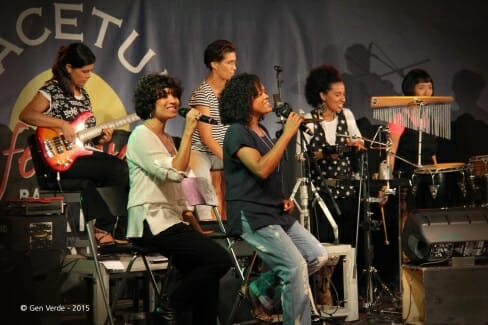
Gen Verde’s On the Other Side Tour takes off in Great Britain
 “We worked hard. For three years we listened to thousands of people, especially the young people that we met at home or on tour. We composed music and wrote lyrics, but above all strived to live out the meaning of our words: putting ourselves in the game, taking risks, welcoming both the ugly and beautiful in humanity. We can’t wait to go to Great Britain. The one talking is Sally McAllister, Gen Verde’s manager, Irish by birth and English by adoption: “I’ve lived in London for more than 30 years and learnt to know and love the people. So it is with much joy that we are accepting the invitation to return there.” The Focolare has been in Great Britain since 1963, spread throughout many cities of the United Kingdom, and its members are Roman Catholic, Anglican and faithful of the Free Churches. There are also Muslims and Sikhs who, in their own way, are true witnesses of a living unity that is at times lived out painstakingly in daily life. “Why did they invite us,” Sally asks. “The Focolare communities arranged the entire tour:a group of twenty young people and adults, families that are spread throughout the United Kingdom. We dreamed it up and organised it together. They told us that they wanted to open hearts and hands, to recompose relationships, overcome hatreds and distrust: to encounter the people and share the gift of communion in diversity.” “That took courage, and I must say that these people have a good dose of it! We’ll have 12 engagements with a total of 7 “Start Now” shows, 5 acoustic concerts and several other encounters.” Listening to Sally’s words one realises that they are only the tip of the iceberg and that Gen Verde’s musical tour in the United Kingdom is capable of touching a chord with the people. “We’ll go on stage in complex places like London, Birmingham, Glasgow, Oxford, Liverpool, Portsmouth and Cardiff,” Sally explained, “with a social and cultural fabric that has been defined as post-Christian and disintegrating, but where ecumenical and interreligious dimensions are still strong. Through the music, words and choreography we will describe the life amongst us and many other parts of the world: a life of communion, fraternity, sacrifice and reciprocity. We would like to show the ‘much more’ that is already there but not being spotlighted by British society; what is being done for others but risks remaining hidden behind media titles that often broadcast exclusion, defensiveness and fear.” In London, Gen Verde will also meet young people from the Islamic Centre, invited by Imam Dr. Mohammad Ali Shomali. “Let us focus on the values that unite us and and work together.” Judging by the passion that Sally is putting into this, it is obvious that young people will have the place of honour during this tour: “They are the thermometer of society, they often live in the darkest depths and it is no mystery that even Great Britain, like other European countries, violence and suicides are very much on the rise amongst people under 30. The new show that will go on stage in Great Britain will also include some new pieces “On the Other Side,” their latest released album. “It is geared towards young people and its themes are universal. It presents a journey in four parts: We begin with the challenges, the deep ones, the ones that make you look into yourself. Then comes the question: Is it even possible to overcome them? Finally, there is the invitation to go out and build the present and the future together, and this part is called “No frontiers,” because together we can make the difference.” See official Focolare website for news and events: www.focolare.org/gb https://www.youtube.com/watch?v=llkkHKzywrM
“We worked hard. For three years we listened to thousands of people, especially the young people that we met at home or on tour. We composed music and wrote lyrics, but above all strived to live out the meaning of our words: putting ourselves in the game, taking risks, welcoming both the ugly and beautiful in humanity. We can’t wait to go to Great Britain. The one talking is Sally McAllister, Gen Verde’s manager, Irish by birth and English by adoption: “I’ve lived in London for more than 30 years and learnt to know and love the people. So it is with much joy that we are accepting the invitation to return there.” The Focolare has been in Great Britain since 1963, spread throughout many cities of the United Kingdom, and its members are Roman Catholic, Anglican and faithful of the Free Churches. There are also Muslims and Sikhs who, in their own way, are true witnesses of a living unity that is at times lived out painstakingly in daily life. “Why did they invite us,” Sally asks. “The Focolare communities arranged the entire tour:a group of twenty young people and adults, families that are spread throughout the United Kingdom. We dreamed it up and organised it together. They told us that they wanted to open hearts and hands, to recompose relationships, overcome hatreds and distrust: to encounter the people and share the gift of communion in diversity.” “That took courage, and I must say that these people have a good dose of it! We’ll have 12 engagements with a total of 7 “Start Now” shows, 5 acoustic concerts and several other encounters.” Listening to Sally’s words one realises that they are only the tip of the iceberg and that Gen Verde’s musical tour in the United Kingdom is capable of touching a chord with the people. “We’ll go on stage in complex places like London, Birmingham, Glasgow, Oxford, Liverpool, Portsmouth and Cardiff,” Sally explained, “with a social and cultural fabric that has been defined as post-Christian and disintegrating, but where ecumenical and interreligious dimensions are still strong. Through the music, words and choreography we will describe the life amongst us and many other parts of the world: a life of communion, fraternity, sacrifice and reciprocity. We would like to show the ‘much more’ that is already there but not being spotlighted by British society; what is being done for others but risks remaining hidden behind media titles that often broadcast exclusion, defensiveness and fear.” In London, Gen Verde will also meet young people from the Islamic Centre, invited by Imam Dr. Mohammad Ali Shomali. “Let us focus on the values that unite us and and work together.” Judging by the passion that Sally is putting into this, it is obvious that young people will have the place of honour during this tour: “They are the thermometer of society, they often live in the darkest depths and it is no mystery that even Great Britain, like other European countries, violence and suicides are very much on the rise amongst people under 30. The new show that will go on stage in Great Britain will also include some new pieces “On the Other Side,” their latest released album. “It is geared towards young people and its themes are universal. It presents a journey in four parts: We begin with the challenges, the deep ones, the ones that make you look into yourself. Then comes the question: Is it even possible to overcome them? Finally, there is the invitation to go out and build the present and the future together, and this part is called “No frontiers,” because together we can make the difference.” See official Focolare website for news and events: www.focolare.org/gb https://www.youtube.com/watch?v=llkkHKzywrM
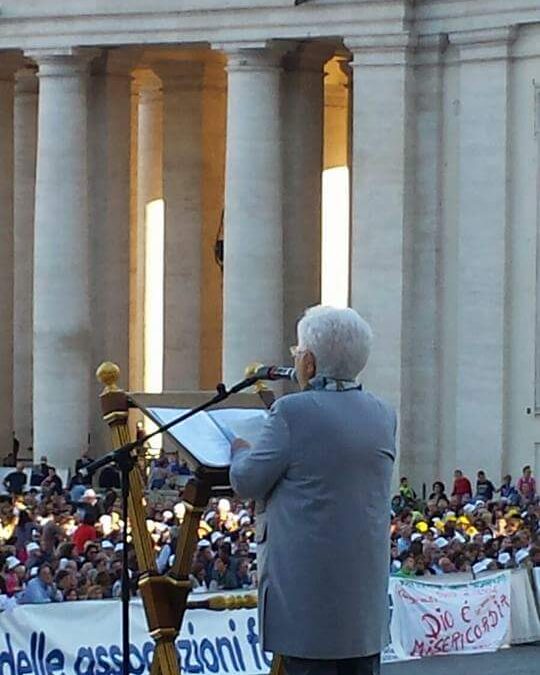
The voice of families in St Peter’s Square
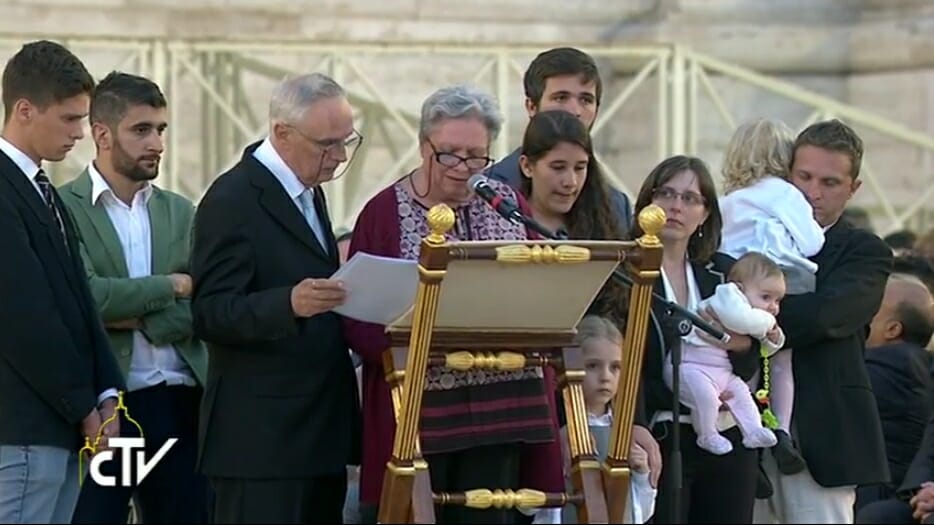 October 4 will open the much-awaited Synod on the family, following the extraordinary, preparatory one held last year. Also this time, the Pope wanted to prepare for the Synod with a prayer vigil “to pray that the Holy Spirit will enlighten the Synod Fathers in their challenging task.” So on the evening of 3 October everyone was there: married couples, children, engaged couples, grandfathers, mothers, aunts, cousins, religious, single people……. will come to gather around Pope Francis. Many of them will come from faraway places, but will all be protagonists precisely because from the start, each felt involved in the reflections prepared by the two synodal sessions. It had never occurred, in fact, that upon proclaiming a Synod, the pope would want a double, popular consultation almost as if to say that the walls of the synod assembly hall had to be widened to be able to listen to those who live family lives or those who even anonymously, make sure that the family avails of all the support rightly due to it, inasmuch as it is the legacy of creation.
October 4 will open the much-awaited Synod on the family, following the extraordinary, preparatory one held last year. Also this time, the Pope wanted to prepare for the Synod with a prayer vigil “to pray that the Holy Spirit will enlighten the Synod Fathers in their challenging task.” So on the evening of 3 October everyone was there: married couples, children, engaged couples, grandfathers, mothers, aunts, cousins, religious, single people……. will come to gather around Pope Francis. Many of them will come from faraway places, but will all be protagonists precisely because from the start, each felt involved in the reflections prepared by the two synodal sessions. It had never occurred, in fact, that upon proclaiming a Synod, the pope would want a double, popular consultation almost as if to say that the walls of the synod assembly hall had to be widened to be able to listen to those who live family lives or those who even anonymously, make sure that the family avails of all the support rightly due to it, inasmuch as it is the legacy of creation. 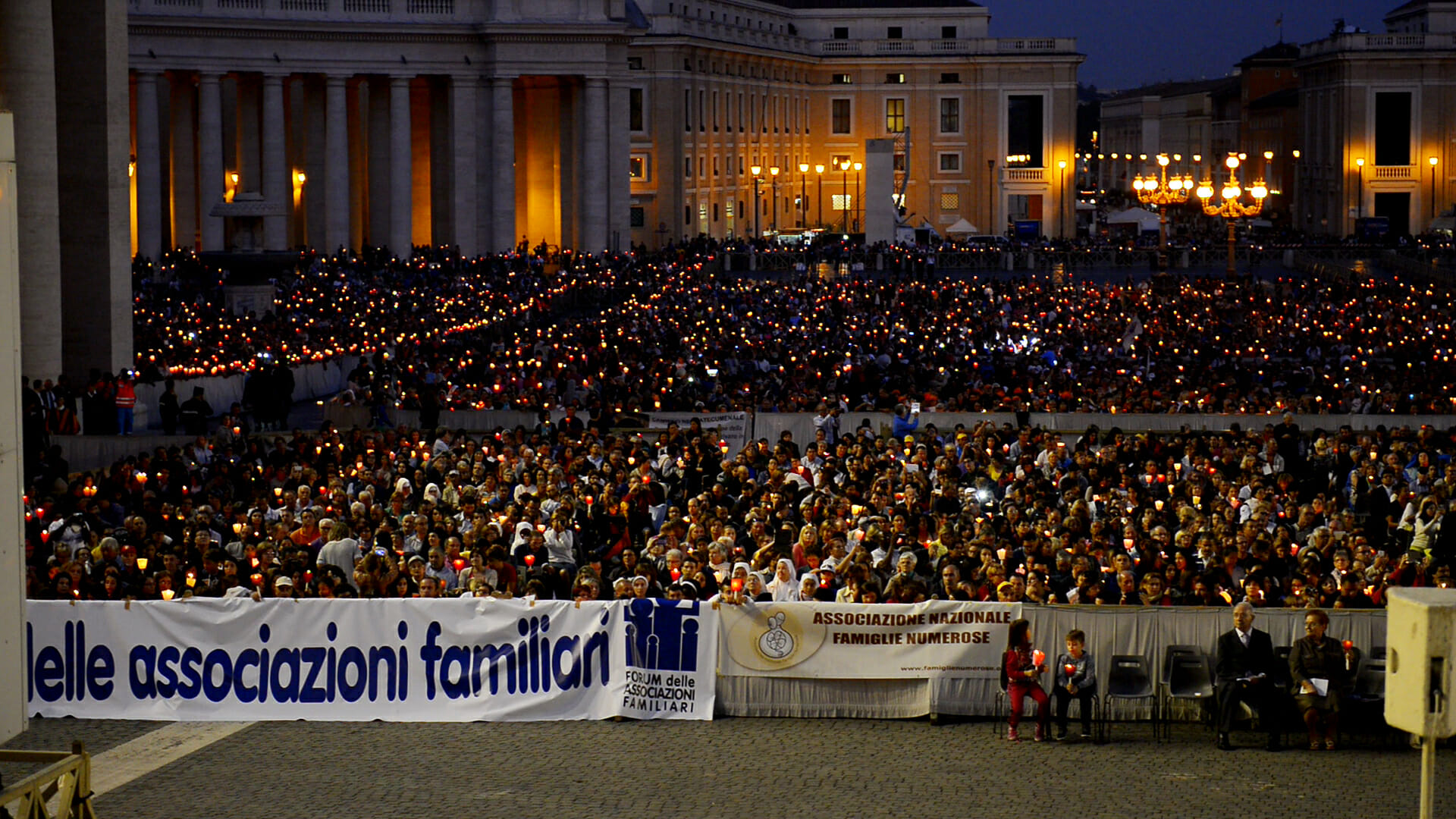 Each of the participants was holding a burning torch: many small fires that together will brighten the horizons of all the families, and of those which follow every day with renewed vigor, the trail of their original design, as of those immersed in darkness and no longer believe in love. Many torches will signify that the ‘till death do us part’ in Christ is possible, and that the grace of the sacrament of marriage heals every incapacity to love and gives spouses a splendid treasure: the presence of Jesus in their homes. The prayer vigil was also animated by songs – offered by various bands among which those of the Focolare – along with testimonies of families which are a different type of prayer, but likewise important and sacred. All these also highlight the beauty of the family, which often arises from a tiresome daily routine, imbued with gratuity, tenderness, and forgiveness which alone can give true joy. Testimonials to the sharing of life paths make all see that the family represents a gift to the world and a precious way of announcing the Gospel.
Each of the participants was holding a burning torch: many small fires that together will brighten the horizons of all the families, and of those which follow every day with renewed vigor, the trail of their original design, as of those immersed in darkness and no longer believe in love. Many torches will signify that the ‘till death do us part’ in Christ is possible, and that the grace of the sacrament of marriage heals every incapacity to love and gives spouses a splendid treasure: the presence of Jesus in their homes. The prayer vigil was also animated by songs – offered by various bands among which those of the Focolare – along with testimonies of families which are a different type of prayer, but likewise important and sacred. All these also highlight the beauty of the family, which often arises from a tiresome daily routine, imbued with gratuity, tenderness, and forgiveness which alone can give true joy. Testimonials to the sharing of life paths make all see that the family represents a gift to the world and a precious way of announcing the Gospel. 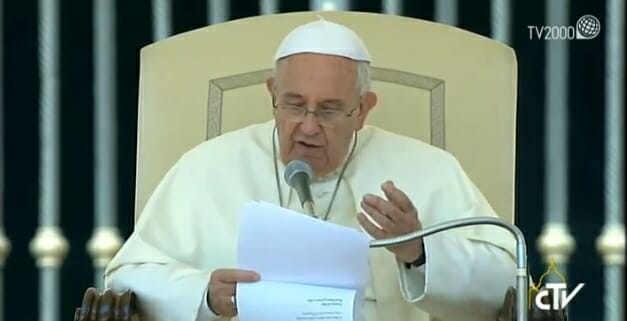 “May the Synod acknowledge, esteem, and proclaim all that is beautiful, good and holy about that experience,” the Holy Father prayed. “May it embrace situations of vulnerability and hardship: war, illness, grief, wounded relationships and brokenness, which create distress, resentment and separation.” The Pope continued, “Let us pray for a Synod which, more than speaking about the family, can learn from the family, readily acknowledging its dignity, its strength and its value, despite all its problems and difficulties.” He also expressed the desire that what is offered is “a Church which is a mother, ever capable of giving and nourishing life, accompanying it with devotion, tenderness, and moral strength. For unless we can unite compassion with justice, we will end up being needlessly severe and deeply unjust.”
“May the Synod acknowledge, esteem, and proclaim all that is beautiful, good and holy about that experience,” the Holy Father prayed. “May it embrace situations of vulnerability and hardship: war, illness, grief, wounded relationships and brokenness, which create distress, resentment and separation.” The Pope continued, “Let us pray for a Synod which, more than speaking about the family, can learn from the family, readily acknowledging its dignity, its strength and its value, despite all its problems and difficulties.” He also expressed the desire that what is offered is “a Church which is a mother, ever capable of giving and nourishing life, accompanying it with devotion, tenderness, and moral strength. For unless we can unite compassion with justice, we will end up being needlessly severe and deeply unjust.” 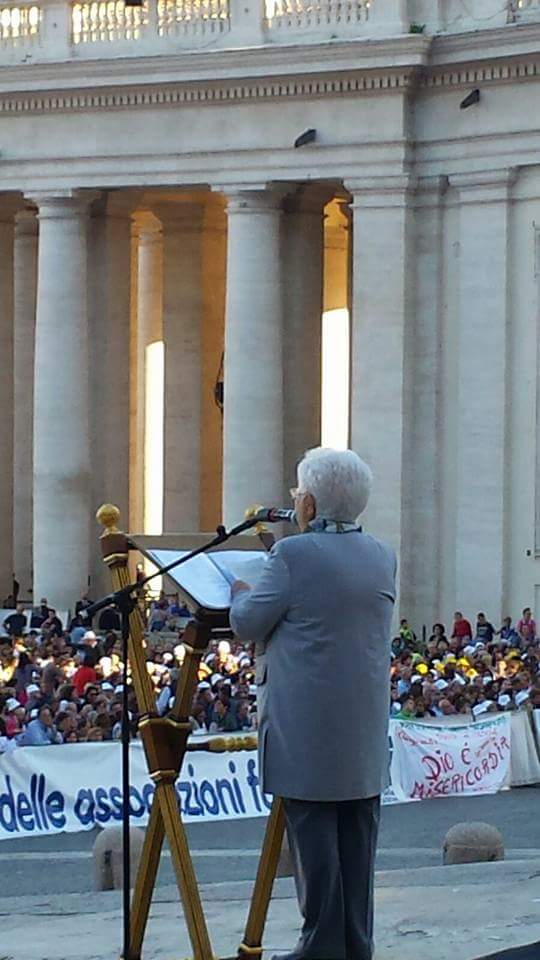 Maria Voce, who touched on the stories of those families who have decided to walk with the Resurrected Christ in their midst, affirmed that also they, like the disciples of Emmaus, “felt their hearts burn with the typical joy that the presence of Christ gives, experiencing the gifts of unity with God and among themselves, light, courage, missionary drive and furthermore”, the Focolare Presidente stated, “Jesus himself, will speak to the hearts of those they meet, and revive hope in them.” “The Pope,” continued Maria Voce, “spurs on the families to take the initiative in bringing this gift to the community. We want to accept this challenge, too, and do so in cooperation with our parishes and all the other movements and associations, especially in hosting the refugees who knock on the doors of our hearts. The Christian families have been entrusted with the task of human coexistence healed by mercy. They can show humanity the tenderness and force of God’s love and in this way, the Pope said, every day write a page of sacred history, not the one written only in books, but that which will remain forever in the heart of the Father.”
Maria Voce, who touched on the stories of those families who have decided to walk with the Resurrected Christ in their midst, affirmed that also they, like the disciples of Emmaus, “felt their hearts burn with the typical joy that the presence of Christ gives, experiencing the gifts of unity with God and among themselves, light, courage, missionary drive and furthermore”, the Focolare Presidente stated, “Jesus himself, will speak to the hearts of those they meet, and revive hope in them.” “The Pope,” continued Maria Voce, “spurs on the families to take the initiative in bringing this gift to the community. We want to accept this challenge, too, and do so in cooperation with our parishes and all the other movements and associations, especially in hosting the refugees who knock on the doors of our hearts. The Christian families have been entrusted with the task of human coexistence healed by mercy. They can show humanity the tenderness and force of God’s love and in this way, the Pope said, every day write a page of sacred history, not the one written only in books, but that which will remain forever in the heart of the Father.”
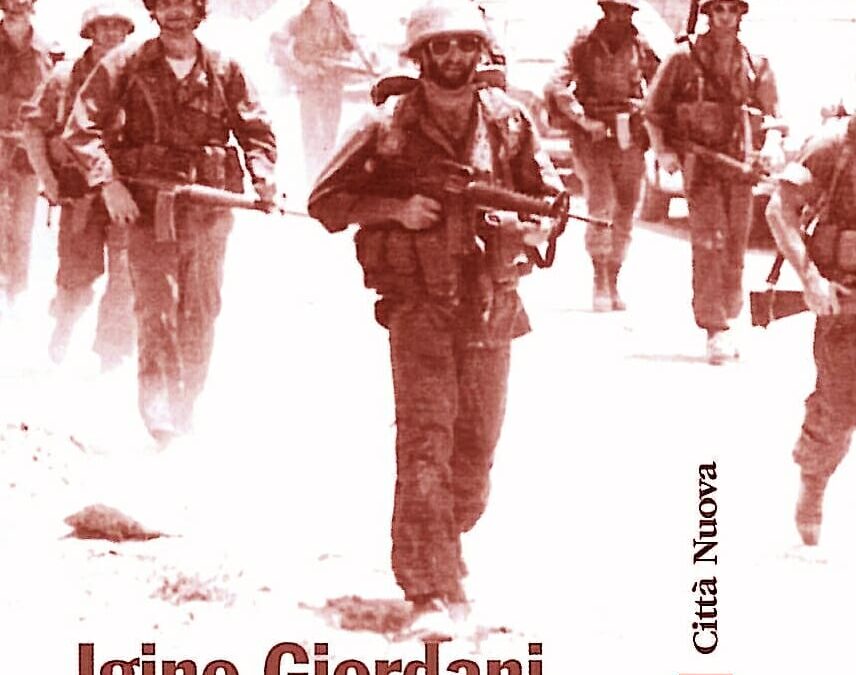
“If you want peace, prepare for peace.”
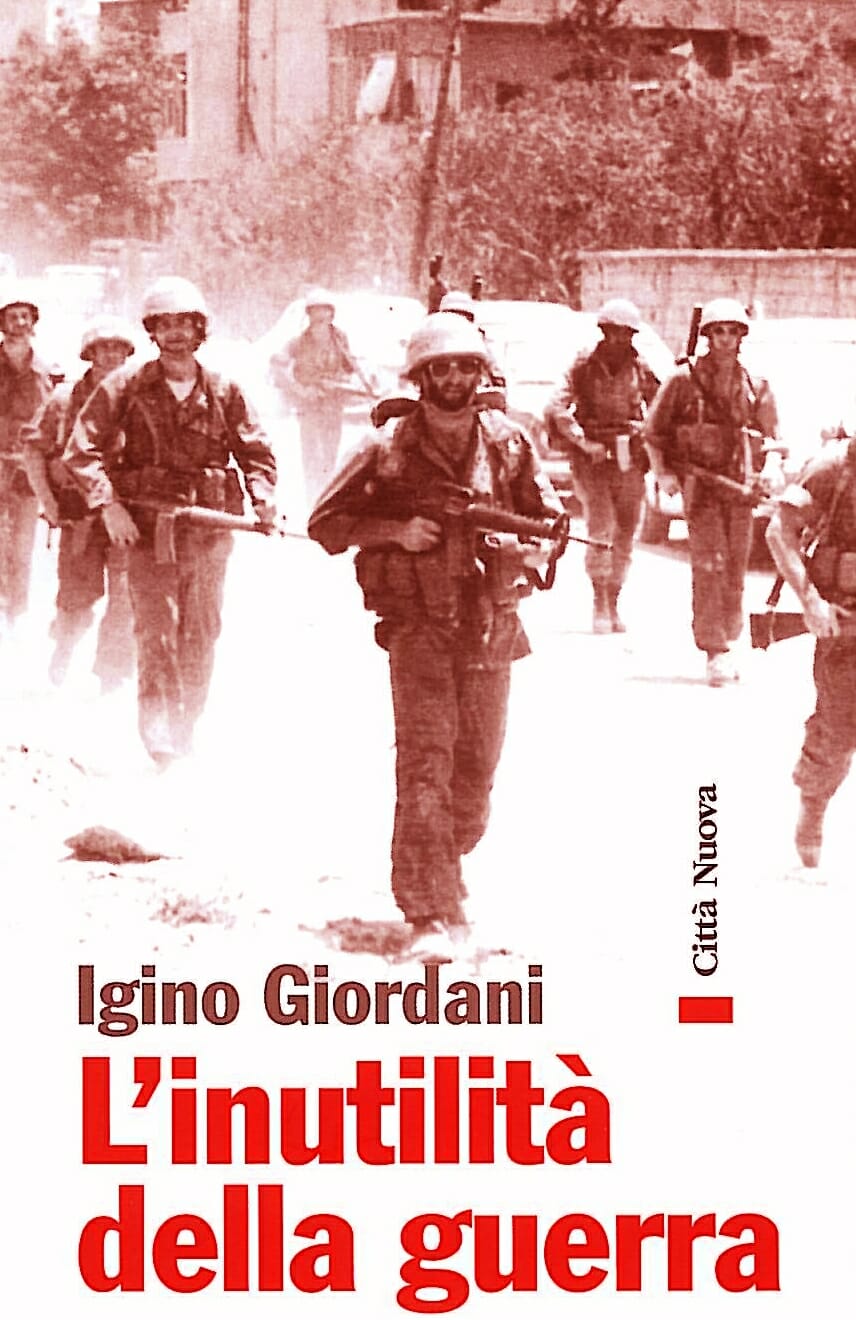 Peace is the result of fraternity amongst the peoples, solidarity with the weakest, mutual respect. This is how a more just world is built, this is how war is set aside war as a barbaric undertaking that belongs to a dark period of human history. Giordani knew war: he had taken part in the first world war. He received a medal after he had been seriously wounded on the Austrian front. But it is not only the horror of blood and death that should put aside war as a means of solving international problems. War can be seen as something quite natural to those impoverished minds that imagine humankind as a machine in thirst of power, ready to launch out against any enemy to satisfy its dreams of power. Yet, there is nothing natural about inflicitng suffering, misery and death. Wars never produce wins, only defeats. As history teaches, and Giordani reminds us: the great problems that all wars leave behind are far more distressing than the ones that meant to be resolved by engaging in conflict. This is why he suggest that we put aside our arms and military sentiments, and prepare a peaceful order. Moreover, for those who believe that human beings are God’s children any offence against a neighbour should be kept far from us. How can one love God by making attempts against the life of His children? A half century has gone by since Giordani wrote these texts, which are taken from L’inutilità della guerra (“The uselessness of War)”, but they could have been written for our own times that are threatened by such dangerous conflicts. “War is large scale murder dressed up as some sort of sacred cult, like the sacrifices of the firstborn to the god, Baal.The purpose of those sacrifices was to instill terror with their rhetoric and the interests that were behind them. Once humankind makes some spiritual progress, war will also be filed away along cruel pagan rituals, superstitions, wizadry and barbarity. War is to humanity what illness is to health, sin to the soul: it is slaughter and destruction, infection of body and soul, individual and collectivity.” “History confirms Christian reasoning, since the construction of weapons produces nothing but fear, mistrust and war. Those that say ‘If you want peace, prepare for war’ are false realists. You only need to open a book of history to see what the accumulation of arms and amunition leads to. Peace is difficult, but Christians are not naive: we want peace, not illusion. Peace is never going to just fall from Heaven all ready and nice. Peace is a patient process that we must carry out together. Peace is obtained with peace.” “Only the fearful defend war. War is made because of fear. The fearful resort to insult and shooting, because of an instinct to be free. It takes courage – rational courage – to reach lasting peace.” Alberto Lo Presti L’inutilità della guerra, Città Nuova ( 2003) p. 7; 71-72; 83.
Peace is the result of fraternity amongst the peoples, solidarity with the weakest, mutual respect. This is how a more just world is built, this is how war is set aside war as a barbaric undertaking that belongs to a dark period of human history. Giordani knew war: he had taken part in the first world war. He received a medal after he had been seriously wounded on the Austrian front. But it is not only the horror of blood and death that should put aside war as a means of solving international problems. War can be seen as something quite natural to those impoverished minds that imagine humankind as a machine in thirst of power, ready to launch out against any enemy to satisfy its dreams of power. Yet, there is nothing natural about inflicitng suffering, misery and death. Wars never produce wins, only defeats. As history teaches, and Giordani reminds us: the great problems that all wars leave behind are far more distressing than the ones that meant to be resolved by engaging in conflict. This is why he suggest that we put aside our arms and military sentiments, and prepare a peaceful order. Moreover, for those who believe that human beings are God’s children any offence against a neighbour should be kept far from us. How can one love God by making attempts against the life of His children? A half century has gone by since Giordani wrote these texts, which are taken from L’inutilità della guerra (“The uselessness of War)”, but they could have been written for our own times that are threatened by such dangerous conflicts. “War is large scale murder dressed up as some sort of sacred cult, like the sacrifices of the firstborn to the god, Baal.The purpose of those sacrifices was to instill terror with their rhetoric and the interests that were behind them. Once humankind makes some spiritual progress, war will also be filed away along cruel pagan rituals, superstitions, wizadry and barbarity. War is to humanity what illness is to health, sin to the soul: it is slaughter and destruction, infection of body and soul, individual and collectivity.” “History confirms Christian reasoning, since the construction of weapons produces nothing but fear, mistrust and war. Those that say ‘If you want peace, prepare for war’ are false realists. You only need to open a book of history to see what the accumulation of arms and amunition leads to. Peace is difficult, but Christians are not naive: we want peace, not illusion. Peace is never going to just fall from Heaven all ready and nice. Peace is a patient process that we must carry out together. Peace is obtained with peace.” “Only the fearful defend war. War is made because of fear. The fearful resort to insult and shooting, because of an instinct to be free. It takes courage – rational courage – to reach lasting peace.” Alberto Lo Presti L’inutilità della guerra, Città Nuova ( 2003) p. 7; 71-72; 83.
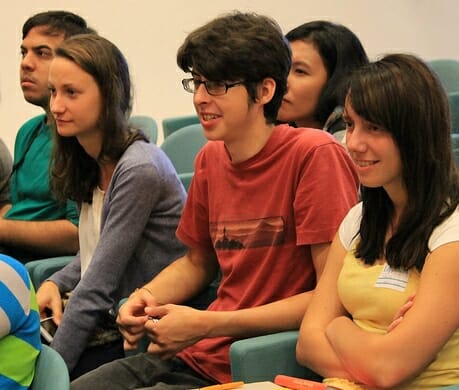
LoppianoLab 2015: allowing the African youth to have their dreams
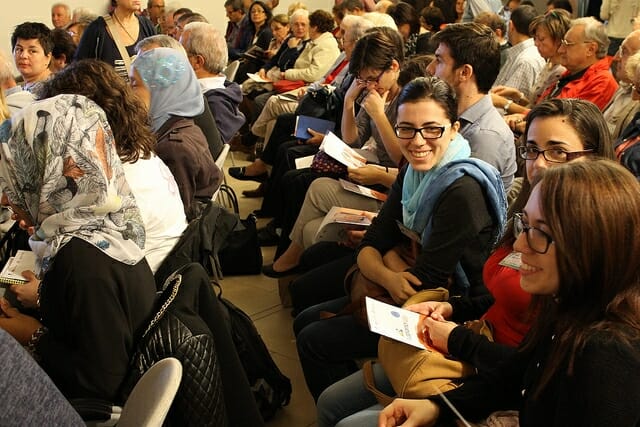 “Hosting the extraordinary in the ordinary things, training one’s perception to see the growth of the tree: without prophets, life would be a place of pessimism and not of hope which unites us.” In brief, this was what the economist, Luigino Bruni, said at the National Congress of the EoC networks during the 6th edition of LoppianoLab, attended by more than 2,000 participants from all over the country, and also others. Economy of Conmunion as a model to start with. “Only by regenerating relationships can we overcome fear and relaunch the economy: today, while mistrust and pessimism are holding back the relaunching of the economy in Europe and the Western world, we dare to look at the economy with the eyes of the African youth. – Bruni began – If we want to contribute to the rebirth of the economy, we have to regenerate the territories, families, relationships and rediscover and practice the civic virtues”. Not by chance, the title chosen was “Beyond fear. The culture of dialogue, active citizenship, civic economy,” for the 2015 edition of LoppianoLab, promoted by the Città Nuova Publishers, the Polo Lionello Bonfanti-Economy of Communion (EoC), Sophia University Institute (SUI) and the Loppiano International Centre (FI). Obviously there was a pressing call to the economic sector that involves about 200 businesses in Italy and 800 throughout the world, to adhere to and focus on man and his relational dimension in all their economic dealings, by practicing an Economy of Communion.
“Hosting the extraordinary in the ordinary things, training one’s perception to see the growth of the tree: without prophets, life would be a place of pessimism and not of hope which unites us.” In brief, this was what the economist, Luigino Bruni, said at the National Congress of the EoC networks during the 6th edition of LoppianoLab, attended by more than 2,000 participants from all over the country, and also others. Economy of Conmunion as a model to start with. “Only by regenerating relationships can we overcome fear and relaunch the economy: today, while mistrust and pessimism are holding back the relaunching of the economy in Europe and the Western world, we dare to look at the economy with the eyes of the African youth. – Bruni began – If we want to contribute to the rebirth of the economy, we have to regenerate the territories, families, relationships and rediscover and practice the civic virtues”. Not by chance, the title chosen was “Beyond fear. The culture of dialogue, active citizenship, civic economy,” for the 2015 edition of LoppianoLab, promoted by the Città Nuova Publishers, the Polo Lionello Bonfanti-Economy of Communion (EoC), Sophia University Institute (SUI) and the Loppiano International Centre (FI). Obviously there was a pressing call to the economic sector that involves about 200 businesses in Italy and 800 throughout the world, to adhere to and focus on man and his relational dimension in all their economic dealings, by practicing an Economy of Communion.  Dreaming of Africa. The workshop often referred to the EoC’s international congress held last May in Nairobi, the vitality of which was discussed by Geneviéve Sanze, an economist from Central Africa. In her continent, as of today, there are about 30 businesses that have joined the project which gave life to a network of support for the youth by the EoC entrepreneurs. People at times think that “Economy is a science of wealth: and believe that you have to go to the big cities to practice it, but with EoC, it has become the science of communion – she affirmed. Exchange of ideas, dialogue, and fraternity: in Nairobi we saw that every person brings a certain wealth within him that is all-inclusiveness and uniqueness, in the same way as the creative entrepreneur tries to enrich his ambience and his territory without catering to standards that are remote and far from the attention of the outskirts in need. And a totally new way of facing the topic of economy at international levels is to start from Africa, but even more so when considering the contribution Africa can give, rather than receive, thus giving trust and new drive to the Africans themselves, to empower their opportunities in their own countries.” Africa is a young continent, as testified to by Gloria and Melchiot, two African students enrolled in the Sophia University Institute in Loppiano: “Allowing the African youth to have their dreams signifies avoiding the phenomenon of immigration: so why don’t we open businesses in Africa, so that they can find jobs there?” Anouk Grevin, Economist (University of Nantes and Sophia University Institute), announced that “Two business projects have started up in Nairobi. The Catholic University Institute of Buea (CUIB) in Cameroon has announced the institution of a Degree in the Economy of Communion, and the start in 2017 of the project incubator, “Siobhan,” to support the birth of new businesses in Africa. The second project dedicated to François Neveux, French pioneer of the EoC, will bring together entrepreneurs from all over the world, and create a network of economic support and project design, addressing especially young entrepreneurs.” Source: Città Nuova
Dreaming of Africa. The workshop often referred to the EoC’s international congress held last May in Nairobi, the vitality of which was discussed by Geneviéve Sanze, an economist from Central Africa. In her continent, as of today, there are about 30 businesses that have joined the project which gave life to a network of support for the youth by the EoC entrepreneurs. People at times think that “Economy is a science of wealth: and believe that you have to go to the big cities to practice it, but with EoC, it has become the science of communion – she affirmed. Exchange of ideas, dialogue, and fraternity: in Nairobi we saw that every person brings a certain wealth within him that is all-inclusiveness and uniqueness, in the same way as the creative entrepreneur tries to enrich his ambience and his territory without catering to standards that are remote and far from the attention of the outskirts in need. And a totally new way of facing the topic of economy at international levels is to start from Africa, but even more so when considering the contribution Africa can give, rather than receive, thus giving trust and new drive to the Africans themselves, to empower their opportunities in their own countries.” Africa is a young continent, as testified to by Gloria and Melchiot, two African students enrolled in the Sophia University Institute in Loppiano: “Allowing the African youth to have their dreams signifies avoiding the phenomenon of immigration: so why don’t we open businesses in Africa, so that they can find jobs there?” Anouk Grevin, Economist (University of Nantes and Sophia University Institute), announced that “Two business projects have started up in Nairobi. The Catholic University Institute of Buea (CUIB) in Cameroon has announced the institution of a Degree in the Economy of Communion, and the start in 2017 of the project incubator, “Siobhan,” to support the birth of new businesses in Africa. The second project dedicated to François Neveux, French pioneer of the EoC, will bring together entrepreneurs from all over the world, and create a network of economic support and project design, addressing especially young entrepreneurs.” Source: Città Nuova
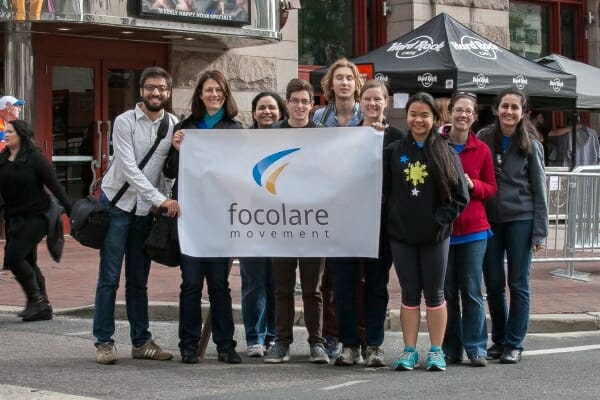
The Pope in Philadelphia, USA
The Pope concluded his visit in the city of Philadelphia where the Declaration of Independence and the Consitution of the United States had been written. It was a historic visit that had a deep effect the people of the United States. At Independence Hall, a central landmark,with his usual smile Pope Francis clarified that he is niether right nor left. He highlighted the importance of religious liberty and dialogue in an increasingly multicultural society, emphasising what is positive in the people of the United States: “We remember the great struggles that led to the abolition of slavery, the extension of the vote, the growth of the workers movement and the progressive efforts to eliminate every form of racism and prejudice directed towards successive waves of new Americans,” the Pope said. He extended special greetings to Hispanic immigrants from a Pope who was the son of an immigrant family: “You bring with you many talents to your new land. Never be ashamed of your traditions,” he told an applauding crowd. He mentioned the fervid faith and family deep family values of the Hispanic population: “As you make your contribution, you will not only establish yourselves here, but you will help to renew society from within.” Jennifer Huertas from Puerto Rico, who has been living in the United States for two years: “The Pope asks us not to forget our roots, and to recognise the uniqueness of every individual. Yes, diversity isn’t something bad, because every human being is unique.” A few hours later, he attended the conclusion of the World Meeting of Families with young and older families, singles, men and women Religious and priests who had prepared the city with particular care. After listening to six testimonies from couples and families who recounted how they tried to overcome their struggles through faith in God, the Pope delivered a very animated homily, highlighting the importance of family life. A boy had asked him what God was doing before He created the world: “God loved, because God is Love,” the Pope answered. His words enchanted the half million people who had waited for hours along Benjamin Franklin Parkway. “It was fantastic to see the Pope,” says Thea from Los Angeles. “I especially liked when he pointed out that God had not placed Jesus in the midst of a Kingdom, but in a family. Nowadays, very few people visit their parents, many of my friends live like that and it’s painful. It’s not always easy in my own family either, it is often hard to listen deeply to one another, but the Pope’s words will help me to face this difficulty.” On the following day, the crowds continued to wait patiently to hear the Pope, singing and dancing as they waited in long lines at security checkpoints. Never loosing their cool, they smiled and thanked the police officers for their work. “My son turned 2 today, but my wife and I thought that this was a once in a lifetime opportunity that couldn’t be missed,” one security officer said. Around a million people attended the Mass and, another million watched it on television. Francis greeted everyone and blessed children before the Mass began with Scripture readings in Spanish and Vietnamese. The liturgical readings of that Sunday contained strong words, where Moses and Jesus both affirmed that even people who do not belong to their group could perform miracles in the Lord’s name. “We must not be scandalised by the freedom of God,” the Pope told the crowd. Then he invited families to perform small gestures of love and compassion: a warm meal after a long workday, a warm embrace: “Love is shown in the small things,” he said. This means being “prophets,” overcoming the “scandal of a love that is restricted and petty” and he sent a clear message to the Church that must accept diveristy and trust the action of the Holy Spirit. He also had other significant encounters: with prisoners, and the survivors of sexual abuse by the clergy; regarding which the Pope said “God weeps.” It is like a Black Mass, “there are no excuses.” His six-day visit was a breath of fresh air, not only for the American Catholic Church, but for the whole country. The Pope highlighted the cultural values of the land beginning from the country’s founding, and he invited Americans to be faithful to those values: love, family, the dignity of every human being, caring for the poor. While leaving the United States, he sent a message on Twitter: “With my gratitude, may Christ’s love continue to guide the American people! #GodBlessAmerica.” Susanne Janssen and Sarah Mundell – Living City Magazine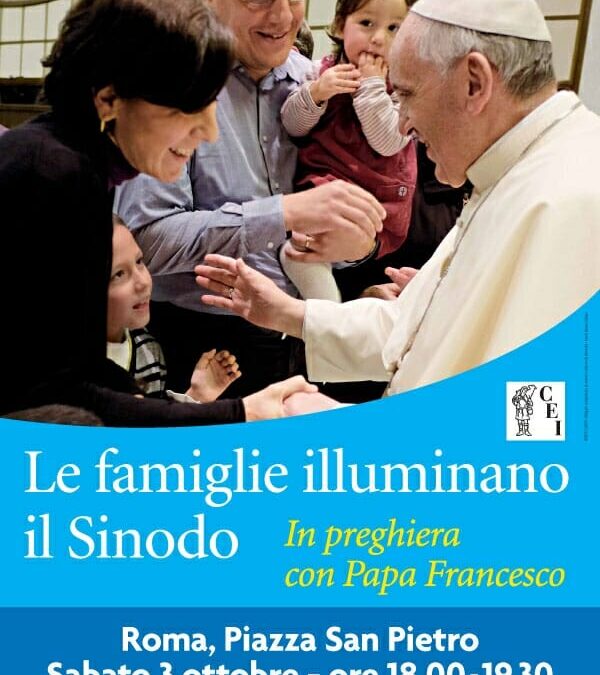
Prayer Vigil: Families Light Up the Synod
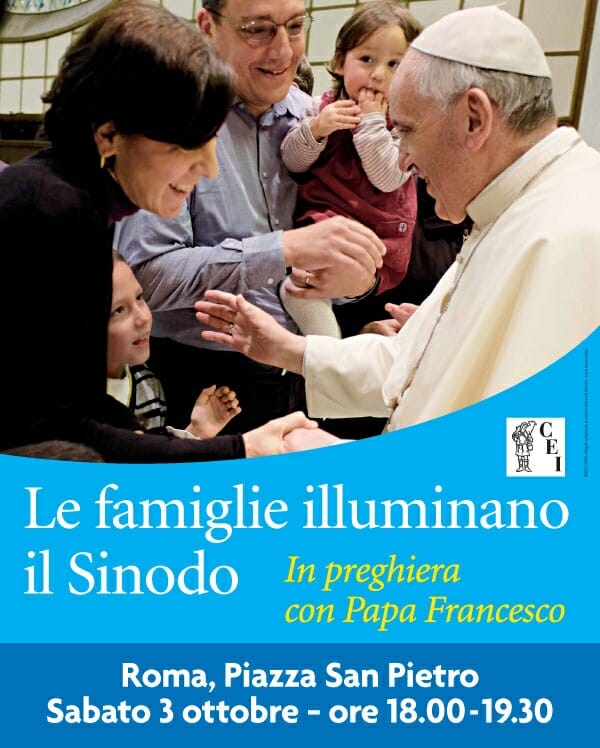
From 5:00 p.m. to 6:00p.m., testimonies by the ecclesial movements, among whom Maria Voce of the Focolare Movement.
This initiative is a people’s response to the Holy Father’s multiple appeals for prayer for the family and for the work of the Synod Fathers. Among the testimonies expected, from 5:00 p.m. to 6:00 p.m., will be those of the representatives of ecclesial movements, among whom Maria Voce, president of the Focolare Movement, Kiko Argüello, initiator of the Neocatechumenal Way, Julián Carrón, president of Communion and Liberation, Salvatore Martinez, president of the Renewal in the Holy Spirit Movement, and Matteo Truffelli, president of the Italian Catholic Action.
#SignUpForPeace
https://www.change.org/p/sign-up-for-a-global-petition-for-peace-now Confronted with the humanitarian drama of the refugees, the Focolare’s Youth for Unity step into action on many fronts, mobilising and appealing to international organisations, while joining in the efforts of the entire Movement.
- Reduce public funding of weapons
- Work at the root level of inequality, to counter misery
- Revise current models of governance
- Adopt a model of organised legality in opposition to criminality
- Guarantee universal primary education
These are the five main points of the appeal made by the young people of the Focolare’s Youth for a United World (YUW) to national parliaments, the European Parliament, the National Commissions of UNESCO and the United Nations. https://www.youtube.com/watch?v=om7WN06PMiU

Rome – Prayer Vigil: Families Light Up the Synod

From 5:00 p.m. to 6:00p.m., testimonies by the ecclesial movements, among whom Maria Voce of the Focolare Movement.
This initiative is a people’s response to the Holy Father’s multiple appeals for prayer for the family and for the work of the Synod Fathers. Among the testimonies expected, from 5:00 p.m. to 6:00 p.m., will be those of the representatives of ecclesial movements, among whom Maria Voce, president of the Focolare Movement, Kiko Argüello, initiator of the Neocatechumenal Way, Julián Carrón, president of Communion and Liberation, Salvatore Martinez, president of the Renewal in the Holy Spirit Movement, and Matteo Truffelli, president of the Italian Catholic Action.
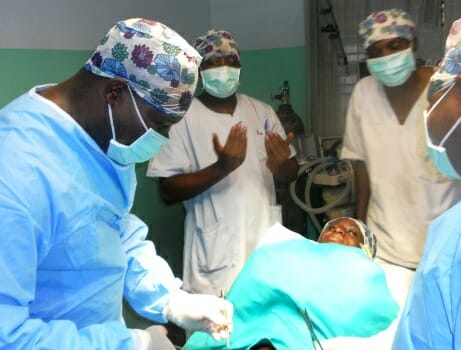
In the Kinshasa Clinic
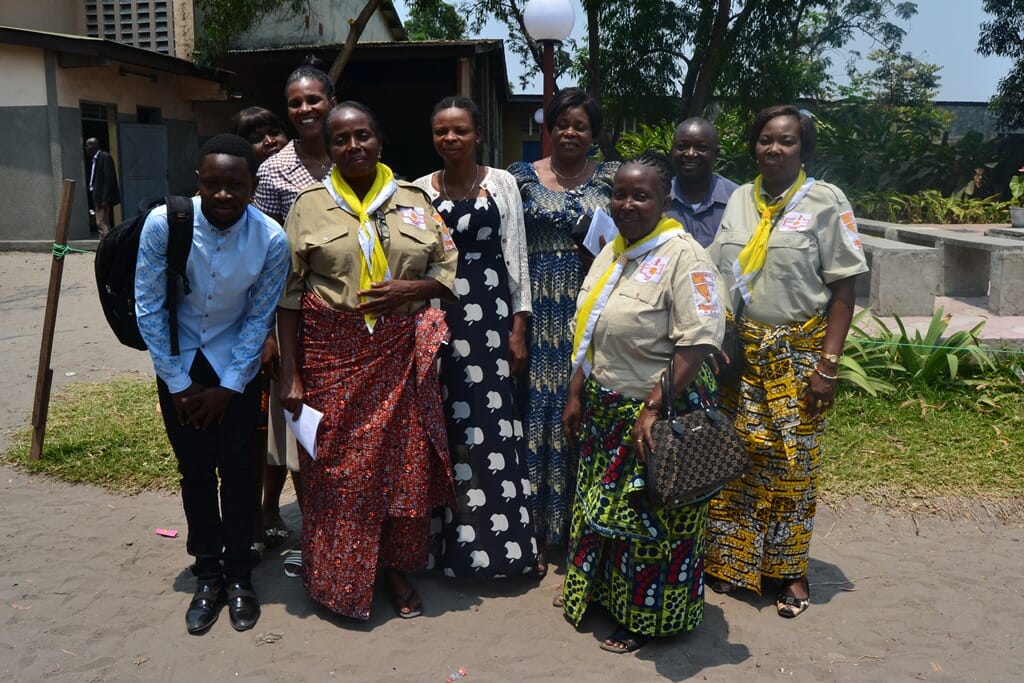 “One day we were closing, when at 4:30 p.m. a mother with a baby about 8 months old arrived for a blood sample withdrawal.” Aline M. is a nurse and a biologist in the university clinic of Kinshasa. In the Congo/DRC, the birth rate is very high, as is the mortality rate and the infant mortality rate. Life expectancy at birth and the average age of the population are both very low. “My colleagues had already closed the registration books and wanted to leave. But the words of the Gospel, which say to love one’s neighbour as oneself, came to my mind: ‘I have to welcome even this mother,’ I thought. I took a blood sample from the little one, and as I was finishing, the mother said to me with a firm voice, ‘God bless you, ma’am!”
“One day we were closing, when at 4:30 p.m. a mother with a baby about 8 months old arrived for a blood sample withdrawal.” Aline M. is a nurse and a biologist in the university clinic of Kinshasa. In the Congo/DRC, the birth rate is very high, as is the mortality rate and the infant mortality rate. Life expectancy at birth and the average age of the population are both very low. “My colleagues had already closed the registration books and wanted to leave. But the words of the Gospel, which say to love one’s neighbour as oneself, came to my mind: ‘I have to welcome even this mother,’ I thought. I took a blood sample from the little one, and as I was finishing, the mother said to me with a firm voice, ‘God bless you, ma’am!” 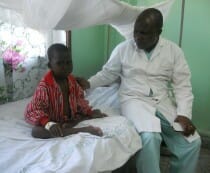 I was just able to convince a colleague from the blood blank to take this last emergency, when another serious problem presented itself. It was already 5:00 p.m. There was a mother in tears, who could not pay for health insurance, with 4-year-old child in her arms, afflicted by severe anemia. My colleague decidedly told me that it was no longer possible to accept anyone. ‘Otherwise I’ll lose my job,’ she exclaimed. I was moved by this suffering. I took a sheet of paper and attested in writing that I was responsible for the cost of the blood transfusion for this child. My colleague then accepted, and immediately gave the child the transfusion, saving his life. The child’s mother said to me: ‘God will return you the money. I am sure of it!’
I was just able to convince a colleague from the blood blank to take this last emergency, when another serious problem presented itself. It was already 5:00 p.m. There was a mother in tears, who could not pay for health insurance, with 4-year-old child in her arms, afflicted by severe anemia. My colleague decidedly told me that it was no longer possible to accept anyone. ‘Otherwise I’ll lose my job,’ she exclaimed. I was moved by this suffering. I took a sheet of paper and attested in writing that I was responsible for the cost of the blood transfusion for this child. My colleague then accepted, and immediately gave the child the transfusion, saving his life. The child’s mother said to me: ‘God will return you the money. I am sure of it!’  Returning home, I asked myself: ‘Why is it that I met two mothers with such suffering children right at closing time?’ I read the Word of Life, a sentence from the Gospel, and I found comfort. The next week, I received an invitation from my health service. From among my colleagues I was chosen for a 3-day professional training course. The financial contribution given to me for my participation was $150 US dollars! There was God’s answer. For having paid $25 US dollars for the blood transfusion, I received two blessings plus this amount which now allows me to also pay the scholastic fees for my children.” A.M. – Kinshasa, Congo/DRC
Returning home, I asked myself: ‘Why is it that I met two mothers with such suffering children right at closing time?’ I read the Word of Life, a sentence from the Gospel, and I found comfort. The next week, I received an invitation from my health service. From among my colleagues I was chosen for a 3-day professional training course. The financial contribution given to me for my participation was $150 US dollars! There was God’s answer. For having paid $25 US dollars for the blood transfusion, I received two blessings plus this amount which now allows me to also pay the scholastic fees for my children.” A.M. – Kinshasa, Congo/DRC
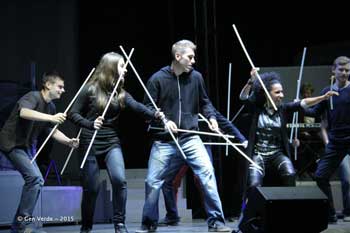
Gen Verde in Hungary, On the Other Side
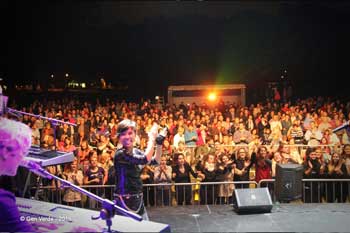 “Start Now!” That is, start here and now, to build authentic relationships and to generate trust. It is an invitation worth its weight in gold, you might say, and it was the title Gen Verde chose for the concert/workshop brought to the stage of the Tágas Tér Festival, on September 25th in Szeged, Hungary. The protagonists in these eight workshops, along with the artists, were 120 teens from two high schools, one of which is a professional institute frequented by many students who have difficult family situations. “Tágas Tér, which literally means, ‘open space,’” explains one of the organizers, “is in fact a big ecumenical meeting which exposes the network of hundreds of activities in the world for civic solidarity. Szeged is 15 km from the Hungarian border with Serbia, and therefore, many people were present at the concert who experience the passage of thousands of immigrants daily, with the sea of questions and sorrow that comes along with it.
“Start Now!” That is, start here and now, to build authentic relationships and to generate trust. It is an invitation worth its weight in gold, you might say, and it was the title Gen Verde chose for the concert/workshop brought to the stage of the Tágas Tér Festival, on September 25th in Szeged, Hungary. The protagonists in these eight workshops, along with the artists, were 120 teens from two high schools, one of which is a professional institute frequented by many students who have difficult family situations. “Tágas Tér, which literally means, ‘open space,’” explains one of the organizers, “is in fact a big ecumenical meeting which exposes the network of hundreds of activities in the world for civic solidarity. Szeged is 15 km from the Hungarian border with Serbia, and therefore, many people were present at the concert who experience the passage of thousands of immigrants daily, with the sea of questions and sorrow that comes along with it. 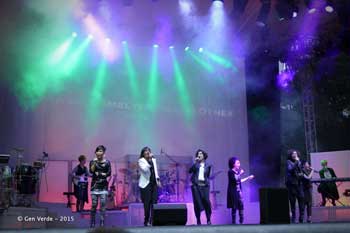 “On the Other Side”: During the concert, many songs were heard from “On the Other Side,” the latest album by Gen Verde, released less than a month ago. But what is “the other side”? is a spontaneous question many ask themselves. “It’s the person I have in front of me, the person who thinks differently than I; the person I don’t admire or even like,” explains Adriana Garcia, the group’s bass player from Mexico. A powerful show, engaging and at the same time capable of questioning positions, opinions and lifestyles as someone has said. Because what emerges from the music and the lyrics is the certainty that the solution to a broken world, divided by walls, comes from understanding the richness inherent in diversity. Among the eleven songs on the album there is the story of the difficult progress of an entire people in the piece “Voz de la Verdad,” about the Salvadorian bishop, Oscar Romero, or the very current and relevant song about the division of the two Koreas, built on K-pop melodies, almost as if to say that even among young Koreans the wound has not yet healed. “They are stories that do not permit us to fall into indifference,” comments one girl, “or to forget our brothers and sisters from whom we are separated by a border. We have felt strongly called even to give our lives for justice.” “Needless to say, the most powerful moment of the concert was the song “Chi piange per te,” (“Who cries for you”) a sweet lullaby dedicated to a baby girl entombed in the waters of the Sicilian Canal, perhaps because of the situation our country is living now with the immigration issue,” confided a friend who works with the media. And a Pastor of the Reformed Church, Gábor Czagány, one of the organizers of the Festival, stated: “What struck me the most were the faces of the young people from the schools that took part in the workshops. There was joy, participation, commitment. You could intuit the weight of the experience they had had: seven days that left their mark. Now it’s up to us to keep all this from getting lost or going to waste.”
“On the Other Side”: During the concert, many songs were heard from “On the Other Side,” the latest album by Gen Verde, released less than a month ago. But what is “the other side”? is a spontaneous question many ask themselves. “It’s the person I have in front of me, the person who thinks differently than I; the person I don’t admire or even like,” explains Adriana Garcia, the group’s bass player from Mexico. A powerful show, engaging and at the same time capable of questioning positions, opinions and lifestyles as someone has said. Because what emerges from the music and the lyrics is the certainty that the solution to a broken world, divided by walls, comes from understanding the richness inherent in diversity. Among the eleven songs on the album there is the story of the difficult progress of an entire people in the piece “Voz de la Verdad,” about the Salvadorian bishop, Oscar Romero, or the very current and relevant song about the division of the two Koreas, built on K-pop melodies, almost as if to say that even among young Koreans the wound has not yet healed. “They are stories that do not permit us to fall into indifference,” comments one girl, “or to forget our brothers and sisters from whom we are separated by a border. We have felt strongly called even to give our lives for justice.” “Needless to say, the most powerful moment of the concert was the song “Chi piange per te,” (“Who cries for you”) a sweet lullaby dedicated to a baby girl entombed in the waters of the Sicilian Canal, perhaps because of the situation our country is living now with the immigration issue,” confided a friend who works with the media. And a Pastor of the Reformed Church, Gábor Czagány, one of the organizers of the Festival, stated: “What struck me the most were the faces of the young people from the schools that took part in the workshops. There was joy, participation, commitment. You could intuit the weight of the experience they had had: seven days that left their mark. Now it’s up to us to keep all this from getting lost or going to waste.”  Young people offer hope for unity—Alessandra Pasquale, actress and singer in Gen Verde, is eager to clarify: “Our job is not to go on stage, sing, show off and then depart: we cannot exclude the building of authentic relationships with people, or exclude feeling what the people who come to our concerts experience, in what waters the teens with whom we do the workshops navigate.” It is for this reason that the video-interviews of the young participants of the workshops are projected before the beginning of the concert at Szeged, and were an integral part of the show, because these young people had in fact helped build it. Here are a few words from the teens: “The project, ‘Start Now!’ opened my eyes: it taught me not to judge foreigners. And this takes work: it takes tenacity and trust.” “I learned how we should pay attention to one another.” “I understood the importance of keeping a community together and that to be a family, humanity needs the collaboration of each one of us.” “I am very happy that my school participated in the project, “Start Now!” with the other school. In the beginning we didn’t know each other; it took time, but then we earned each other’s trust and now I can say that we move as a single person, we are absolutely happy.”
Young people offer hope for unity—Alessandra Pasquale, actress and singer in Gen Verde, is eager to clarify: “Our job is not to go on stage, sing, show off and then depart: we cannot exclude the building of authentic relationships with people, or exclude feeling what the people who come to our concerts experience, in what waters the teens with whom we do the workshops navigate.” It is for this reason that the video-interviews of the young participants of the workshops are projected before the beginning of the concert at Szeged, and were an integral part of the show, because these young people had in fact helped build it. Here are a few words from the teens: “The project, ‘Start Now!’ opened my eyes: it taught me not to judge foreigners. And this takes work: it takes tenacity and trust.” “I learned how we should pay attention to one another.” “I understood the importance of keeping a community together and that to be a family, humanity needs the collaboration of each one of us.” “I am very happy that my school participated in the project, “Start Now!” with the other school. In the beginning we didn’t know each other; it took time, but then we earned each other’s trust and now I can say that we move as a single person, we are absolutely happy.”
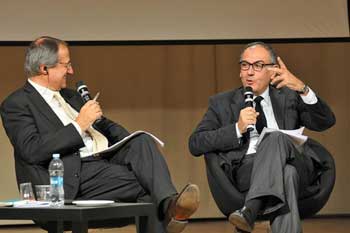
Italy. LoppianoLab 2015 begins with involvement
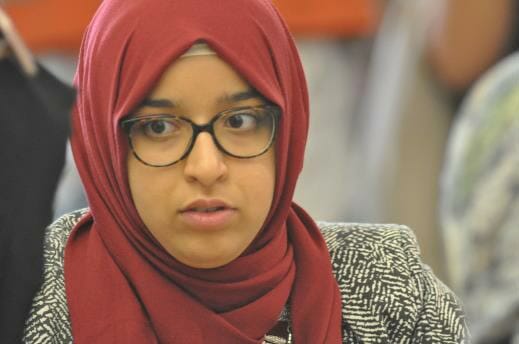 Ideas such as involvement as the method; the ability to dialogue respecting not only the differing ideas and convictions of others, but also their sufferings; biodiversity that values cultural riches; seeking greater justice; transforming indignation into collective action for changing the world – these were the main values behind the ten projects and initiatives that brought out the vitality of Italian society today. It concluded with a variety of voices, projects and events that started from the bottom of Italian society, including the sixth edition of LoppianoLab. More than 2,000 attendees emphasised the importance of sharing and dialogue amongst business leaders, politicians, educators, citizens, young people, communicators and local administrators – civil society in its diversity of expressions.
Ideas such as involvement as the method; the ability to dialogue respecting not only the differing ideas and convictions of others, but also their sufferings; biodiversity that values cultural riches; seeking greater justice; transforming indignation into collective action for changing the world – these were the main values behind the ten projects and initiatives that brought out the vitality of Italian society today. It concluded with a variety of voices, projects and events that started from the bottom of Italian society, including the sixth edition of LoppianoLab. More than 2,000 attendees emphasised the importance of sharing and dialogue amongst business leaders, politicians, educators, citizens, young people, communicators and local administrators – civil society in its diversity of expressions.
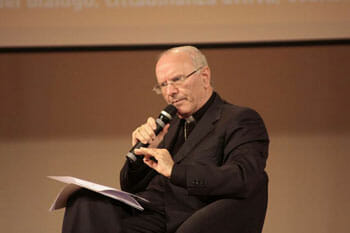
Msgr. Nunzio Galantino, Secretary General of the Italian Bishops Conference
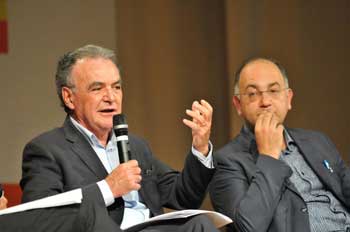
Luigi Bobba, Under Secretary of the Ministry of Social Politics and Work – Luigino Bruni, Economist

The Mighty Seeds of Generosity
 “Real kindness is an exchange with essentially unpredictable consequences. It is a risk precisely because it mingles our needs and desires with the needs and desires of others...” A. Phillips e B. Taylor, On Kindness “Businesses and organizations are good places for a good and fulfilling life if and until they let non-economic virtues live alongside with the economic-business ones. It is a decisive co-existence that is not easy at all, because it requires managers to give up total control over the behaviour of people, to accept an element of unpredictability in their actions and to be willing to relativize efficiency, which is becoming the real dogma of the new religion of our time. Generosity is one of these non-economic virtues that, however, are also essential to every business and institution. The root of generosity lies in the Latin word genus, generis, a term that refers to race, family, birth – this is also the first meaning of the word gender. This ancient etymology – that is lost now – tells us important things about generosity. First of all it reminds us that our generosity has much to do with the transmission of life: with our family, with the people around us, with the environment in which we grow up and where we learn how to live. We receive it as an inheritance when we come into the world. It is a gift that our parents and relatives pass on to us. Generosity is formed inside the family home. The generosity we find in ourselves is very dependent on that of our parents, how and how much love there had been amongst them before we were born, the life choices they made and the ones they make when we start looking at them. It all depends on their faithfulness, their hospitality, their attitude to the poor, their willingness to “waste” time to listen to and help their friends, the love and respect they show towards their parents. This primary generosity is not a personal virtue, but a gift that becomes part of the moral and spiritual standard of what is called character. It is a capital with which we come to the world, which was formed before our birth and is nourished by the quality of relationships in the earliest years of our life. It also depends on the generosity of our grandparents, great-grandparents, neighbours, and that of many others who may not be contributing to our DNA but are still present, in mysterious but very real ways, in our own generosity (and non-generosity). My generosity is influenced by the poets who have nourished the heart of our family. By the prayers of my people, the musicians I love and listen to, by the storytellers in village festivals, by the speeches and actions of politicians, by the sermons of preachers. By the martyrs of resistance, who gave their life yesterday for my freedom today. By the generosity of countless women of the past centuries (there is a great affinity between women and generosity), that many times placed the flourishing of the family they gave birth to before their own – and still continue to do so. Generosity generates gratitude towards those who have made us generous by their own generosity. Living with generous people makes us more generous – and the same is true for prayer, music, beauty…. The cultivation of generosity produces many more effects than the ones we can see and measure – and the same goes for our non-generosity and that of others. The stock of generosity of a family, a community or a people is something like the sum total of the generosity of each and every member of it. Every generation increases or reduces the value of this stock, and the latter is happening today in Europe where our generation, impoverished in ideals and great passions, is squandering the wealth of generosity it has inherited. A state that leaves half of its young people without work is not a generous state”. (Read more) by Luigino Bruni published in Avvenire ( (Italian newspaper) on 23/08/2015
“Real kindness is an exchange with essentially unpredictable consequences. It is a risk precisely because it mingles our needs and desires with the needs and desires of others...” A. Phillips e B. Taylor, On Kindness “Businesses and organizations are good places for a good and fulfilling life if and until they let non-economic virtues live alongside with the economic-business ones. It is a decisive co-existence that is not easy at all, because it requires managers to give up total control over the behaviour of people, to accept an element of unpredictability in their actions and to be willing to relativize efficiency, which is becoming the real dogma of the new religion of our time. Generosity is one of these non-economic virtues that, however, are also essential to every business and institution. The root of generosity lies in the Latin word genus, generis, a term that refers to race, family, birth – this is also the first meaning of the word gender. This ancient etymology – that is lost now – tells us important things about generosity. First of all it reminds us that our generosity has much to do with the transmission of life: with our family, with the people around us, with the environment in which we grow up and where we learn how to live. We receive it as an inheritance when we come into the world. It is a gift that our parents and relatives pass on to us. Generosity is formed inside the family home. The generosity we find in ourselves is very dependent on that of our parents, how and how much love there had been amongst them before we were born, the life choices they made and the ones they make when we start looking at them. It all depends on their faithfulness, their hospitality, their attitude to the poor, their willingness to “waste” time to listen to and help their friends, the love and respect they show towards their parents. This primary generosity is not a personal virtue, but a gift that becomes part of the moral and spiritual standard of what is called character. It is a capital with which we come to the world, which was formed before our birth and is nourished by the quality of relationships in the earliest years of our life. It also depends on the generosity of our grandparents, great-grandparents, neighbours, and that of many others who may not be contributing to our DNA but are still present, in mysterious but very real ways, in our own generosity (and non-generosity). My generosity is influenced by the poets who have nourished the heart of our family. By the prayers of my people, the musicians I love and listen to, by the storytellers in village festivals, by the speeches and actions of politicians, by the sermons of preachers. By the martyrs of resistance, who gave their life yesterday for my freedom today. By the generosity of countless women of the past centuries (there is a great affinity between women and generosity), that many times placed the flourishing of the family they gave birth to before their own – and still continue to do so. Generosity generates gratitude towards those who have made us generous by their own generosity. Living with generous people makes us more generous – and the same is true for prayer, music, beauty…. The cultivation of generosity produces many more effects than the ones we can see and measure – and the same goes for our non-generosity and that of others. The stock of generosity of a family, a community or a people is something like the sum total of the generosity of each and every member of it. Every generation increases or reduces the value of this stock, and the latter is happening today in Europe where our generation, impoverished in ideals and great passions, is squandering the wealth of generosity it has inherited. A state that leaves half of its young people without work is not a generous state”. (Read more) by Luigino Bruni published in Avvenire ( (Italian newspaper) on 23/08/2015
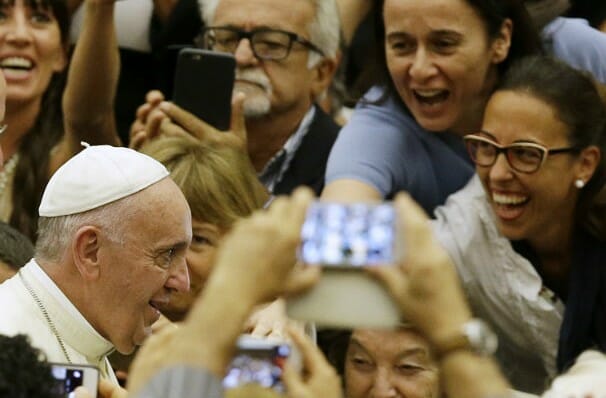
“Welcome to New York, Holy Father”
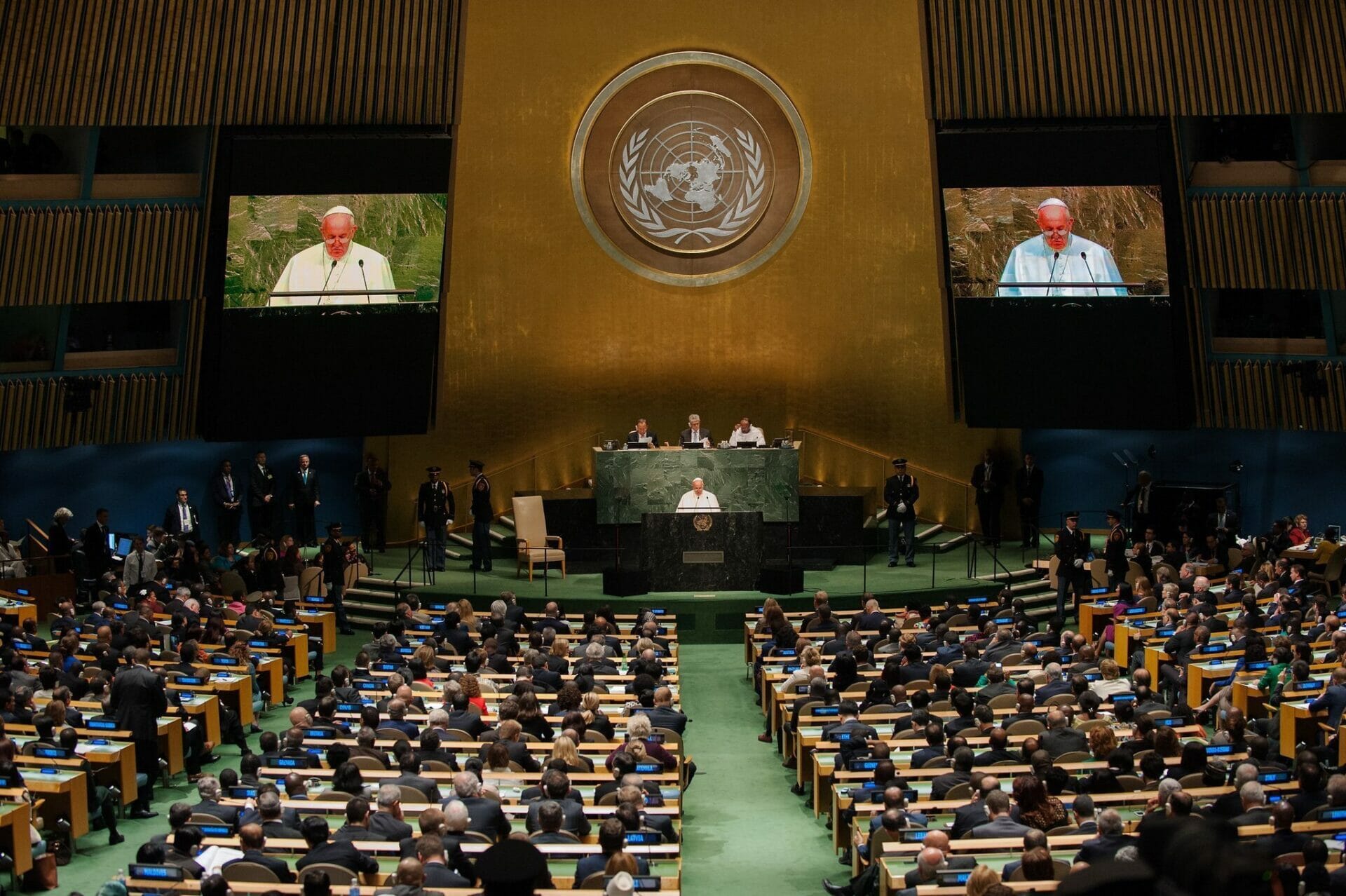 “Welcome, Holy Father” posters appeared all around the city already on Thursday. The taxi driver watching the Pope on TV was not indifferent: “So, you’re going to see the Pope tomorrow? Congratulations!” “Everyone finds the Pope appealing because he is authentic,” a non-Catholic man on the train said. He’s right: Francis does not need to attract attention or make himself appealing to all. And so he gave us a lesson before the UN’s General Assembly: on sustainable development, climate change and the issue of refugees: “We must not be appalled by the numbers… we have to look at their faces and listen to their stories,” he said in Washington. And at the UN: “Every man must be able to have concrete access to indispensible material and spiritual goods: a home, a dignified and well paid job, enough food, drinking water and religious freedom. ” He again strongly criticised drug trafficking, sexual exploitation of people, the arms rackets. In the same way as he had clearly denounced before the US Congress, he made another appeal to put aside divisions and antagonisms between political parties and to help the poor. The sacredness of each human being is a theme he strongly feels, and at the end of his speech, there were unending rounds of applause. He then left and greeted the people from his Fiat car which seemed so tiny amid the huge limousines.
“Welcome, Holy Father” posters appeared all around the city already on Thursday. The taxi driver watching the Pope on TV was not indifferent: “So, you’re going to see the Pope tomorrow? Congratulations!” “Everyone finds the Pope appealing because he is authentic,” a non-Catholic man on the train said. He’s right: Francis does not need to attract attention or make himself appealing to all. And so he gave us a lesson before the UN’s General Assembly: on sustainable development, climate change and the issue of refugees: “We must not be appalled by the numbers… we have to look at their faces and listen to their stories,” he said in Washington. And at the UN: “Every man must be able to have concrete access to indispensible material and spiritual goods: a home, a dignified and well paid job, enough food, drinking water and religious freedom. ” He again strongly criticised drug trafficking, sexual exploitation of people, the arms rackets. In the same way as he had clearly denounced before the US Congress, he made another appeal to put aside divisions and antagonisms between political parties and to help the poor. The sacredness of each human being is a theme he strongly feels, and at the end of his speech, there were unending rounds of applause. He then left and greeted the people from his Fiat car which seemed so tiny amid the huge limousines. 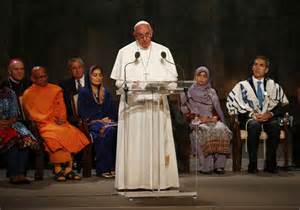 At Ground Zero, 500 representatives of various religions were all waiting to pray together for peace. Sue Kopp, a focolarina of New York who was able to participate in the rite, affirmed: “It was so meaningful also due to the diversity of this country. This place, which seemed so sacred to me, and marked by such immense suffering, has been transformed into a place of hope. The dream of a civilisation of love, is becoming a reality.”. Joe Klock, of New Humanity (an International NGO accredited at the UN) said; “The Pope underlined the importance of building unity in diversity, where peace and love reign among the nations and the hearts of all. This reality demonstrates that the world needs the spirituality of unity, which seems to be precisely tailored to this country!” Also in New York, the Pope visited some charitable organisations, among which a model school in Harlem. And then, in Central Park. The 80,000 lucky people were able to get entrance tickets, waited for hours, even to get just a glimpse of him. The Mass was celebrated at Madison Square Garden, where the seats are usually occupied by basketball stars and pop singers. The people waited for hours to enter but no one complained. Then the big surprise: Pope Francis arrived 20 minutes earlier than planned!
At Ground Zero, 500 representatives of various religions were all waiting to pray together for peace. Sue Kopp, a focolarina of New York who was able to participate in the rite, affirmed: “It was so meaningful also due to the diversity of this country. This place, which seemed so sacred to me, and marked by such immense suffering, has been transformed into a place of hope. The dream of a civilisation of love, is becoming a reality.”. Joe Klock, of New Humanity (an International NGO accredited at the UN) said; “The Pope underlined the importance of building unity in diversity, where peace and love reign among the nations and the hearts of all. This reality demonstrates that the world needs the spirituality of unity, which seems to be precisely tailored to this country!” Also in New York, the Pope visited some charitable organisations, among which a model school in Harlem. And then, in Central Park. The 80,000 lucky people were able to get entrance tickets, waited for hours, even to get just a glimpse of him. The Mass was celebrated at Madison Square Garden, where the seats are usually occupied by basketball stars and pop singers. The people waited for hours to enter but no one complained. Then the big surprise: Pope Francis arrived 20 minutes earlier than planned!  The altar, the chair and the pulpit were simply handcrafted . Cardinal Timothy Dolan had the impression that the Pope would have appreciated this more than if the items were made by a designer. And here, Francis became the pastor of the immense city, recalling the reading from the book of Isaiah 9.1: “The people walking in the darkness saw a great light.”. He spoke about the difficulties of the multicultural cities where the light is absent due to so much smog. “But Jesus walks down our streets today,” he said and continued to invite all to go out towards the others, with the heart of a “merciful father waiting for his children to come home.” The church is alive in the cities, the Pope stressed, and so Christians have to bear witness to the light of the Good News. The applause went on and on. As in all the other countries, also in the USA the Pope has touched the heart of each one of us.
The altar, the chair and the pulpit were simply handcrafted . Cardinal Timothy Dolan had the impression that the Pope would have appreciated this more than if the items were made by a designer. And here, Francis became the pastor of the immense city, recalling the reading from the book of Isaiah 9.1: “The people walking in the darkness saw a great light.”. He spoke about the difficulties of the multicultural cities where the light is absent due to so much smog. “But Jesus walks down our streets today,” he said and continued to invite all to go out towards the others, with the heart of a “merciful father waiting for his children to come home.” The church is alive in the cities, the Pope stressed, and so Christians have to bear witness to the light of the Good News. The applause went on and on. As in all the other countries, also in the USA the Pope has touched the heart of each one of us.
Word of Life – October 2015
We can be like the first Christians and replicate their dramatic effect on society around them, if we live like them. For this we must focus on the Gospel’s core message and love one another in the power and the style of Jesus. Here we have the badge, the mark, the typical brand of Christians. Or at least it ought to be, because Jesus saw his community in this way. A fascinating text from Christianity’s early centuries, the Letter to Diognetus, recognizes that ‘Christians cannot be distinguished from the rest of the human race by country or language or customs. They do not live in cities of their own; they do not use a peculiar form of speech; they do not follow an eccentric manner of life.’ They are ordinary people, just the same as others. And yet they have a secret and it allows them to influence society profoundly, becoming as it were its ‘soul’ (see chs 5-6). It is a secret that Jesus passed on to his disciples shortly before dying. Like the ancient sages of Israel, like a father for his child, so too he, the Master of Wisdom, left as his legacy the art of knowing how to live and to live well. He had taken it directly from the Father: ‘I have made known to you everything that I have heard from my Father’ Jn 15:15), and it was the fruit of the relationship between them. It consisted in loving one another. This is his Last Will and Testament, the life of heaven that he brought to earth, which he shares with us so that it can become our very own life. He wants this to be the identity of his disciples, who should be recognizable as his followers by their mutual love: ‘By this everyone will know that you are my disciples, if you have love for one another.’ Are Jesus’s disciples recognized by their mutual love? ‘The history of the Church is a history of holiness’ wrote John Paul II. Nonetheless ‘history also records events which constitute a counter-testimony to Christianity’ (Incarnationis Mysterium, 11). For centuries, in the name of Jesus, Christians have fought endless wars with one another and their divisions continue. There are people who still today associate Christians with the Crusades, with the Inquisition, or who see them as the defenders to the bitter end of an outdated morality, and as opposing the progress of science. It was not like that for the new-born community of the first Christians in Jerusalem. People admired the communion of goods they practised, the unity that reigned among them, the ‘glad and generous hearts’ that characterized them (see Acts 2:46). In the Acts of the Apostles we read that ‘the people held them in high esteem’ so that more and more ‘believers were added to the Lord, great numbers of both men and women’ (Acts 5:13-14). The living witness of the community had a powerful attraction. Why today are we not known as people who stand out because of their love? What have we done with the commandment of Jesus? ‘By this everyone will know that you are my disciples, if you have love for one another.’ Traditionally, in Roman Catholic circles, the month of October is dedicated to mission, to reflecting upon the command of Jesus to go into all the world and proclaim the Gospel, to pray for and support those who are in the frontline. This Word of Life could be a help for all to put into focus the fundamental dimension of every Christian proclamation. It is not about imposing faith on others, nor proselytism, nor a self-serving handout of aid to the poor so that they will be converted. Neither is it primarily a matter of the challenge to defend moral values or a firm stand against injustice and war, even though such stances are a duty the Christian cannot evade. Before all else the Christian proclamation is a witness of life that every disciple of Jesus must offer personally. People in the modern world ‘listen more willingly to witnesses than to teachers’ (Evangelii Nuntiandi, 41). Even persons hostile to the Church are often touched by the example of those who dedicate their lives to the sick and the poor and who are ready to leave their homelands, going far away to the toughest places and offering help and solidarity to those in most need. But above all the witness Jesus requires is that of a whole community which demonstrates the truth of the Gospel. It must show that the life he brought really can generate a new society, where we live genuinely as brothers and sisters, helping and serving one another, collectively attentive to the most fragile and needy. The life of the Church has seen these kinds of witness, such as the settlements for indigenous peoples built by Franciscans and Jesuits in South America, or monasteries with the townships that grew up around them. Today too ecclesial Movements and communities give life to little towns of witness where it is possible to see signs of a new society, the fruit of Gospel life, of mutual love. ‘By this everyone will know that you are my disciples, if you have love for one another.’ Without abandoning our homes and the persons we know, if among us we live that unity which Jesus gave his life for, we can create an alternative way of living and sow seeds of hope and new life around us. A family that every day renews their will to live mutual love in a practical way can become a ray of light in the mutual indifference of a housing block or a district. An ‘environmental cell’, in other words two or more persons who agree to put into practice the demands of the Gospel with total commitment – in the field of their work, at school, in local government offices, in administrative buildings, in a prison – will cut through the logic of the struggle for power and create a collaborative atmosphere that favours the birth of true fraternity, a fraternity previously unhoped-for. Did not the first Christians behave like this at the time of the Roman Empire? Is not this the way they spread the transformative new life of Christianity? In our own day it is we who are the ‘first Christians’, called, as they were, to forgive one another, to see each other as always new, to help one another – in a word, to love one another with the intensity that Jesus loved us, in the certainty that his presence in our midst has the strength to draw others too into the divine logic of love. Fabio Ciardi
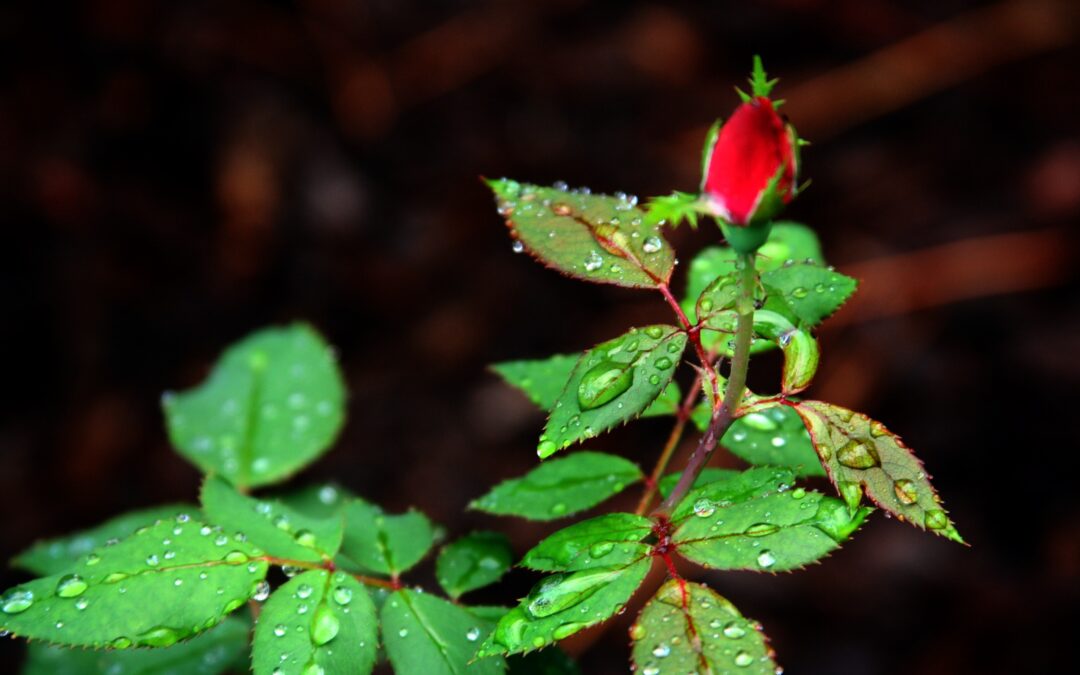
Living the Gospel: Accepting diversity as a gift
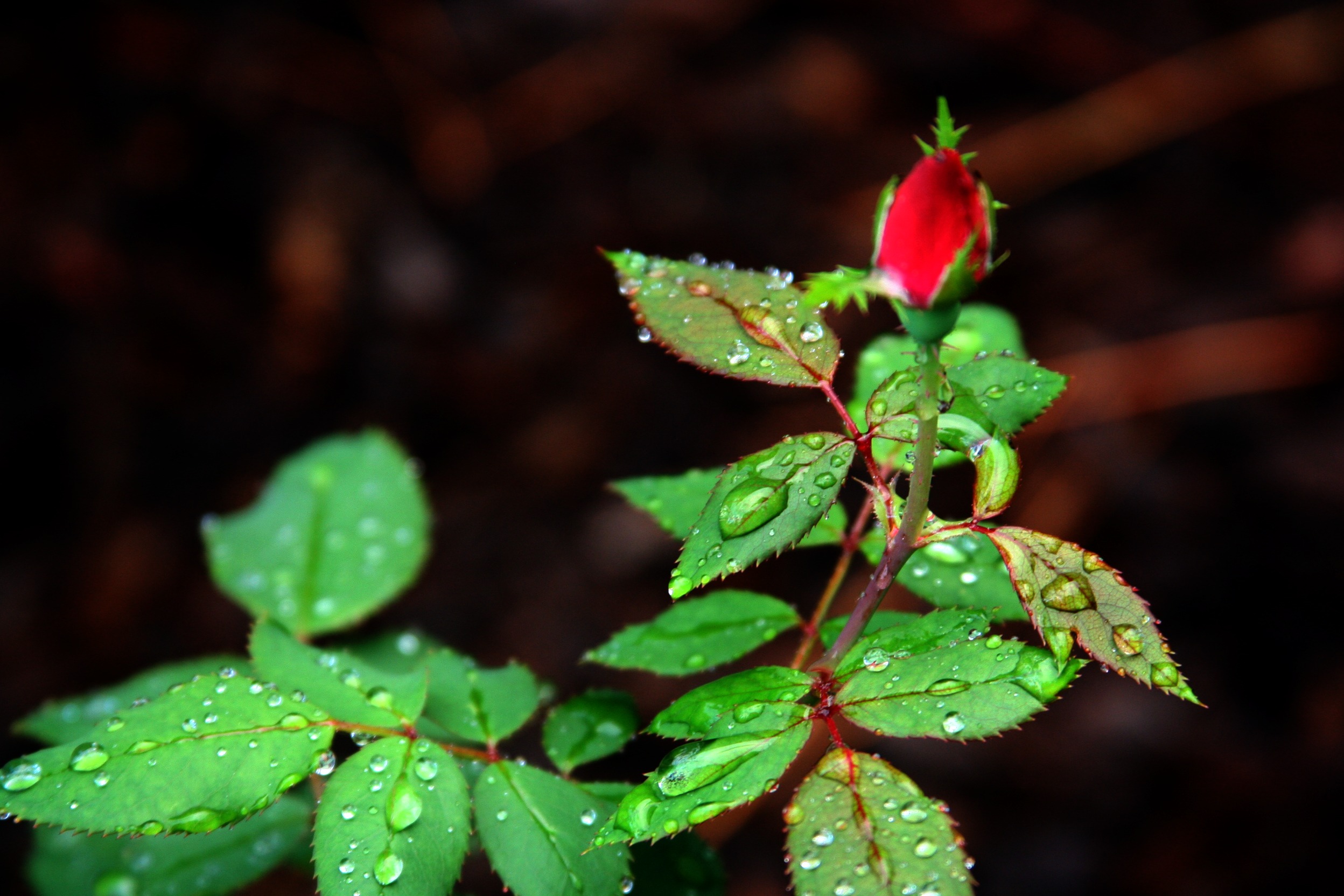 A missing son “My son, in the critical age of adolescence, and probably due to bad company, disappeared without giving any news of himself. In the evening I would go and look for him among the vagabonds. My desperation created misunderstandings with my husband, and I was running the risk of neglecting not only him but also my two other sons. One day, I recounted that during my search around town, I had met many young people who were alone, and who had been reduced to living on the streets due to drug addiction. My other sons offered to come with me to take food and clothing. Since then, life in the family has changed. That tragedy was really an eye opener.” (M. J. – Switzerland) The hospital “The critically ill patient next to my bed confided to me that he was an agnostic and that he hoped to die soon. I listened to him lengthily and then I felt I had to say to him: ‘I think that our task as human beings is to value life at every stage, whether we are healthy (employed or with other commitments), or sick (with our therapies, pains, in our relationships with the nurses, relatives and the other patients). Death, however, may come, but we shall be what we have done in life and valuing the life we have received.’ The other patient seems to be serene now. In the evening, he who was always brooding even welcomed his daughter with a smile. I think he will sleep better tonight.” (D.B. – Trent, Italy) Prison visit “Rosa had to go the next day to teach in a military jail that was out of the way and did not have a car. I offered to accompany her, and moved some of my various commitments. The next day, on the way I tried to reassure my friend: I would make use of my time waiting outside the jail to say a prayer for her. So I did, while she was inside. After a few hours, I saw her come out all smiles due to the relationship she had established with the new students; she had felt my support through prayers. Now she goes to the jail on her own, but still treasures the experience we lived together.” (C. D. – Campania, Italy) The soldier of the Presidential guards “Corneille is a student at Kinshasha University. Last week he was there, in front of the faculty together with his friends, when a soldier of the Presidential guards approached them and begged for help for his child who was seriously ill. The students looked at one another, their hands in their pockets. Also Corneille put his hands in his pocket, and fumbled with: in the left pocket, the leaflet with the Word of Life, and in the right, some coins. After a moment’s hesitation, he offered the money to the soldier. When they were alone again, his friends said: ‘You must be mad, giving your money to him, above all!’ So Corneille gave them the Word of Life. They read it and one of them said: ‘You are really a coherent person. I like that.’ ((C. – Democratic Republic of Congo )
A missing son “My son, in the critical age of adolescence, and probably due to bad company, disappeared without giving any news of himself. In the evening I would go and look for him among the vagabonds. My desperation created misunderstandings with my husband, and I was running the risk of neglecting not only him but also my two other sons. One day, I recounted that during my search around town, I had met many young people who were alone, and who had been reduced to living on the streets due to drug addiction. My other sons offered to come with me to take food and clothing. Since then, life in the family has changed. That tragedy was really an eye opener.” (M. J. – Switzerland) The hospital “The critically ill patient next to my bed confided to me that he was an agnostic and that he hoped to die soon. I listened to him lengthily and then I felt I had to say to him: ‘I think that our task as human beings is to value life at every stage, whether we are healthy (employed or with other commitments), or sick (with our therapies, pains, in our relationships with the nurses, relatives and the other patients). Death, however, may come, but we shall be what we have done in life and valuing the life we have received.’ The other patient seems to be serene now. In the evening, he who was always brooding even welcomed his daughter with a smile. I think he will sleep better tonight.” (D.B. – Trent, Italy) Prison visit “Rosa had to go the next day to teach in a military jail that was out of the way and did not have a car. I offered to accompany her, and moved some of my various commitments. The next day, on the way I tried to reassure my friend: I would make use of my time waiting outside the jail to say a prayer for her. So I did, while she was inside. After a few hours, I saw her come out all smiles due to the relationship she had established with the new students; she had felt my support through prayers. Now she goes to the jail on her own, but still treasures the experience we lived together.” (C. D. – Campania, Italy) The soldier of the Presidential guards “Corneille is a student at Kinshasha University. Last week he was there, in front of the faculty together with his friends, when a soldier of the Presidential guards approached them and begged for help for his child who was seriously ill. The students looked at one another, their hands in their pockets. Also Corneille put his hands in his pocket, and fumbled with: in the left pocket, the leaflet with the Word of Life, and in the right, some coins. After a moment’s hesitation, he offered the money to the soldier. When they were alone again, his friends said: ‘You must be mad, giving your money to him, above all!’ So Corneille gave them the Word of Life. They read it and one of them said: ‘You are really a coherent person. I like that.’ ((C. – Democratic Republic of Congo )
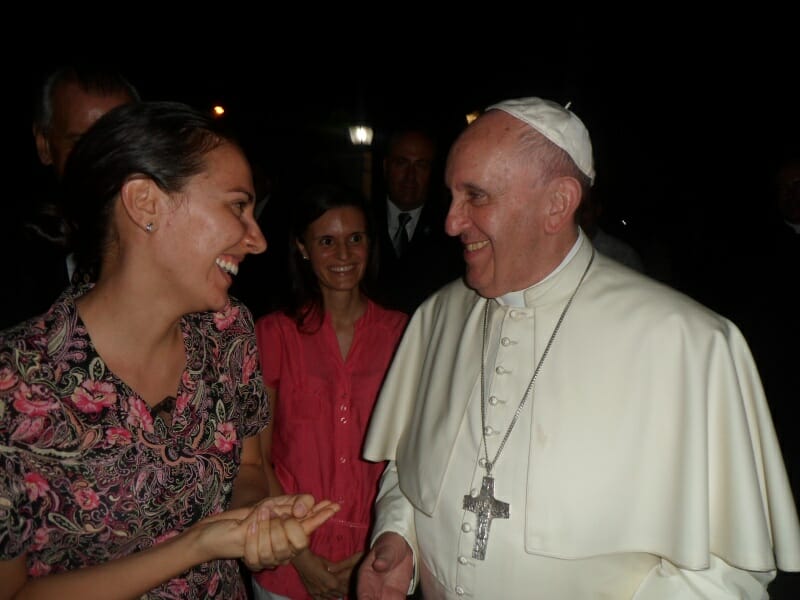
Francis in Cuba, demolishing walls and building bridges
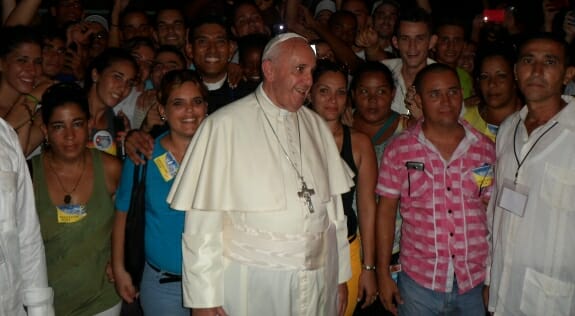 “We strongly felt the dream of a “united world” during these days of grace due to the presence of Pope Francis in Cuba. His visit literally left a trail of light! Already the preparations were full of enthusiasm and novelties. In the three dioceses he would visit, the entire communities of the Church started up various initiatives: in the churches and the “mission houses,” groups of young people held meetings in parks, and around the neighbourhood to talk about the Pope – in short, it was a happy and expectant Church! And, as never before, the means of communication (of the state) offered an extensive footage to prepare the Cuban people for this important visit – also from the political point of view, due to the known role the Pope played in reestablishing relationships between Cuba and the United States. The radios, TV stations and press continually announced the visit, with small “catecheses” on the Pope and the Church documentaries on his life, and also that of the other two Popes who had visited the Island. It was surprise and joy for a Church that had for years been isolated by the lack of the means of communication for so many years!» “The Pope arrived like a “missionary of mercy,” with simple words and gestures – often gentle but impressive – he told the Cubans and the whole world that without forgiveness, without practising the culture of encounter and dialogue, it would be impossible to hope for the future. With his very first words he immediately opened new horizons: “Geographically, Cuba is an archipelago that plays an extraordinary key role between the north and south and between east and west. Its natural vocation is to be a meeting point so that all peoples can be united by friendship (…). We are testimonials of an event that has filled us with hope: the process of the normalisation of relationships between two peoples, after years of estrangement. It is a sign of the victory of the culture of encounter and dialogue.” He invited all to “continue to progress on this path and develop all its potentials, as proof of the important service in favour of peace and the wellbeing of its people and the entire America, as an example of reconciliation for the whole world.” In the Mass in Plaza de la Revolución in Havana, he also said: “…authentic life is lived through the concrete commitment toward one’s neighbour, through one’s service,” recalling above all the service of the weakest among brethren. “We are all called due to our Christian vocation to serving others and helping one another not to fall into the temptation of practicing a service that exploits others,” he warned.
“We strongly felt the dream of a “united world” during these days of grace due to the presence of Pope Francis in Cuba. His visit literally left a trail of light! Already the preparations were full of enthusiasm and novelties. In the three dioceses he would visit, the entire communities of the Church started up various initiatives: in the churches and the “mission houses,” groups of young people held meetings in parks, and around the neighbourhood to talk about the Pope – in short, it was a happy and expectant Church! And, as never before, the means of communication (of the state) offered an extensive footage to prepare the Cuban people for this important visit – also from the political point of view, due to the known role the Pope played in reestablishing relationships between Cuba and the United States. The radios, TV stations and press continually announced the visit, with small “catecheses” on the Pope and the Church documentaries on his life, and also that of the other two Popes who had visited the Island. It was surprise and joy for a Church that had for years been isolated by the lack of the means of communication for so many years!» “The Pope arrived like a “missionary of mercy,” with simple words and gestures – often gentle but impressive – he told the Cubans and the whole world that without forgiveness, without practising the culture of encounter and dialogue, it would be impossible to hope for the future. With his very first words he immediately opened new horizons: “Geographically, Cuba is an archipelago that plays an extraordinary key role between the north and south and between east and west. Its natural vocation is to be a meeting point so that all peoples can be united by friendship (…). We are testimonials of an event that has filled us with hope: the process of the normalisation of relationships between two peoples, after years of estrangement. It is a sign of the victory of the culture of encounter and dialogue.” He invited all to “continue to progress on this path and develop all its potentials, as proof of the important service in favour of peace and the wellbeing of its people and the entire America, as an example of reconciliation for the whole world.” In the Mass in Plaza de la Revolución in Havana, he also said: “…authentic life is lived through the concrete commitment toward one’s neighbour, through one’s service,” recalling above all the service of the weakest among brethren. “We are all called due to our Christian vocation to serving others and helping one another not to fall into the temptation of practicing a service that exploits others,” he warned. 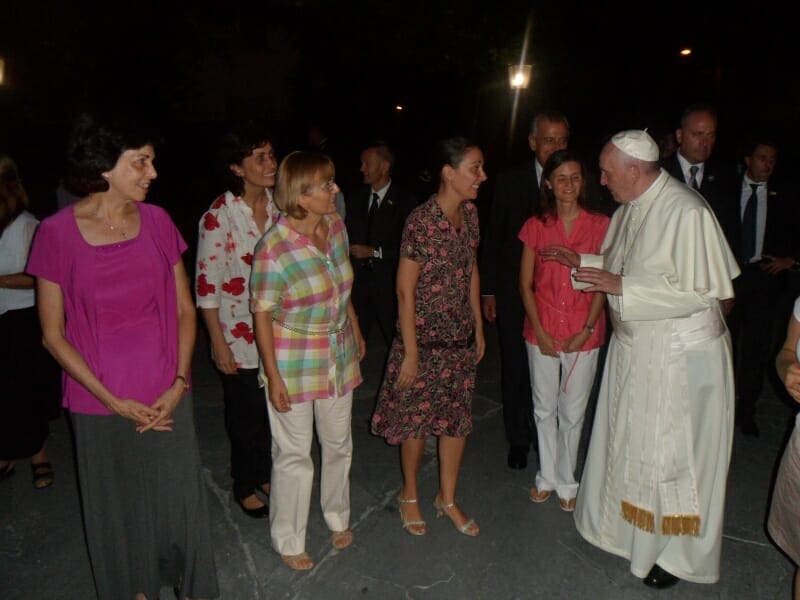 In his meeting with the youth, the empathy was immediate. To the wish expressed by one of them, of “not wanting to present only their dreams, but of requesting something special that could revive hope…,” Francis answered firmly, “Continue dreaming, because if you offer the best of yourself, you will help the world to be different. Don’t forget: go on dreaming! Dream and recount your dreams. Talk about them since the big endeavours have to be told!”
In his meeting with the youth, the empathy was immediate. To the wish expressed by one of them, of “not wanting to present only their dreams, but of requesting something special that could revive hope…,” Francis answered firmly, “Continue dreaming, because if you offer the best of yourself, you will help the world to be different. Don’t forget: go on dreaming! Dream and recount your dreams. Talk about them since the big endeavours have to be told!”  “Many of us – they continued – had the chance to greet him personally, starting not only from the focolarine working in the Nunciature, but also the families, and the youth in the various cities he visited.” The Focolare has been in Cuba since 1998 and the service it tries to offer the Church and society is that of weaving a network of fraternity, bringing “social friendship” which the Pope presented to the youth and to favour “the culture of encounter,” to pursue as a journey of hope. “Many of us were part of the service staff, before and after the visit: some helped the media in organising the events, some gave interviews on the national and international media, or simply stayed in their places along the route the Pope would take, to greet him. In line with our vocation of unity, together with believers and agnostics, we lived and participated in these days of grace.” In the Sanctuary of Our Lady of Charit, Pope Francis left us with a programme: “We want to be a Church that goes out from its homes to build bridges, demolish walls and sow reconciliation. Like Mary, we want to be a Church that is able to walk with its people in difficult situations, committing ourselves with our lives, our culture, society, and not isolating ourselves, but walking alongside our brethren. All together, all together.”
“Many of us – they continued – had the chance to greet him personally, starting not only from the focolarine working in the Nunciature, but also the families, and the youth in the various cities he visited.” The Focolare has been in Cuba since 1998 and the service it tries to offer the Church and society is that of weaving a network of fraternity, bringing “social friendship” which the Pope presented to the youth and to favour “the culture of encounter,” to pursue as a journey of hope. “Many of us were part of the service staff, before and after the visit: some helped the media in organising the events, some gave interviews on the national and international media, or simply stayed in their places along the route the Pope would take, to greet him. In line with our vocation of unity, together with believers and agnostics, we lived and participated in these days of grace.” In the Sanctuary of Our Lady of Charit, Pope Francis left us with a programme: “We want to be a Church that goes out from its homes to build bridges, demolish walls and sow reconciliation. Like Mary, we want to be a Church that is able to walk with its people in difficult situations, committing ourselves with our lives, our culture, society, and not isolating ourselves, but walking alongside our brethren. All together, all together.”
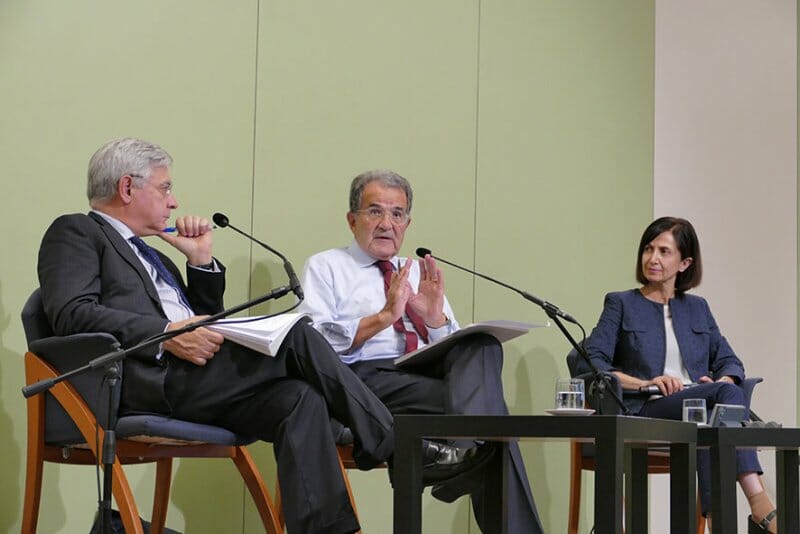
The world is tending towards unity: A socio-political view point
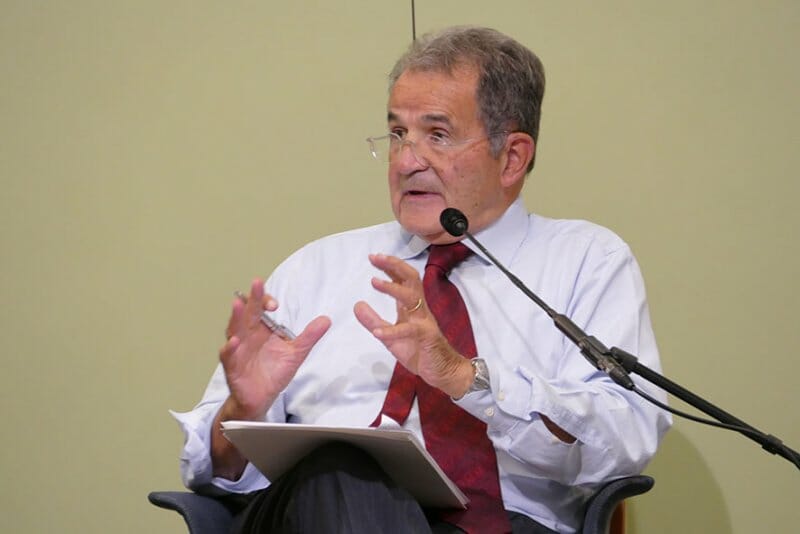 “We can react to this situation through forms of reorganization, even if they are not perfect, but which bring together countries and people from various fields. Our problem in Europe is one of an imperfect unity, but we must keep going with it. And in the context of the migrant crisis we feel that unity is essential to our future,” states Roman Prodi, twice Prime Minister of Italy and former President of the European Commission. As an economist, academic and politician, he gave an interview during the meeting for Focolare regional delegates. He continues, “We must build up reasons for hope in ways that will be different in different parts of the world. We need energy that comes from the base. Instead, in the Middle East we need the major world powers to dialogue with each other because otherwise nothing will be resolved.” The interview took place on 21 September, at the Mariapolis Centre in Castel Gandolfo, during the second week of the convention. The session was entitled: The world is tending towards unity: a socio-political viewpoint. While the subject matter is complex, it’s very much in tune with, and integrated into, the theme of unity which is the focus this year for the Focolare Movement and which has been dealt with throughout the program.
“We can react to this situation through forms of reorganization, even if they are not perfect, but which bring together countries and people from various fields. Our problem in Europe is one of an imperfect unity, but we must keep going with it. And in the context of the migrant crisis we feel that unity is essential to our future,” states Roman Prodi, twice Prime Minister of Italy and former President of the European Commission. As an economist, academic and politician, he gave an interview during the meeting for Focolare regional delegates. He continues, “We must build up reasons for hope in ways that will be different in different parts of the world. We need energy that comes from the base. Instead, in the Middle East we need the major world powers to dialogue with each other because otherwise nothing will be resolved.” The interview took place on 21 September, at the Mariapolis Centre in Castel Gandolfo, during the second week of the convention. The session was entitled: The world is tending towards unity: a socio-political viewpoint. While the subject matter is complex, it’s very much in tune with, and integrated into, the theme of unity which is the focus this year for the Focolare Movement and which has been dealt with throughout the program.  Together with Romano Prodi at the interview was session was Pasquale Ferrara, a diplomat, Secretary-General of the European University Institute in Florence, who is involved in academic activities and research in the field of international relations. He commented, “One point we should reflect on is that globalization has positive effects. The problem about globalisation is that it is not universal. Globalisation is about seeking to extend one economic model, liberal economics, to the whole world. On the political level it is the effort to spread liberal democracy.” He went on to invite everyone to “listen to the needs of all peoples in the world” because “peoples can’t be categorised into Series A and Series B. There can’t be members of the Security Council and then all the rest. We must take account of all the needs expressed by all peoples.” The solution he proposed: “To start from the foundations, building up civil and international society. We have too much trust in institutions, governments, organizations and authorities, which are of course important. But in many situations, especially in societies that are internally divided in their own countries, and which need to work through processes of reconciliation for example, it is vital that this work starts from interpersonal and inter-community relations. Those who do this should know that they are actually doing actually political, civil, social and institutional reconstruction.” The dialogue session, held in the presence of audience composed of representatives from the whole world, was stimulating. Each of those present had their own expectations, challenges and inner resources. The two political experts were able to give documented insights into the current global socio-political situation, which is both complex and ever-changing. It was a contribution which enriched the reflection deeply felt by those who embrace the ideals of the Focolare Movement and who wish to work towards universal brotherhood and the building peace.
Together with Romano Prodi at the interview was session was Pasquale Ferrara, a diplomat, Secretary-General of the European University Institute in Florence, who is involved in academic activities and research in the field of international relations. He commented, “One point we should reflect on is that globalization has positive effects. The problem about globalisation is that it is not universal. Globalisation is about seeking to extend one economic model, liberal economics, to the whole world. On the political level it is the effort to spread liberal democracy.” He went on to invite everyone to “listen to the needs of all peoples in the world” because “peoples can’t be categorised into Series A and Series B. There can’t be members of the Security Council and then all the rest. We must take account of all the needs expressed by all peoples.” The solution he proposed: “To start from the foundations, building up civil and international society. We have too much trust in institutions, governments, organizations and authorities, which are of course important. But in many situations, especially in societies that are internally divided in their own countries, and which need to work through processes of reconciliation for example, it is vital that this work starts from interpersonal and inter-community relations. Those who do this should know that they are actually doing actually political, civil, social and institutional reconstruction.” The dialogue session, held in the presence of audience composed of representatives from the whole world, was stimulating. Each of those present had their own expectations, challenges and inner resources. The two political experts were able to give documented insights into the current global socio-political situation, which is both complex and ever-changing. It was a contribution which enriched the reflection deeply felt by those who embrace the ideals of the Focolare Movement and who wish to work towards universal brotherhood and the building peace.
Video in Italian – transcript in English https://vimeo.com/140062041
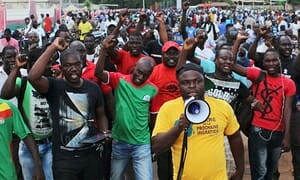
Burkina Faso in an unstable political situation
 “Ever since the coup d’etat last Thursday, 17 September– we are all still at home: the schools, offices, and shops are all closed. Petrol and food are running out and whatever is available, costs double,” explains Aurora De Oliveira of the Focolare in Bobo-Dioulasso, the second city of Burkina Faso. The protest here is felt, but not as strongly as in the capital, Ouagadougou (population of 1.5 million), where the main events of last week came about and where more than 100 people were wounded and at least ten have died. “These are determined people who do not wish to be crushed. In the big cities of Burkina Faso everyone participated in demonstrations, but peaceful ones. Undoubtedly, all are afraid, since war could explode any time now.” Jacques Sawadogo of the focolare community in the capital wrote: “The activities in Ouaga – where the army came – have slowed down. The banks, shops and stations have closed. Only small self-supporting activities have continued, like those of the Movement’s members in Ouagadougou. We try to keep contact via e-mail or telephone. We are trying our best to be peacemakers in words and actions.” We spoke on the phone also with Fr. Sylvestre Sanou, general vicar of the diocese of Bobo-Dioulasso. The situation is in constant evolution and we fear it may degenerate. “There’s a general strike throughout the country – Fr. Sylvestre continued – In reality it was not really a coup d’etat. It was a raid conducted by a small group of the Presidential Guards headed by General Diendéré, a close ally of former president, Blaise Compaoré, who rose to power in 1987 with a small coup d’etat and was forced to escape after 27 years, and only in October 2014, after days of protests. Since then he has taken refuge in the Ivory Coast. “It seems that Generale Diendéré has tried to negotiate for his immunity, after having been President Compaoré’s right-hand man.” We are, therefore, not dealing with a religious conflict between Muslims (50%), Christians (30%) or Traditional Religions (20%) but with a political situation. “The army seems to side with the population and the governors of the various regions are also against “coups,” and even Diendéré’s house was burnt down. Violence generates violence,” Fr. Sylvestre continued. “On 22 September we were all holding our breaths for the ultimatum of the army which entered the capital from four cities. The political future of the country is uncertain, despite the mediation of the Presidents of Benin and Senegal, on behalf of the Economic Community of West African States (CEDEAO) and the return of the transitory President of Burkina Faso, Michel Kafando and also the Prime Minister, Isaac Zida (arrested and then released).” “I had just returned from a stay in the Mariapolis “Victoria,” the town of the Focolare Movement in the Ivory Coast, and found myself in this situation,” concluded Fr. Sanou. ”They blocked the undergoing process of dialogue between the political parties which had tried to find common ground. But all blew up. Let us pray that a solution emerges without bloodshed and also quickly. In the meantime, we have started with the priests, religious and catechists of the diocese and also with our bishop, the pastoral visits programmed before these events. We feel the importance of going ahead and praying for our people and our country.” “How are we all taking this? At the start we were angry and disappointed– Aurora De Oliveira confided – since after the 2014 events the political situation was coming along well. Just a step away from elections, programmed for 11 October (and now moved to 22 November), and here comes an armed group to spoil it all. This was my first reaction, and we felt the need to protest. The next step was to see in this suffering the countenance of Jesus Forsaken, and thus try to strengthen unity among us all in order to transmit peace and forgiveness. We tried to contact all those who share our spirituality of unity, because love must overcome all.” While the meeting in Rome of delegates of the Movement from all over the world has started, and makes the hopes and sufferings of people all over the world particularly felt, the President of the Focolare, Maria Voce wrote to the community of Burkina Faso: “We shall continue to pray and live in greater unity with all of you, certain that Mary will protect us all.” https://vimeo.com/140074710
“Ever since the coup d’etat last Thursday, 17 September– we are all still at home: the schools, offices, and shops are all closed. Petrol and food are running out and whatever is available, costs double,” explains Aurora De Oliveira of the Focolare in Bobo-Dioulasso, the second city of Burkina Faso. The protest here is felt, but not as strongly as in the capital, Ouagadougou (population of 1.5 million), where the main events of last week came about and where more than 100 people were wounded and at least ten have died. “These are determined people who do not wish to be crushed. In the big cities of Burkina Faso everyone participated in demonstrations, but peaceful ones. Undoubtedly, all are afraid, since war could explode any time now.” Jacques Sawadogo of the focolare community in the capital wrote: “The activities in Ouaga – where the army came – have slowed down. The banks, shops and stations have closed. Only small self-supporting activities have continued, like those of the Movement’s members in Ouagadougou. We try to keep contact via e-mail or telephone. We are trying our best to be peacemakers in words and actions.” We spoke on the phone also with Fr. Sylvestre Sanou, general vicar of the diocese of Bobo-Dioulasso. The situation is in constant evolution and we fear it may degenerate. “There’s a general strike throughout the country – Fr. Sylvestre continued – In reality it was not really a coup d’etat. It was a raid conducted by a small group of the Presidential Guards headed by General Diendéré, a close ally of former president, Blaise Compaoré, who rose to power in 1987 with a small coup d’etat and was forced to escape after 27 years, and only in October 2014, after days of protests. Since then he has taken refuge in the Ivory Coast. “It seems that Generale Diendéré has tried to negotiate for his immunity, after having been President Compaoré’s right-hand man.” We are, therefore, not dealing with a religious conflict between Muslims (50%), Christians (30%) or Traditional Religions (20%) but with a political situation. “The army seems to side with the population and the governors of the various regions are also against “coups,” and even Diendéré’s house was burnt down. Violence generates violence,” Fr. Sylvestre continued. “On 22 September we were all holding our breaths for the ultimatum of the army which entered the capital from four cities. The political future of the country is uncertain, despite the mediation of the Presidents of Benin and Senegal, on behalf of the Economic Community of West African States (CEDEAO) and the return of the transitory President of Burkina Faso, Michel Kafando and also the Prime Minister, Isaac Zida (arrested and then released).” “I had just returned from a stay in the Mariapolis “Victoria,” the town of the Focolare Movement in the Ivory Coast, and found myself in this situation,” concluded Fr. Sanou. ”They blocked the undergoing process of dialogue between the political parties which had tried to find common ground. But all blew up. Let us pray that a solution emerges without bloodshed and also quickly. In the meantime, we have started with the priests, religious and catechists of the diocese and also with our bishop, the pastoral visits programmed before these events. We feel the importance of going ahead and praying for our people and our country.” “How are we all taking this? At the start we were angry and disappointed– Aurora De Oliveira confided – since after the 2014 events the political situation was coming along well. Just a step away from elections, programmed for 11 October (and now moved to 22 November), and here comes an armed group to spoil it all. This was my first reaction, and we felt the need to protest. The next step was to see in this suffering the countenance of Jesus Forsaken, and thus try to strengthen unity among us all in order to transmit peace and forgiveness. We tried to contact all those who share our spirituality of unity, because love must overcome all.” While the meeting in Rome of delegates of the Movement from all over the world has started, and makes the hopes and sufferings of people all over the world particularly felt, the President of the Focolare, Maria Voce wrote to the community of Burkina Faso: “We shall continue to pray and live in greater unity with all of you, certain that Mary will protect us all.” https://vimeo.com/140074710

An after-school program at zero cost
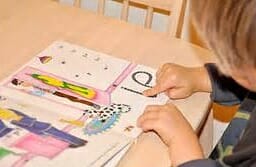 “I accepted this assignment in order to make concrete my choice to live the spirituality of unity, staying connected with other politicians who, like me, commit themselves to seek the common good and to make brotherhood emerge as a political category.” These are the words of Maria Elena Loschiavo, Deputy Mayor responsible for social politics and schools, in a municipality of just over 7,000 inhabitants. The past scholastic year several children and teens who exhibit learning disabilities and who, for various reasons, cannot depend on their families for support, were brought to her attention. “I wanted to invent something for them, but the friends of the Administration reminded me that there were no resources. So I discussed the matter with my husband, and then I spoke with friends and colleagues who are retired, and I called some young people I know. I immediately had at my disposition a good group of people from various cultures and religious traditions. Talking with them, we got the idea for an after-school program, every afternoon, from 3 to 5 pm. It was a bit of a gamble because starting something means carrying it through to the finish. It also means saying goodbye, for months and months, to our afternoon rest time. But we wanted to try, we wanted to enter the hearts of families who feel marginalized.” As soon as the town announcement was made public, many requests arrived, but the limit was 25 students. “For each one of them, there is a story, with troubling family situations which unfortunately do not help their inclusion in the learning process. We barely had time to organize ourselves, and then on March 9th, with great enthusiasm, we began: in a rather naïve way, without knowing exactly what we would encounter. But in the end the results were certainly visible! From the families, who strongly ask that the experiment be repeated next year, and especially from the children and teens.” “As the municipal administrator of a small town, I must admit that creating a team of people who are willing to give, is not easy to do. But neither is it impossible. It has certainly been exciting to see how each person in the group has accepted the chance to work together to love these young people, giving them a piece of his own life. We experienced together that freely giving is a difficult path to take, but it makes you feel you are building universal brotherhood, starting from the town where you live.”
“I accepted this assignment in order to make concrete my choice to live the spirituality of unity, staying connected with other politicians who, like me, commit themselves to seek the common good and to make brotherhood emerge as a political category.” These are the words of Maria Elena Loschiavo, Deputy Mayor responsible for social politics and schools, in a municipality of just over 7,000 inhabitants. The past scholastic year several children and teens who exhibit learning disabilities and who, for various reasons, cannot depend on their families for support, were brought to her attention. “I wanted to invent something for them, but the friends of the Administration reminded me that there were no resources. So I discussed the matter with my husband, and then I spoke with friends and colleagues who are retired, and I called some young people I know. I immediately had at my disposition a good group of people from various cultures and religious traditions. Talking with them, we got the idea for an after-school program, every afternoon, from 3 to 5 pm. It was a bit of a gamble because starting something means carrying it through to the finish. It also means saying goodbye, for months and months, to our afternoon rest time. But we wanted to try, we wanted to enter the hearts of families who feel marginalized.” As soon as the town announcement was made public, many requests arrived, but the limit was 25 students. “For each one of them, there is a story, with troubling family situations which unfortunately do not help their inclusion in the learning process. We barely had time to organize ourselves, and then on March 9th, with great enthusiasm, we began: in a rather naïve way, without knowing exactly what we would encounter. But in the end the results were certainly visible! From the families, who strongly ask that the experiment be repeated next year, and especially from the children and teens.” “As the municipal administrator of a small town, I must admit that creating a team of people who are willing to give, is not easy to do. But neither is it impossible. It has certainly been exciting to see how each person in the group has accepted the chance to work together to love these young people, giving them a piece of his own life. We experienced together that freely giving is a difficult path to take, but it makes you feel you are building universal brotherhood, starting from the town where you live.”  In October, the project begins again, this time with new developments, but still at zero cost, both for the administration and for the users. “In this second year,” explains M. Elena, “we can count on a greater number of teachers and therefore a greater number of children who can access the program. The location will be at the school, which facilitates working in synergy with the teacher of the class, who can observe each child’s difficulty, allowing us to immediately begin working to solve the problem. Thanks to the volunteer work we can avail ourselves of a medical-psycho-pedagogical laboratory. The teens will have recreational time (in our town there are many talents, great and small, in the fields of animation, painting, dance, etc…) and for the mothers there will be a yoga class each week. And with the support of the Athletic Associations in the area, there will be activities for motor development education. ” “The ideas that are being fulfilled here are many, but I am sure that many others will come, because as someone told me one day, in the field of solidarity it’s enough to take the first step. Then solidarity itself will guide the next ones.”
In October, the project begins again, this time with new developments, but still at zero cost, both for the administration and for the users. “In this second year,” explains M. Elena, “we can count on a greater number of teachers and therefore a greater number of children who can access the program. The location will be at the school, which facilitates working in synergy with the teacher of the class, who can observe each child’s difficulty, allowing us to immediately begin working to solve the problem. Thanks to the volunteer work we can avail ourselves of a medical-psycho-pedagogical laboratory. The teens will have recreational time (in our town there are many talents, great and small, in the fields of animation, painting, dance, etc…) and for the mothers there will be a yoga class each week. And with the support of the Athletic Associations in the area, there will be activities for motor development education. ” “The ideas that are being fulfilled here are many, but I am sure that many others will come, because as someone told me one day, in the field of solidarity it’s enough to take the first step. Then solidarity itself will guide the next ones.”
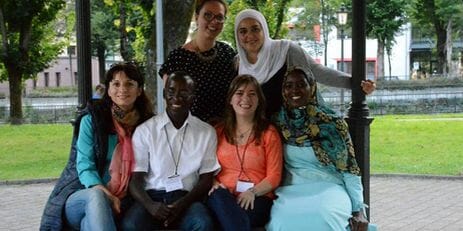
Religions in a global world
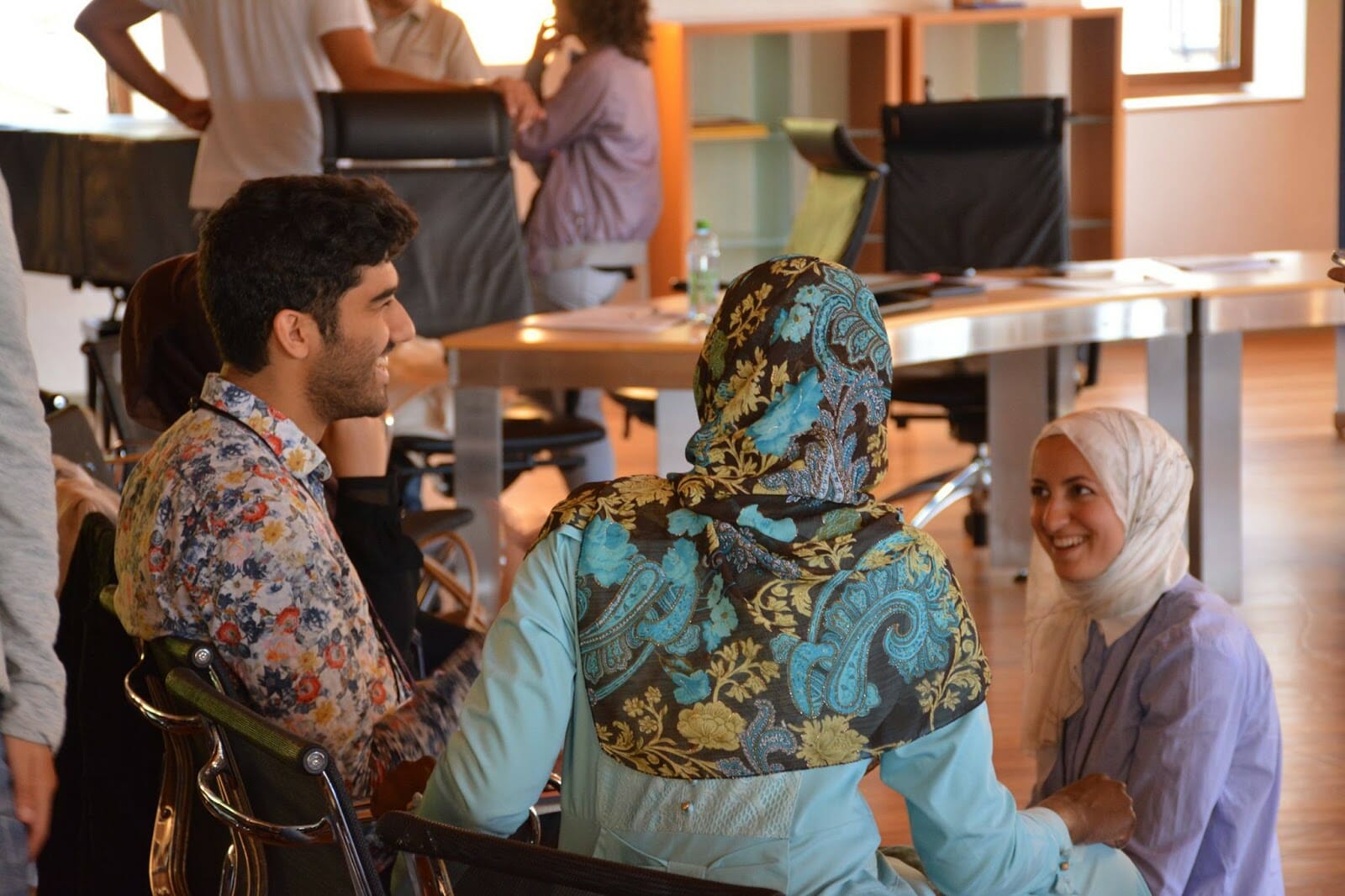 The Summer School was held in Tonadico in the Dolomite Mountains, not only due to the marvelous scenario of the locality, but also for the bond that existed between Chiara Lubich and those mountain districts. It was there, in fact, that in 1949 with some of her young companions, Chiara lived that mystic experience that is central to the history of the Work she had started. The idea of a summer school on “Religions in a global world” sparked up last April, at the end of an interdisciplinary seminar held at the Sophia University Institute. On that occasion a group of experts had started up an interdisciplinary, interreligious reflection (the scholars were Christians, Sciites and Sunnis Muslims, one was an expert on Buddhism and another, a lay thinker) and an intercultural event since there were also scholars from North Africa, Turkey, Iran, China and the USA, besides the European countries. The School program consisted of six general sessions, four of which were reserved for those who enrolled and two were open to the public. The one-to-one lessons were held after the work group discussions. T
The Summer School was held in Tonadico in the Dolomite Mountains, not only due to the marvelous scenario of the locality, but also for the bond that existed between Chiara Lubich and those mountain districts. It was there, in fact, that in 1949 with some of her young companions, Chiara lived that mystic experience that is central to the history of the Work she had started. The idea of a summer school on “Religions in a global world” sparked up last April, at the end of an interdisciplinary seminar held at the Sophia University Institute. On that occasion a group of experts had started up an interdisciplinary, interreligious reflection (the scholars were Christians, Sciites and Sunnis Muslims, one was an expert on Buddhism and another, a lay thinker) and an intercultural event since there were also scholars from North Africa, Turkey, Iran, China and the USA, besides the European countries. The School program consisted of six general sessions, four of which were reserved for those who enrolled and two were open to the public. The one-to-one lessons were held after the work group discussions. T he Sophia spirit lies precisely in uniting the dichotomy between life and thought, spiritual experience and scientific research. This perspective brought out the need to clarify how one’s personal comprehension of the truth harmonizes with that of people of other religions and cultures. A Slovak student highlighted how the research for knowledge can no longer be individual or monodisciplinary, but a community commitment that unites professors and students in the research efforts which should also be ,matched with a life commitment. Slowly, the participants managed to create a setting in which cultural contents and life perspectives harmonized, and solidified not only the traditional dichotomies, but also helped to break down cultural and religious barriers. Also the recreational moments were an occasion to deepen relationships, and delve into the deep differences in the worlds of each one, thus enhancing concrete dialogue where all is possible and sustainable. On the mountain peaks at 2,500 metres, the Christians gathered to celebrate Mass while the Muslims had their prayer rituals. At the closing of the School, the students all felt that they were bound by a sense of profound fraternity. The differences were still there, but now appeared as sources of mutual enrichment. On his way back, a young Shiite student wrote: “I would like to dedicate my first post on Facebook to the extraordinary group I was lucky to pass the Sophia Summer School with. I was able to present my faith in its authentic form, an opportunity that often is not possible in the light of the false image others often transmit of my religion. Likewise, I was also able to delve deeply into their lives, and in the faith of those I consider my brothers and sisters. The experience I had within the magical setting of the Dolomites, helped me to make a new discovery of the Catholic religion: I pray that we can continue this very important work. » Istituto Universitario Sophia
he Sophia spirit lies precisely in uniting the dichotomy between life and thought, spiritual experience and scientific research. This perspective brought out the need to clarify how one’s personal comprehension of the truth harmonizes with that of people of other religions and cultures. A Slovak student highlighted how the research for knowledge can no longer be individual or monodisciplinary, but a community commitment that unites professors and students in the research efforts which should also be ,matched with a life commitment. Slowly, the participants managed to create a setting in which cultural contents and life perspectives harmonized, and solidified not only the traditional dichotomies, but also helped to break down cultural and religious barriers. Also the recreational moments were an occasion to deepen relationships, and delve into the deep differences in the worlds of each one, thus enhancing concrete dialogue where all is possible and sustainable. On the mountain peaks at 2,500 metres, the Christians gathered to celebrate Mass while the Muslims had their prayer rituals. At the closing of the School, the students all felt that they were bound by a sense of profound fraternity. The differences were still there, but now appeared as sources of mutual enrichment. On his way back, a young Shiite student wrote: “I would like to dedicate my first post on Facebook to the extraordinary group I was lucky to pass the Sophia Summer School with. I was able to present my faith in its authentic form, an opportunity that often is not possible in the light of the false image others often transmit of my religion. Likewise, I was also able to delve deeply into their lives, and in the faith of those I consider my brothers and sisters. The experience I had within the magical setting of the Dolomites, helped me to make a new discovery of the Catholic religion: I pray that we can continue this very important work. » Istituto Universitario Sophia
Mercy is what binds civilization
“I see and I find my own light in the other, the true Reality of myself, the real me in the other (perhaps buried or secretly disguised for shame), and once I have found myself, I am reunited by resurrecting myself.” Chiara Lubich, The Resurrection of Rome. “Mercy was the dough with which we kneaded our civilization in past centuries. Without knowing and loving mercy we do not understand the Bible, the Covenant, the book of Exodus, Isaiah, the Gospel of Luke, Francis of Assisi, Teresa of Avila, Frances Cabrini, Don Bosco, Christian social works, the Italian Constitution, the European dream, and life together and love affairs after the concentration camps, families living and staying together until the very end. It is mercy that matures and keeps up our relationships through time, it turns falling in love into love, sympathy and emotional accordance into big and strong projects, it makes our “forever’s” pronounced in youth become a reality, it prevents maturity and old age from becoming just a nostalgic story of broken dreams. Mercy lives of three simultaneous movements: the eyes, the bowel (rachàm in the Bible) and that of the hands, the mind and the legs. Those who are merciful are first and foremost people that are able to see deeper. The first instant of mercy is a look that reconstructs the moral and spiritual figure of the one that arouses mercy in us. Before acting to “take care of him,” the merciful one looks at him and sees him in a different way. The “not yet” is glimpsed beyond the “already” and the “has already been” appears to all involved. Prior to being an ethical action, mercy is a movement of the soul, with which I can see the other in their original design, before the error and the fall, and I love them in order to recreate their truer nature. Mercy can reconstruct the broken image in the soul, it can reconstruct the interrupted storyline. It can see that there is an inter-human solidarity that is deeper and truer than any crime, it believes that fraternity is not cancelled by any fratricide. It sees Adam again, even after Cain. And while it perceives purity in impurity, beauty in ugliness, light within the darkness, it also moves the body, and touches one in the flesh. The whole insides are moved. Mercy involves the whole body, it is a totalistic experience, something like the birth of a new creature – if there was no mercy, the experience of childbirth would remain totally inaccessible to us males; and yet we can understand something of this mystery, the greatest of all, when we give life mercifully. Mercy is something that is felt, it hurts, there is labour in it. It is an embodied experience, it is corporal. For this reason those who know mercy also know disdain: if I do not suffer viscerally from all the injustice and evil around me, I cannot be merciful. The same bowels are moved today by the indignation and anger in front of the children who died locked inside a lorry or drowned in the sea, and tomorrow the betrayal of a friend in need of forgiveness”. (Read more) by Luigino Bruni Published in Avvenire (Italian newspaper) on 06/09/2015
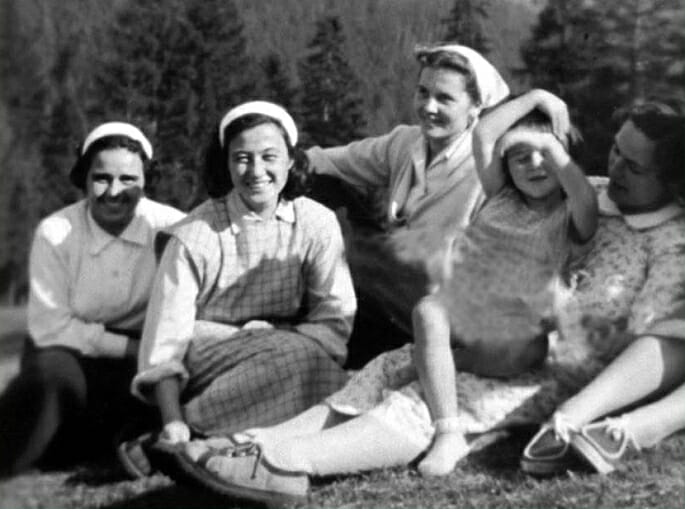
If we are united, Jesus is among us
 Following the practice that Chiara Lubich began, the Focolare Movement around the world goes into depth on one point of the spirituality of unity each year. After having reflected on and lived a central point which is the Eucharist, the Movement is now focussing on its specific goal: unity. There are a great many writings by Chiara Lubich on this essential point of Focolare spirituality. They give clear reference points and remain as a precious legacy. Here is one. “If we are united, Jesus is among us. And this has value. It is worth more than any other treasure that our heart may possess; more than mother, father, brothers, sisters, children. It is worth more than our house, our work, or our property; more than the works of art in a great city like Rome; more than our business deals; more than nature which surrounds us with flowers and fields, the sea and the stars; more than our own soul. It is he who, inspiring his saints with his eternal truths, leaves his mark upon every age. This too is his hour. Not so much the hour of a saint but of him, of him among us, of him living in us as we build up – in the unity of love – his Mystical Body. But we must enlarge Christ, make him grow in other members, become like him bearers of Fire. Make one of all and in all the One. It is then that we live the life that he gives us, moment by moment, in charity. The basic commandment is brotherly love. Everything is of value if it expresses sincere fraternal charity. Nothing we do is of value, if there is not the feeling of love for our brothers and sisters in it. For God is a Father and in his heart he has always and only his children.” Chiara Lubich, Essential Writings, New City Press, New York 2007, p. 102
Following the practice that Chiara Lubich began, the Focolare Movement around the world goes into depth on one point of the spirituality of unity each year. After having reflected on and lived a central point which is the Eucharist, the Movement is now focussing on its specific goal: unity. There are a great many writings by Chiara Lubich on this essential point of Focolare spirituality. They give clear reference points and remain as a precious legacy. Here is one. “If we are united, Jesus is among us. And this has value. It is worth more than any other treasure that our heart may possess; more than mother, father, brothers, sisters, children. It is worth more than our house, our work, or our property; more than the works of art in a great city like Rome; more than our business deals; more than nature which surrounds us with flowers and fields, the sea and the stars; more than our own soul. It is he who, inspiring his saints with his eternal truths, leaves his mark upon every age. This too is his hour. Not so much the hour of a saint but of him, of him among us, of him living in us as we build up – in the unity of love – his Mystical Body. But we must enlarge Christ, make him grow in other members, become like him bearers of Fire. Make one of all and in all the One. It is then that we live the life that he gives us, moment by moment, in charity. The basic commandment is brotherly love. Everything is of value if it expresses sincere fraternal charity. Nothing we do is of value, if there is not the feeling of love for our brothers and sisters in it. For God is a Father and in his heart he has always and only his children.” Chiara Lubich, Essential Writings, New City Press, New York 2007, p. 102
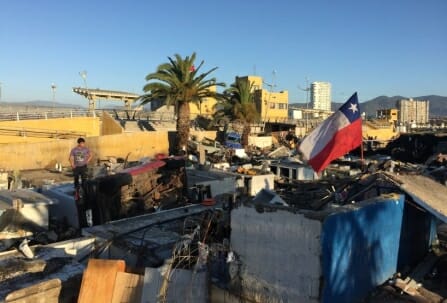
Chile: impossible not to love it
 “I’ve lost everything’ tearfully declared a fisherman from Guanaquero – a small village 450 km north of Santiago, on the Pacific. “But we will start again, as we Chileans have always done.” The cameraman embraced him in a supportive manner. These were some reactions after the night of the earthquake. On the evening of Wednesday, 16 September, just before 8 p.m. the series of seismic waves began, with an intensity of 8.4 on the Richter scale. The following secondary waves also exceeded an intensity of 7. The long seismic activity made us run to find refuge in the courtyard of our home. Our neighbours on the street also did so. “How are you all? Is all ok?” “Yes, don’t worry, and you?” we all asked one another. “Do you need anything?” There was no fear, no agitation. Also the children knew what to do. In Chile all are taught on how to behave in the buildings, schools, and supermarkets where the safety zones are all marked out for the protection from possible collapsing buildings. After the experience of 2010 the country was more than adequately prepared. In La Serena, 480 km north of Santiago, the capital, due to the intensity of the quakes we knew that the epicentre was very close. The lights went off and only when we found a radio transistor did we know that it was about a 100 km from here. A triangle of small towns of 20/30 thousand inhabitants, Illapel suffered great damages, but it was not so in the bigger towns. Less than an hour had passed and the radio then confirmed the tsunami alert. Throughout the country, evacuation of the coast of 6,000 km had started, from the desert in the north to the cold south: a million people had to find refuge at an altitude of at least 30 km?? above sea level. The waves arrived in the form of huge masses of water that advanced and raised the sea level to at least four metres. The port of Coquimbo with 150 thousand inhabitants was partly submerged. Then came the news of the victims. All were expecting it. It was just a few hours before our traditional celebrations for the independence of Chile, on the 18-19 September. The 12 victims and five missing would not be celebrating this year’s event. Among these, three died of heart attacks, another three were sucked up by the sea, and the others lost their lives due to falling rocks from the mountains or the collapse of walls. The government had declared a state of calamity in some provinces of the 4th Region. The President, Michelle Bachelet, spoke to the country: the rescue system has been activated. Our thoughts go to those who lost all their possessions: villages of fishermen, the inhabitants of the epicentre zone. It is the eighth emergency in less than two years. The earthquake in the north last year, the floods, and in March the most arid region of the planet, the Atacama Desert, was submerged by floods. Then the volcanoes were next: one last year and an eruption a few months ago. Then there was the tremendous drought from north to south, Valparaiso overwhelmed twice by fires in the surrounding zones, and now the earthquake and tsunami alert… Once the terrible list concluded, we recalled the words of the old fisherman of Guanaquero: “We shall overcome!” In his eyes I saw a reflection of determination and perseverance. The same values explained why on the bare and steep slopes of the mountains of this northern zone, suddenly immense green spots suddenly appeared with avocado and vine cultivations. They were literally pulled out from the soil, exploiting every drop of humidity for their irrigation. Only determination and perseverance can obtain fruits from nature that over here has nothing to offer. This is how we built this nation. It would be impossible not to love it » Alberto Barlocci, from Chile
“I’ve lost everything’ tearfully declared a fisherman from Guanaquero – a small village 450 km north of Santiago, on the Pacific. “But we will start again, as we Chileans have always done.” The cameraman embraced him in a supportive manner. These were some reactions after the night of the earthquake. On the evening of Wednesday, 16 September, just before 8 p.m. the series of seismic waves began, with an intensity of 8.4 on the Richter scale. The following secondary waves also exceeded an intensity of 7. The long seismic activity made us run to find refuge in the courtyard of our home. Our neighbours on the street also did so. “How are you all? Is all ok?” “Yes, don’t worry, and you?” we all asked one another. “Do you need anything?” There was no fear, no agitation. Also the children knew what to do. In Chile all are taught on how to behave in the buildings, schools, and supermarkets where the safety zones are all marked out for the protection from possible collapsing buildings. After the experience of 2010 the country was more than adequately prepared. In La Serena, 480 km north of Santiago, the capital, due to the intensity of the quakes we knew that the epicentre was very close. The lights went off and only when we found a radio transistor did we know that it was about a 100 km from here. A triangle of small towns of 20/30 thousand inhabitants, Illapel suffered great damages, but it was not so in the bigger towns. Less than an hour had passed and the radio then confirmed the tsunami alert. Throughout the country, evacuation of the coast of 6,000 km had started, from the desert in the north to the cold south: a million people had to find refuge at an altitude of at least 30 km?? above sea level. The waves arrived in the form of huge masses of water that advanced and raised the sea level to at least four metres. The port of Coquimbo with 150 thousand inhabitants was partly submerged. Then came the news of the victims. All were expecting it. It was just a few hours before our traditional celebrations for the independence of Chile, on the 18-19 September. The 12 victims and five missing would not be celebrating this year’s event. Among these, three died of heart attacks, another three were sucked up by the sea, and the others lost their lives due to falling rocks from the mountains or the collapse of walls. The government had declared a state of calamity in some provinces of the 4th Region. The President, Michelle Bachelet, spoke to the country: the rescue system has been activated. Our thoughts go to those who lost all their possessions: villages of fishermen, the inhabitants of the epicentre zone. It is the eighth emergency in less than two years. The earthquake in the north last year, the floods, and in March the most arid region of the planet, the Atacama Desert, was submerged by floods. Then the volcanoes were next: one last year and an eruption a few months ago. Then there was the tremendous drought from north to south, Valparaiso overwhelmed twice by fires in the surrounding zones, and now the earthquake and tsunami alert… Once the terrible list concluded, we recalled the words of the old fisherman of Guanaquero: “We shall overcome!” In his eyes I saw a reflection of determination and perseverance. The same values explained why on the bare and steep slopes of the mountains of this northern zone, suddenly immense green spots suddenly appeared with avocado and vine cultivations. They were literally pulled out from the soil, exploiting every drop of humidity for their irrigation. Only determination and perseverance can obtain fruits from nature that over here has nothing to offer. This is how we built this nation. It would be impossible not to love it » Alberto Barlocci, from Chile
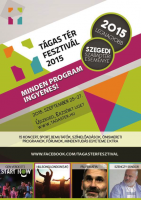
Gen Verde on tour in the Hungarian
 Gen Verde will be in the Hungarian town of Szeged, city which has become a symbol of the humanitarian challenges which Europe and the world are facing today. The message underpinning their workshops: hospitality and solidarity.
Gen Verde will be in the Hungarian town of Szeged, city which has become a symbol of the humanitarian challenges which Europe and the world are facing today. The message underpinning their workshops: hospitality and solidarity.
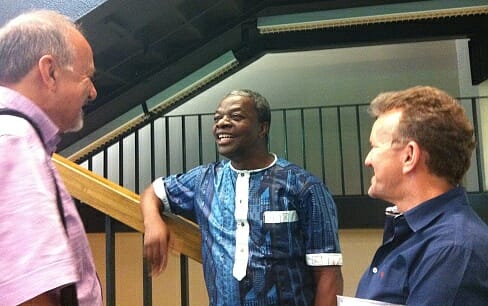
Bertin, the force of a choice in life
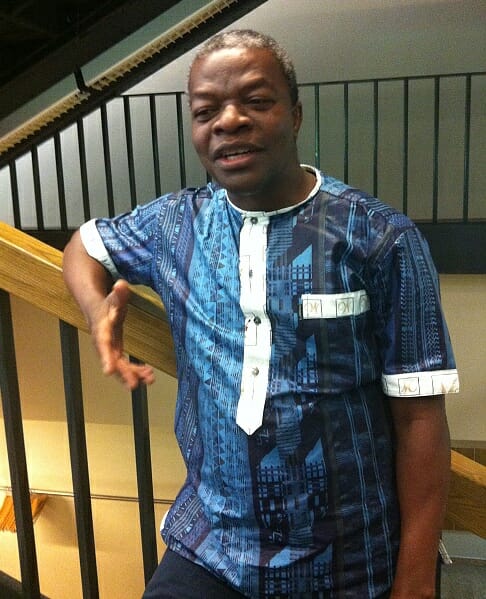 «I have been out of my country for more than 30 years. Every time I would return there was always the chance to meet with one of my brothers or sisters who had gotten married, or witness the birth of a nephew or niece. In my life, our family relationships and above all, the faith of our mother, a simple and brave woman like many African women, have always been the force that has sustained me in all my decisions and choices in life. Ever since I was a child, I had always been impressed by one of my uncles, a Franciscan friar who, at every visit, took care of all the children in the neighbourhood and not only his nieces and nephews, leaving a mark in my heart, and the desire to follow his footsteps in the future. When I just an adolescent – Mandela was already in prison – the massacre of the youth of Soweto happened and upset me so much that I vented out my anger against Fr. Paul, a Belgian Jesuit. I had said him, «If it only depended on me, all the white people would have to return to their own homes.» He answered calmly: «You know, we can fight discrimination with other weapons.» A few months later, he invited me to meet the Word of Life group in my town. Five years later, I found myself in Fontem, Cameroon, in the first testimonial-town of the Focolare in Africa, side by side with young people from Italy, France, Ireland, Belgium and other various African nations like Burundi, Uganda, Kenya, and Cameroon; and together with them I discovered that we are all brothers, despite our differences. This was how in my heart I felt the great desire to shout it out to the whole world, and testify to this fraternity, especially in daily life. In 1986 I was sent to Man in the Ivory Coast, where I remained for eight years. Together with all those who wanted to live the same ideal of fraternity, we nurtured mutual love among us, which drove us to promote concrete initiatives to help the needy in many ways, also through music, to tell the world that the united world is not a utopia. When I was 40 I transferred to Sao Paolo, Brazil, and had to learn a new language. I met a new people, which I fondly call a “population composed of peoples”: indios, native Brazilians and also the descendants of Germans, Italians, Ukraines, Japanese, Chinese, Afro-Brazilians and many other roots, but all Brazilians! It was creative, generous, and full of a contagious joy, which we, Africans are very familiar with. In a short time, I felt like I was one of them, that is, Brazilian.
«I have been out of my country for more than 30 years. Every time I would return there was always the chance to meet with one of my brothers or sisters who had gotten married, or witness the birth of a nephew or niece. In my life, our family relationships and above all, the faith of our mother, a simple and brave woman like many African women, have always been the force that has sustained me in all my decisions and choices in life. Ever since I was a child, I had always been impressed by one of my uncles, a Franciscan friar who, at every visit, took care of all the children in the neighbourhood and not only his nieces and nephews, leaving a mark in my heart, and the desire to follow his footsteps in the future. When I just an adolescent – Mandela was already in prison – the massacre of the youth of Soweto happened and upset me so much that I vented out my anger against Fr. Paul, a Belgian Jesuit. I had said him, «If it only depended on me, all the white people would have to return to their own homes.» He answered calmly: «You know, we can fight discrimination with other weapons.» A few months later, he invited me to meet the Word of Life group in my town. Five years later, I found myself in Fontem, Cameroon, in the first testimonial-town of the Focolare in Africa, side by side with young people from Italy, France, Ireland, Belgium and other various African nations like Burundi, Uganda, Kenya, and Cameroon; and together with them I discovered that we are all brothers, despite our differences. This was how in my heart I felt the great desire to shout it out to the whole world, and testify to this fraternity, especially in daily life. In 1986 I was sent to Man in the Ivory Coast, where I remained for eight years. Together with all those who wanted to live the same ideal of fraternity, we nurtured mutual love among us, which drove us to promote concrete initiatives to help the needy in many ways, also through music, to tell the world that the united world is not a utopia. When I was 40 I transferred to Sao Paolo, Brazil, and had to learn a new language. I met a new people, which I fondly call a “population composed of peoples”: indios, native Brazilians and also the descendants of Germans, Italians, Ukraines, Japanese, Chinese, Afro-Brazilians and many other roots, but all Brazilians! It was creative, generous, and full of a contagious joy, which we, Africans are very familiar with. In a short time, I felt like I was one of them, that is, Brazilian.  For 15 I worked in the Mariapolis Ginetta as a graphic designer and in the production of books and magazines for the New City publishers, building relationships among the staff, suppliers, printing press workers and security guards who had the task of inspecting all the boots of cars. With others, I also coordinated the activities of the young people of the Focolare Movement: the Gen3 and Youth for Unity. This experience was one of the most important of this period because they taught me to become an “adolescent,” even if I was an adult. Through love for one another kept alive among us, I discovered that I also had the capacity to make big sacrifices, since they had overflowing energy and enthusiasm. I also understood why the hair of many parents start turning white when there is an adolescent in the family. So now I am back again in the Ivory Coast: I have returned to continue building this pathway that started years ago with the youth. I had always been struck by the focolarini in the Focolare town of Victoria during the war, and who could have left the country then, but had decided to stay. Like Chiara Lubich and her first companions, they had sealed a pact of readiness to give up their lives for one another. This testimonial is something I treasure deep inside, and I wish with God’s grace, to live up to this measure with all our people. I do not know if we will achieve extraordinary things, but I would like to live each moment as if it were the last of my life.» Source: African Nouvelle Cité, July 2015
For 15 I worked in the Mariapolis Ginetta as a graphic designer and in the production of books and magazines for the New City publishers, building relationships among the staff, suppliers, printing press workers and security guards who had the task of inspecting all the boots of cars. With others, I also coordinated the activities of the young people of the Focolare Movement: the Gen3 and Youth for Unity. This experience was one of the most important of this period because they taught me to become an “adolescent,” even if I was an adult. Through love for one another kept alive among us, I discovered that I also had the capacity to make big sacrifices, since they had overflowing energy and enthusiasm. I also understood why the hair of many parents start turning white when there is an adolescent in the family. So now I am back again in the Ivory Coast: I have returned to continue building this pathway that started years ago with the youth. I had always been struck by the focolarini in the Focolare town of Victoria during the war, and who could have left the country then, but had decided to stay. Like Chiara Lubich and her first companions, they had sealed a pact of readiness to give up their lives for one another. This testimonial is something I treasure deep inside, and I wish with God’s grace, to live up to this measure with all our people. I do not know if we will achieve extraordinary things, but I would like to live each moment as if it were the last of my life.» Source: African Nouvelle Cité, July 2015
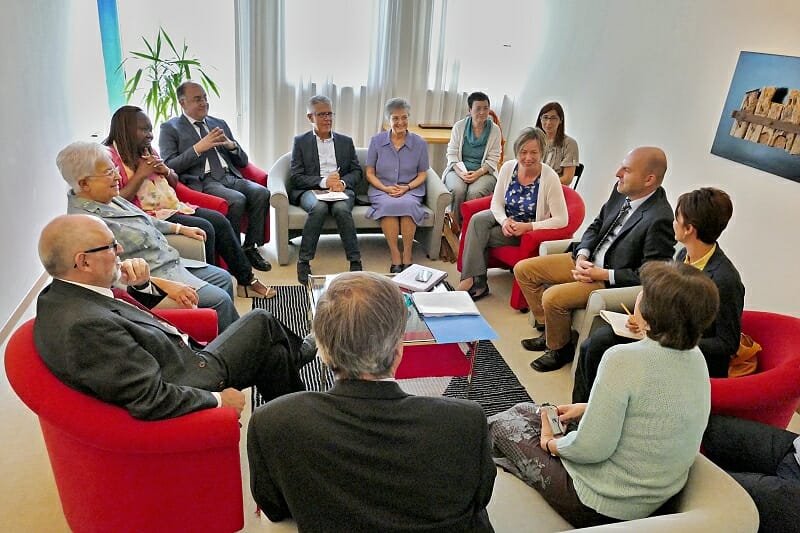
Changing the planet, caring for people
Networked for the common good, in the aftermath of Laudato Si’, which asks for immediate concrete action, includes many others besides Bernd Nilles and Maria Voce, who all met at the International Centre of the Focolare in Rocca di Papa, Italy, on September 9, 2015, together with co-president Jésus Moran and several collaborators representing the youth and several agencies of the Focolare (AFN, New Humanity, AMU, EoC). Working for lifestyle change is one of the main priorities of the CIDSE in this historic moment, and the the Secretary forcefully emphasizes it. Formed by the German Catholic Youth, Bernd Nilles is a human rights activist and has worked in cooperative projects with Colombia. He has also done research on peace and development, at the University of Duisburg. “You need a lot of motivation to do this work,” he remarks. The event at the beginning of June in the Vatican (people and planet first), allowed him to get to know the work of the Focolare Movement in the field of economy, and they began to find paths for common action. Curious to know more, Bernd Nilles remarked: “We have years of experience on political influence, but not on personal transformation. You are the experts in tha!” Maria Voce explained: “The life of the Gospel never leaves things as they are, if we want change that is real, ideas and ideologies can caress the mind, the imagination – but the Gospel transforms, and the is a people the world over that strives to live in that way.” The Encyclical Letter ‘Laudato Si’ was a source of inspiration for the NGO’s associated with the CIDSE, for an unprecedented mobilisation launch. The CIDSE is particularly involved in preparing global conferences on climate change that will be held in Paris from November 30 to December 11. The more important game is played outside the stadium where they work to create events, public manifestations and participation by the public. New Humanity (an NGO of the Focolare and partner of UNESCO), is working together with other NGO’s on the preparation of a Final Statement for the conference in Paris. The informal meeting will give CIDSE the Atlas of Fraternity, the first fruit of the United World Project, a platform promoted by Focolare young people where all the activities and projects in favour of “fraternity” can converge, indexed by category. Currently, efforts for peace made a strong impact through the hashtag #OpenYourBorders that gathered concrete projects and activities in support of refugees. Jésus Moran commented: “I recommended ‘Laudato Si’ to many of my atheist friends, telling them ‘Here you’ll find some input for a radical change for living in the world, something that could even save the human race.” He went on to say: “It is a matter of promoting a lifestyle based on sharing. The change in model is not merely a cosmetic social change, but one of social justice towards those whose problem is not the environment, but hunger, access to water, death by diseases that have had a cure for centuries. Therefore, the discourse needs to be radicalized in the sense of social justice. Consciences need to be worked on with every means, beginning from concrete action and giving them visibility.” See also
The informal meeting will give CIDSE the Atlas of Fraternity, the first fruit of the United World Project, a platform promoted by Focolare young people where all the activities and projects in favour of “fraternity” can converge, indexed by category. Currently, efforts for peace made a strong impact through the hashtag #OpenYourBorders that gathered concrete projects and activities in support of refugees. Jésus Moran commented: “I recommended ‘Laudato Si’ to many of my atheist friends, telling them ‘Here you’ll find some input for a radical change for living in the world, something that could even save the human race.” He went on to say: “It is a matter of promoting a lifestyle based on sharing. The change in model is not merely a cosmetic social change, but one of social justice towards those whose problem is not the environment, but hunger, access to water, death by diseases that have had a cure for centuries. Therefore, the discourse needs to be radicalized in the sense of social justice. Consciences need to be worked on with every means, beginning from concrete action and giving them visibility.” See also
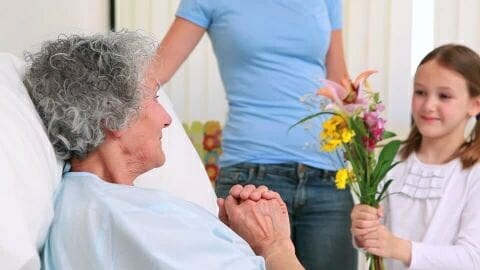
Gospel into Action: Approaching others.
 He greeted me crying He was an idol for me. I was proud to have a father like him, but one day he left us. My mother never explained why. I had to grow up in order to find out: he had another family. I didn’t want to see him anymore, not even when he came to visit us. One day a classmate who was in a similar situation told me that as a Christian, he had forgiven his father and had drawn a great joy from this. In order to do this concrete act, which was very difficult for me, I went to visit my father. He greeted me crying. There was no need for explanations. We had again become friends. (R.S. – Venezuela) The “troublesome” student One day a rather rebellious boy in my class had a fit, throwing a desk in the air; fortunately, there were no serious consequences. A colleague, who had always wanted to get rid of this “troublesome” student, had thought to proceed with a legal strategy, sending a grim report to the headmaster. On one hand, I wanted to avoid a further rebellion from the boy with a worsening of his psychological condition, but I also wanted to consider the opinion of my colleague and respect his suffering. The report was written, but we did it together, searching for the right words in a way that would not worsen the situation. The causes of his behavior came to light, and a greater comprehension of the problem was born. Now this colleague and I have a new understanding: he has decided to collaborate with me on projects for rehabilitating students at risk. (R.R. – Italia) The grandmother
He greeted me crying He was an idol for me. I was proud to have a father like him, but one day he left us. My mother never explained why. I had to grow up in order to find out: he had another family. I didn’t want to see him anymore, not even when he came to visit us. One day a classmate who was in a similar situation told me that as a Christian, he had forgiven his father and had drawn a great joy from this. In order to do this concrete act, which was very difficult for me, I went to visit my father. He greeted me crying. There was no need for explanations. We had again become friends. (R.S. – Venezuela) The “troublesome” student One day a rather rebellious boy in my class had a fit, throwing a desk in the air; fortunately, there were no serious consequences. A colleague, who had always wanted to get rid of this “troublesome” student, had thought to proceed with a legal strategy, sending a grim report to the headmaster. On one hand, I wanted to avoid a further rebellion from the boy with a worsening of his psychological condition, but I also wanted to consider the opinion of my colleague and respect his suffering. The report was written, but we did it together, searching for the right words in a way that would not worsen the situation. The causes of his behavior came to light, and a greater comprehension of the problem was born. Now this colleague and I have a new understanding: he has decided to collaborate with me on projects for rehabilitating students at risk. (R.R. – Italia) The grandmother  In our neighborhood there lived an elderly woman. She was alone. Every once in a while she came to ask us to read her the letters she received or to ask us to accompany her to collect her pension. On special occasions we invited her to our house, where she always felt at ease. Our children loved her too, and each time they welcomed her with joy: for them she was the “grandmother,” and for everyone she was the “least” of which the Gospel speaks. One day she suffered a stroke, and her neighbours immediately called us, almost as if we were her biological family. She remained in the hospital for two months, and we constantly assisted her. When she recovered, she accepted the offer to move to a home for the elderly. But we continued to look after her, with the collaboration of the others. Thanks to the grandmother, a great solidarity was put into motion in the hospital and in our neighborhood. (M. S. C. – Spagna)
In our neighborhood there lived an elderly woman. She was alone. Every once in a while she came to ask us to read her the letters she received or to ask us to accompany her to collect her pension. On special occasions we invited her to our house, where she always felt at ease. Our children loved her too, and each time they welcomed her with joy: for them she was the “grandmother,” and for everyone she was the “least” of which the Gospel speaks. One day she suffered a stroke, and her neighbours immediately called us, almost as if we were her biological family. She remained in the hospital for two months, and we constantly assisted her. When she recovered, she accepted the offer to move to a home for the elderly. But we continued to look after her, with the collaboration of the others. Thanks to the grandmother, a great solidarity was put into motion in the hospital and in our neighborhood. (M. S. C. – Spagna)
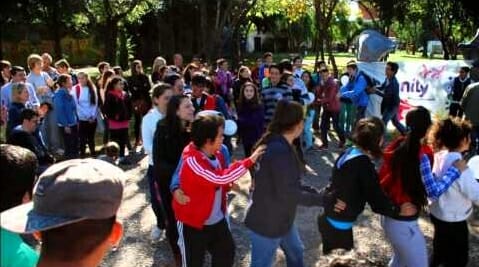
Post-retirement crisis? Never experienced it
 “I don’t feel the exhaustion, but probably just the lack of sleep, since I have slept five hours less than usual over the last five days. I have just returned from a school camp or rather, a work in progress camp for kids, as one of the educators of Teens for Unity of the Focolare. It was a fantastic adventure which, compared to other activities this year, has enlivened my daily routine, making me forget that I have entered that potentially critical post-retirement phase. The proposal to give a hand for those kids was enticing. Well, I thought, I may be retired, but I still have the energy and eagerness to keep going. The appointment was at nine in the morning in Borgo Don Bosco, a venue placed at our disposal by the Salesians. Slowly the kids arrived, 25 boys and girls in all, below 18 years of age. After the initial shyness a friendly atmosphere was immediately created, even if most of them had no idea whatsoever of what would come about or what to expect. The programme was full of surprises, as it should have been for an initiative with young people. But also a surprise was the hard work (so to say!), sweating together under the sun, or drenched with rain, to clear out the site of the camp. For three mornings, I was assigned the task of restoring a remote corner of the garden, abandoned for over 20 years. The grass had grown on that soil transported by wind and rain, concealing an entire asphalted pavement. Locker rooms and showers were still there, and had become the hiding place of spiders and insects so big they seemed like an alien race. Without counting the various objects abandoned in the grass that initially could not even be seen, it was practically a jungle to be razed to the ground. At mid-morning, I thought of telling the kids how I try to consider the work, and particularly that job. I must not have said more than 20-30 words in all. But I ended by confiding the real motive urging me to do this: the thought that “in that place, Baby Jesus would have come to play.” I understood from the silence that had descended on us, that the kids understood the sense of my words and had taken it to heart. And the light I saw shining in their youthful eyes was immediately transformed into concrete action, giving them a new drive in helping one another. This immediacy was a lesson for me, since, unlike these boys and girls I myself am rather slow in letting myself be convinced by what others tell me. At Sunday Mass, I found myself next to a boy who had worked by my side. On exchanging the sign of peace we both spontaneously reached out to one another, to declare that we were ready to give our lives for each other. As an adult this act would never have been so spontaneous towards another adult, but it was not so with him. Staying with these young people gave a new dimension to our future as one humanity, and gave me hope. In fact, I saw that they all had the desire and capacity to give. It is up to us to believe in them. Adolescence is a difficult age, but it is also the age in which one can build great horizons. There is no need for words, just start “doing” positive things with them. Perhaps this is why, on saying goodbye, some of them asked to come with me next Saturday to the district market, to collect the unsold fruit and vegetables for the poor people’s canteen.”
“I don’t feel the exhaustion, but probably just the lack of sleep, since I have slept five hours less than usual over the last five days. I have just returned from a school camp or rather, a work in progress camp for kids, as one of the educators of Teens for Unity of the Focolare. It was a fantastic adventure which, compared to other activities this year, has enlivened my daily routine, making me forget that I have entered that potentially critical post-retirement phase. The proposal to give a hand for those kids was enticing. Well, I thought, I may be retired, but I still have the energy and eagerness to keep going. The appointment was at nine in the morning in Borgo Don Bosco, a venue placed at our disposal by the Salesians. Slowly the kids arrived, 25 boys and girls in all, below 18 years of age. After the initial shyness a friendly atmosphere was immediately created, even if most of them had no idea whatsoever of what would come about or what to expect. The programme was full of surprises, as it should have been for an initiative with young people. But also a surprise was the hard work (so to say!), sweating together under the sun, or drenched with rain, to clear out the site of the camp. For three mornings, I was assigned the task of restoring a remote corner of the garden, abandoned for over 20 years. The grass had grown on that soil transported by wind and rain, concealing an entire asphalted pavement. Locker rooms and showers were still there, and had become the hiding place of spiders and insects so big they seemed like an alien race. Without counting the various objects abandoned in the grass that initially could not even be seen, it was practically a jungle to be razed to the ground. At mid-morning, I thought of telling the kids how I try to consider the work, and particularly that job. I must not have said more than 20-30 words in all. But I ended by confiding the real motive urging me to do this: the thought that “in that place, Baby Jesus would have come to play.” I understood from the silence that had descended on us, that the kids understood the sense of my words and had taken it to heart. And the light I saw shining in their youthful eyes was immediately transformed into concrete action, giving them a new drive in helping one another. This immediacy was a lesson for me, since, unlike these boys and girls I myself am rather slow in letting myself be convinced by what others tell me. At Sunday Mass, I found myself next to a boy who had worked by my side. On exchanging the sign of peace we both spontaneously reached out to one another, to declare that we were ready to give our lives for each other. As an adult this act would never have been so spontaneous towards another adult, but it was not so with him. Staying with these young people gave a new dimension to our future as one humanity, and gave me hope. In fact, I saw that they all had the desire and capacity to give. It is up to us to believe in them. Adolescence is a difficult age, but it is also the age in which one can build great horizons. There is no need for words, just start “doing” positive things with them. Perhaps this is why, on saying goodbye, some of them asked to come with me next Saturday to the district market, to collect the unsold fruit and vegetables for the poor people’s canteen.”
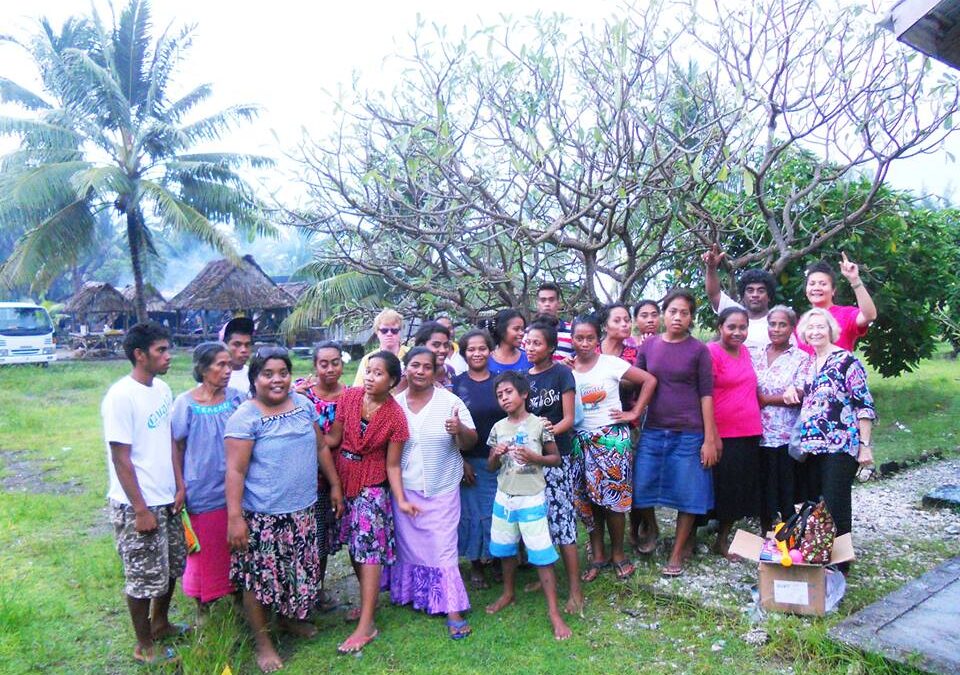
Focolare: voices from the five continents
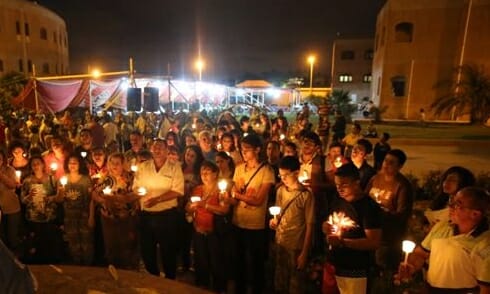 “This is the plea of the entire of the Middle East: ‘Stop the conflicts!’,” states Arlette Samman, a Lebanese, in the face of the unprecedented exodus of entire populations from Syria, Iraq and other countries: “For those who leave, it is an immense suffering, since they are going towards the unknown and feel that death is near. They find themselves without resources and security for the future of their families… otherwise none of them would have wanted to leave their own country.” “It is comforting to see the humanitarian response by many European countries,” continues Philippe who has lived in Egypt over the past 14 years. “But we also wish to give a voice to the Middle East as it anxiously awaits peace and the right “to live and not to die”. Both underline the importance of finding ever new solutions for brotherhood and above all, intensifying public opinion. This is the same perspective targeted by the peace mobilization that the Focolare Movement has currently relaunched together with all those working for the same aim. In Europe, solicited by the words of Pope Francis, and also by the new awareness on the part of the political authorities – as recently expressed by the EU Commission’s President, Jean-Claude Juncker – initiatives have doubled to welcome the refugees with private homes opening their doors, coordination of material aids and fund collections.
“This is the plea of the entire of the Middle East: ‘Stop the conflicts!’,” states Arlette Samman, a Lebanese, in the face of the unprecedented exodus of entire populations from Syria, Iraq and other countries: “For those who leave, it is an immense suffering, since they are going towards the unknown and feel that death is near. They find themselves without resources and security for the future of their families… otherwise none of them would have wanted to leave their own country.” “It is comforting to see the humanitarian response by many European countries,” continues Philippe who has lived in Egypt over the past 14 years. “But we also wish to give a voice to the Middle East as it anxiously awaits peace and the right “to live and not to die”. Both underline the importance of finding ever new solutions for brotherhood and above all, intensifying public opinion. This is the same perspective targeted by the peace mobilization that the Focolare Movement has currently relaunched together with all those working for the same aim. In Europe, solicited by the words of Pope Francis, and also by the new awareness on the part of the political authorities – as recently expressed by the EU Commission’s President, Jean-Claude Juncker – initiatives have doubled to welcome the refugees with private homes opening their doors, coordination of material aids and fund collections. 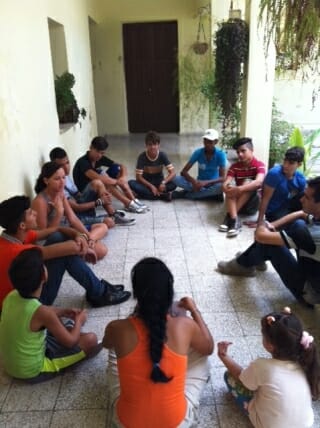 Practically the entire world will be present in Rome over the next days, with the 80 delegates from 36 countries, representatives of the respective geographical macro-areas: “Coming here is an occasion to meet our brothers and sisters operating for peace, and who continue to support us in difficult times.” This is the general state of mind of those coming from distressed areas. From Latin America, Maria Augusta De La Torre, gave us a view of other situations: “In Cuba people are full of great expectations and hope. On one hand is the ‘new friendship’ between Cuba and the USA, and on the other, the Catholic Church which in Cuba is more dynamic than ever. The Pope’s mediation and his next visit to the Island is boosting this revival.” As to the frontier conflict between Colombia and Venezuela she said: «It is a very painful situation. We went to the border and saw the suffering of the people who had to leave their homes and there is great uncertainty with regard to the future, suffering and rebellion in face of the what has happened. Smuggling has always existed, but now nobody knows what lies behind these forceful decisions. In Venezuela the people feel depressed and without hope. The members of the Movement find the strength that comes from living the Gospel and want to continue to bear witness to fraternity between these two peoples. » From Nigeria, Ruth Wambui Mburu, a Kenyan citizen, confided that the stronger commitment they have to face as a Focolare is the radical enforcement of separation between north and south, between Muslims and Christians, and ethnic groups. Their efforts and commitments consist in being testimonials of fraternity lived among these different groups. Georges Sserunkma, also from Nigeria, upon arriving in Rome precisely in this historic moment, said “I feel that this is really the unique home we all live in – seeing how the Church and the Movement take all these situations to heart, makes me breath a wider dimension and fills my heart with hope.”
Practically the entire world will be present in Rome over the next days, with the 80 delegates from 36 countries, representatives of the respective geographical macro-areas: “Coming here is an occasion to meet our brothers and sisters operating for peace, and who continue to support us in difficult times.” This is the general state of mind of those coming from distressed areas. From Latin America, Maria Augusta De La Torre, gave us a view of other situations: “In Cuba people are full of great expectations and hope. On one hand is the ‘new friendship’ between Cuba and the USA, and on the other, the Catholic Church which in Cuba is more dynamic than ever. The Pope’s mediation and his next visit to the Island is boosting this revival.” As to the frontier conflict between Colombia and Venezuela she said: «It is a very painful situation. We went to the border and saw the suffering of the people who had to leave their homes and there is great uncertainty with regard to the future, suffering and rebellion in face of the what has happened. Smuggling has always existed, but now nobody knows what lies behind these forceful decisions. In Venezuela the people feel depressed and without hope. The members of the Movement find the strength that comes from living the Gospel and want to continue to bear witness to fraternity between these two peoples. » From Nigeria, Ruth Wambui Mburu, a Kenyan citizen, confided that the stronger commitment they have to face as a Focolare is the radical enforcement of separation between north and south, between Muslims and Christians, and ethnic groups. Their efforts and commitments consist in being testimonials of fraternity lived among these different groups. Georges Sserunkma, also from Nigeria, upon arriving in Rome precisely in this historic moment, said “I feel that this is really the unique home we all live in – seeing how the Church and the Movement take all these situations to heart, makes me breath a wider dimension and fills my heart with hope.” 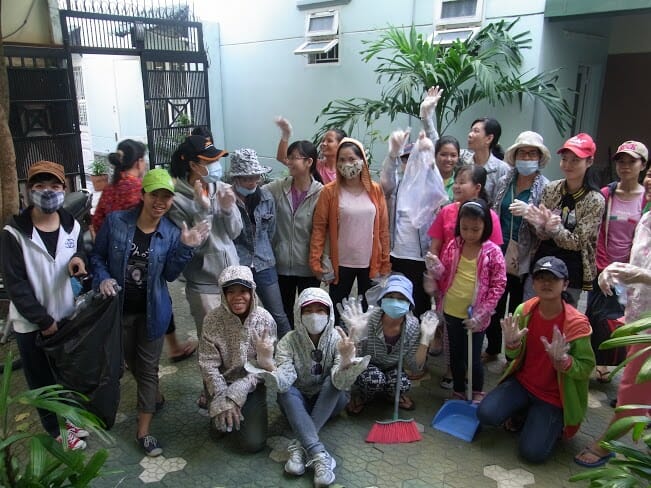 “Each of us has come with a heavy load on our shoulders,” affirms Marcella Sartarelli from Vietnam, “but also with hope in believing that “the world is reaching out to unity.” One of these signs for her is also “the openness we saw in Vietnam, for example in our contacts with the Church. There is a new awakening, which is giving more hope. All we know about Vietnam is the war of 30 years ago, but less about what Vietnam is today – a country undergoing rapid development. Some passages of the encyclical Laudato Si’ seem to trace a precise profile of this country: a fast advancing economy, with ultra-modern cities and at the same time, the countryside abandoned to pollution. With a group of young people in a village near Hanoi, where the situation is critical, we are documenting this hidden problem, but at the same time, rolling up our sleeves to clean up.”
“Each of us has come with a heavy load on our shoulders,” affirms Marcella Sartarelli from Vietnam, “but also with hope in believing that “the world is reaching out to unity.” One of these signs for her is also “the openness we saw in Vietnam, for example in our contacts with the Church. There is a new awakening, which is giving more hope. All we know about Vietnam is the war of 30 years ago, but less about what Vietnam is today – a country undergoing rapid development. Some passages of the encyclical Laudato Si’ seem to trace a precise profile of this country: a fast advancing economy, with ultra-modern cities and at the same time, the countryside abandoned to pollution. With a group of young people in a village near Hanoi, where the situation is critical, we are documenting this hidden problem, but at the same time, rolling up our sleeves to clean up.” 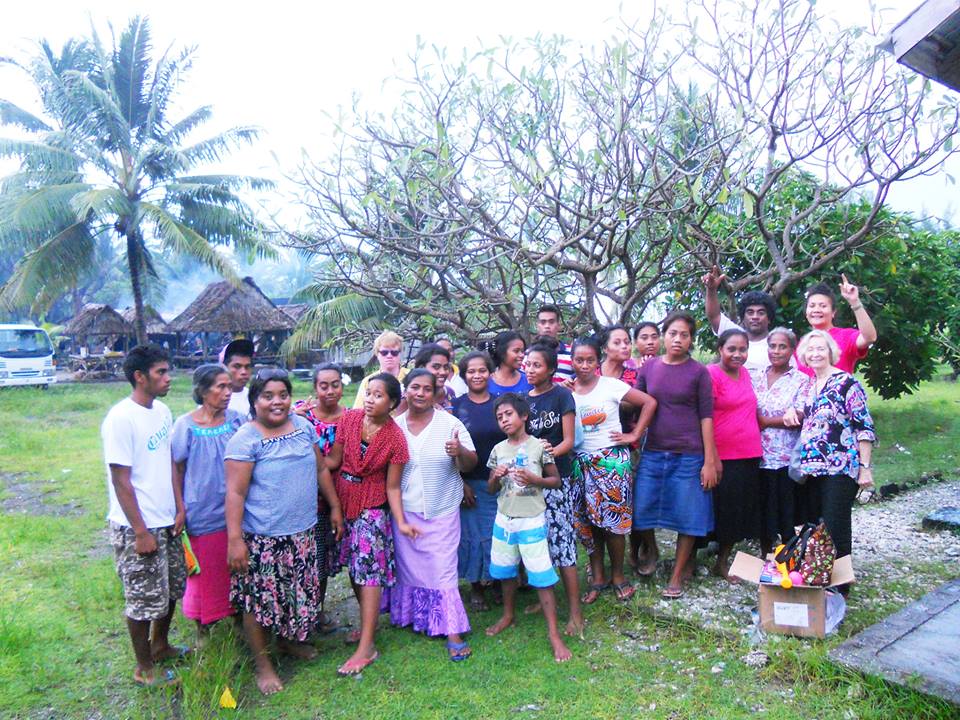 Also in Oceania, environmental problems are strongly felt: “In New Zealand, the young people promoted the action Give one hour of your power, inviting everyone, on the day dedicated to the care of the planet, to switch off the electricity for an hour,” Augustine Doronila recounts, “while for years now there has been an ongoing action to help the population of Kiribati, an archipelago at risk of extinction due to the rising sea levels.” Reflections and sharing of experiences will mark the two weeks meeting, from 14 to 27 September 2015, dedicated to the word “unity”: not only a point of the focolarino spirituality, but a key to the spiritual and social action of the Movement, the word that synthesizes its message.
Also in Oceania, environmental problems are strongly felt: “In New Zealand, the young people promoted the action Give one hour of your power, inviting everyone, on the day dedicated to the care of the planet, to switch off the electricity for an hour,” Augustine Doronila recounts, “while for years now there has been an ongoing action to help the population of Kiribati, an archipelago at risk of extinction due to the rising sea levels.” Reflections and sharing of experiences will mark the two weeks meeting, from 14 to 27 September 2015, dedicated to the word “unity”: not only a point of the focolarino spirituality, but a key to the spiritual and social action of the Movement, the word that synthesizes its message.
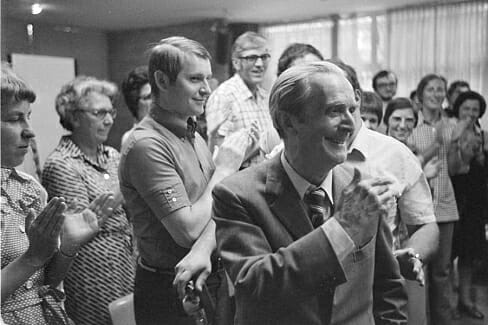
The family, an irreplaceable resource for society
The document that will guide the sessions of the Synod of the Family in the Vatican from 4 to 25 October, cites: «still today, the family remains and will always remain as the fundamental and irreplaceable pillar of social life. In fact, in the family multiple differences coexist, through which relationships are established, and grow in the confrontation and mutual acceptance between generations. This is why the family represents a founding value and a resource for the harmonic development of every human society as affirmed by the Council: “The family is a school of a richer humanity […], and the fundament of society.” ( GS,52 )».  The importance of the family and the spouses are thus underlined. To this regard Igino Giordani wrote:«The spouses have an explosive mission in the reform of society, and endow marriage with its original value as a generator of life – due to the sacrament – of both body and soul: the value of the most suitable tool that can revive the soul of society, to bridge the world and the Church». At another point, Giordani explains how the family implements this role: «The family does not retreat within itself, as in a fort, but expands like a cell that lives inasmuch as it co-exists with its brethren. From this communion which implies the obligations of apostolates, charity and justice towards society, we can see the extensiveness of the spiritual and social tasks of marriage.» Giordani continues to underline how only the family in its form and constitution can generate society and the Church: «The new society is born, from the natural and sacred source of the family, the human and divine features of which are briefly delineated in the Gospel. The family, structured according to Christian concepts, gives rise to the Church and the State, the city of God and the city of man: a dual citizenship that brings about the full maturation of the life of redeemed humanity.» Thus a fundamental bond unites society and the family. «Society today needs the family for its rebirth. Otherwise, it is doomed to a catastrophic future, because the maxim of love and unity is no longer put into practice.» Edited by the Igino Giordani Centre Excerpts from: Igino Giordani, La rivoluzione cristiana/The Christian Revolution, Città Nuova Rome, 1969; Igino Giordani, Family, Society, New City Publishers, Rome, 1990; Igino Giordani, Letter, 1967; Igino Giordani, Speech for the New Families 1974.
The importance of the family and the spouses are thus underlined. To this regard Igino Giordani wrote:«The spouses have an explosive mission in the reform of society, and endow marriage with its original value as a generator of life – due to the sacrament – of both body and soul: the value of the most suitable tool that can revive the soul of society, to bridge the world and the Church». At another point, Giordani explains how the family implements this role: «The family does not retreat within itself, as in a fort, but expands like a cell that lives inasmuch as it co-exists with its brethren. From this communion which implies the obligations of apostolates, charity and justice towards society, we can see the extensiveness of the spiritual and social tasks of marriage.» Giordani continues to underline how only the family in its form and constitution can generate society and the Church: «The new society is born, from the natural and sacred source of the family, the human and divine features of which are briefly delineated in the Gospel. The family, structured according to Christian concepts, gives rise to the Church and the State, the city of God and the city of man: a dual citizenship that brings about the full maturation of the life of redeemed humanity.» Thus a fundamental bond unites society and the family. «Society today needs the family for its rebirth. Otherwise, it is doomed to a catastrophic future, because the maxim of love and unity is no longer put into practice.» Edited by the Igino Giordani Centre Excerpts from: Igino Giordani, La rivoluzione cristiana/The Christian Revolution, Città Nuova Rome, 1969; Igino Giordani, Family, Society, New City Publishers, Rome, 1990; Igino Giordani, Letter, 1967; Igino Giordani, Speech for the New Families 1974.
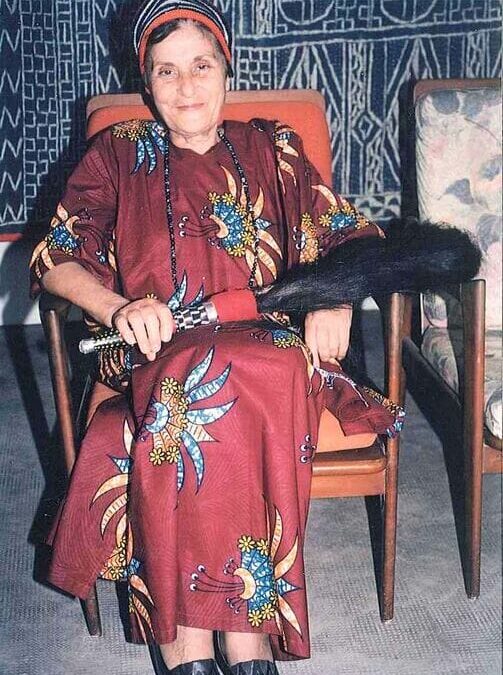
Fontem: Farewell to Pia Fatica
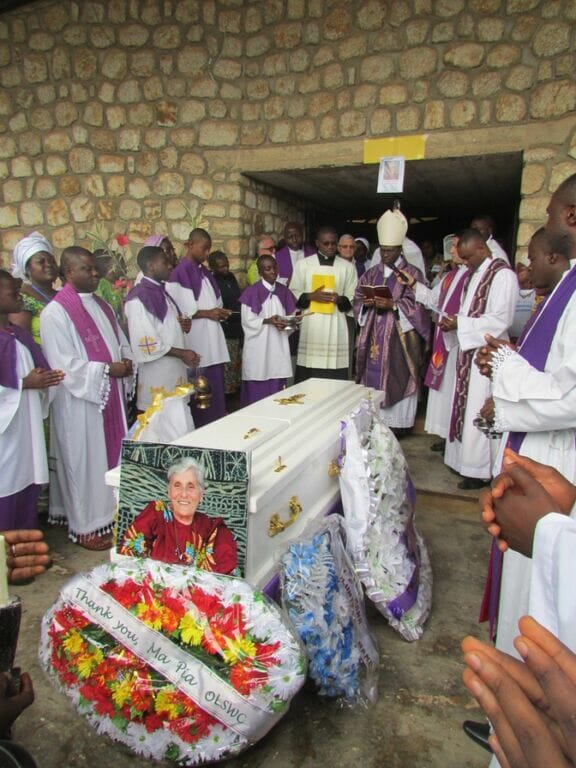 Monday, 31 August. At this time it is not easy to reach Fontem, the Bangwa village in the midst of the Cameroon forest. This is, in fact, the heart of the rainy season and the road is muddy and practicably impossible to pass at some points. Nonetheless, a continuous procession of people have come to pay homage to Pia Fatica. Today there are at least a thousand people from all over the region saying goodbye to this extraordinary Italian woman who decided to live here 48 years ago. The funeral rite is celebrated by Bishop Andrew Nkea who began by saying: «As a bishop and as a Bangwa citizen, I can say that Pia has lived all the beatitudes. This means that for her, today is the day of her birth in Heaven.» These authoritative words confirm what in 2000 the traditional locals had provided for, upon awarding Pia with the title of Mafua Nkong (Queen of Love). But who is this woman, who at 38 chose to pass the rest of her life in Africa, and also requested to be buried there? Pia was born in Campobasso (Italy) in 1929. An obstetrician, a prestigious and profitable profession even in those times, she read an article in the Osservatore Romano that a mission was about to start in Cameroon, that would also see to the construction of a hospital. She felt involved, at first hand, and without even knowing what Movement planned the project, decided to leave everything behind to go and give a hand. Upon reaching Fontem, she found out that due to a widespread infant mortality, obstetrics was an absolute priority. She made the decision with all her heart, and delved deeply into the tradition of these animistic people who, anguished by the death of their newborns, turned to the Catholic bishop for help.
Monday, 31 August. At this time it is not easy to reach Fontem, the Bangwa village in the midst of the Cameroon forest. This is, in fact, the heart of the rainy season and the road is muddy and practicably impossible to pass at some points. Nonetheless, a continuous procession of people have come to pay homage to Pia Fatica. Today there are at least a thousand people from all over the region saying goodbye to this extraordinary Italian woman who decided to live here 48 years ago. The funeral rite is celebrated by Bishop Andrew Nkea who began by saying: «As a bishop and as a Bangwa citizen, I can say that Pia has lived all the beatitudes. This means that for her, today is the day of her birth in Heaven.» These authoritative words confirm what in 2000 the traditional locals had provided for, upon awarding Pia with the title of Mafua Nkong (Queen of Love). But who is this woman, who at 38 chose to pass the rest of her life in Africa, and also requested to be buried there? Pia was born in Campobasso (Italy) in 1929. An obstetrician, a prestigious and profitable profession even in those times, she read an article in the Osservatore Romano that a mission was about to start in Cameroon, that would also see to the construction of a hospital. She felt involved, at first hand, and without even knowing what Movement planned the project, decided to leave everything behind to go and give a hand. Upon reaching Fontem, she found out that due to a widespread infant mortality, obstetrics was an absolute priority. She made the decision with all her heart, and delved deeply into the tradition of these animistic people who, anguished by the death of their newborns, turned to the Catholic bishop for help.
YouTube Video
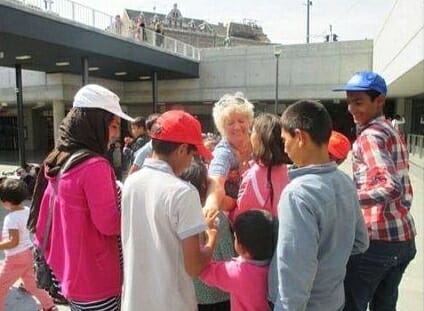
Refugees in Hungary
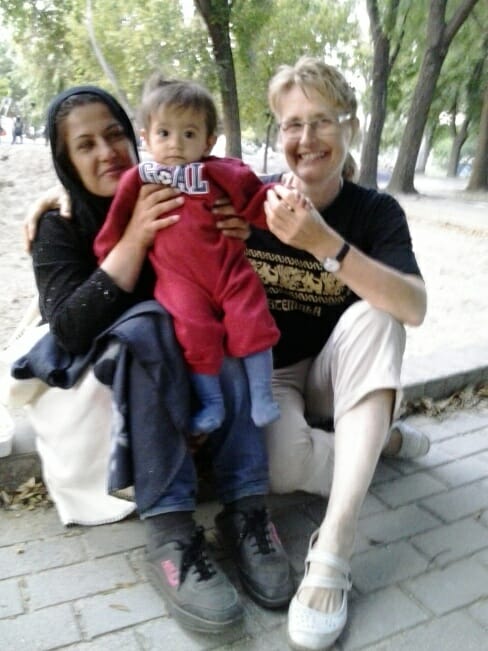 Viktoria Bakacsi and Laszlo Vizsolyi from the Focolare Movement in Hungary write: “Every day we encounter suffering under so many guises, right outside the doors of our homes. We listened to the words of Pope Francis and are now trying to put them into practice even more.” “For months,” they write, “there has been a continual influx of refugees. Some two thousand people arrive in Hungary every day: families with children, exhausted. Despite the general chaos, many people are stepping out and giving a helping hand, people belonging to civic groups and church organisations.”
Viktoria Bakacsi and Laszlo Vizsolyi from the Focolare Movement in Hungary write: “Every day we encounter suffering under so many guises, right outside the doors of our homes. We listened to the words of Pope Francis and are now trying to put them into practice even more.” “For months,” they write, “there has been a continual influx of refugees. Some two thousand people arrive in Hungary every day: families with children, exhausted. Despite the general chaos, many people are stepping out and giving a helping hand, people belonging to civic groups and church organisations.” 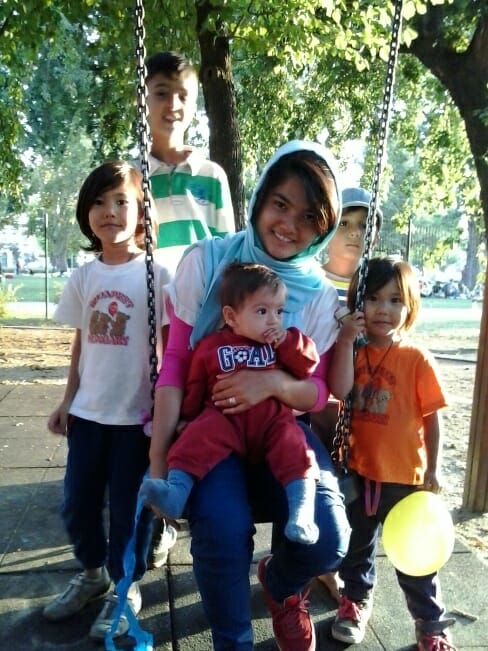 The Focolare Movement in Hungary has also gone to work. Viktoria and Laszlo continue: “We shared ideas and experiences and with the Apostolic Nuncio, Alberto Bottari de Castello, have become involved in gathering and coordinating efforts so that things can run more smoothly and efficiently. We are working closely with several religious orders, including the Jesuits who already have a program in place, and groups like the Community of Sant’Egidio, which not only has the infrastructure and experience, but also legal expertise. The work undertaken also aims at promoting openness and welcome through an educational program which we started during a summer camp with 230 young people. Focolare members who are active in parish life go every day to the Keleti Train Station. One of them writes: “I’ve been in the midst of refugees for two months. There are a lot of us helping. There are so many children, such desperate people… I try to see the face of Jesus in each one of them, and this gives me strength. They are so grateful for every little help they receive, and the children rejoice over even the smallest gifts.” A psychologist writes: “I try to share my professional skills by supporting the many volunteers.” A focolarino priest writes: “On Thursday we had our meeting with priests. After reading this month’s Word of Life, six of us went to the Station to help the people.” A young woman: “After the Youth for a United World Camp we went to the refugees to help care for the children. There were twenty of us. Around 70 children and families gathered around us, since we were dressed up as clowns. We played, drew pictures and found every way possible to communicate with them. Many of them don’t speak English, and many of them tried to teach us a few Arabic words. We will continue to go once a week.”
The Focolare Movement in Hungary has also gone to work. Viktoria and Laszlo continue: “We shared ideas and experiences and with the Apostolic Nuncio, Alberto Bottari de Castello, have become involved in gathering and coordinating efforts so that things can run more smoothly and efficiently. We are working closely with several religious orders, including the Jesuits who already have a program in place, and groups like the Community of Sant’Egidio, which not only has the infrastructure and experience, but also legal expertise. The work undertaken also aims at promoting openness and welcome through an educational program which we started during a summer camp with 230 young people. Focolare members who are active in parish life go every day to the Keleti Train Station. One of them writes: “I’ve been in the midst of refugees for two months. There are a lot of us helping. There are so many children, such desperate people… I try to see the face of Jesus in each one of them, and this gives me strength. They are so grateful for every little help they receive, and the children rejoice over even the smallest gifts.” A psychologist writes: “I try to share my professional skills by supporting the many volunteers.” A focolarino priest writes: “On Thursday we had our meeting with priests. After reading this month’s Word of Life, six of us went to the Station to help the people.” A young woman: “After the Youth for a United World Camp we went to the refugees to help care for the children. There were twenty of us. Around 70 children and families gathered around us, since we were dressed up as clowns. We played, drew pictures and found every way possible to communicate with them. Many of them don’t speak English, and many of them tried to teach us a few Arabic words. We will continue to go once a week.”  “We especially noticed the difficulty in communicating and the lack of information available. A focolarina who works in collaboration with the Association of the Order of Malta, started producing signs with useful information. She finds someone who speaks Arabic to translate them. We are also continuing to help out in Szeged where refugees are continually arriving. Besides our regular collections, we have been brought several boxes of leftover fruit. One of us, a police woman, goes to help the women and children in the camps at the end of her workday.” “We realise that what we are doing is only a drop in the ocean,” they conclude, “but we wouldn’t want that drop to be missing.”
“We especially noticed the difficulty in communicating and the lack of information available. A focolarina who works in collaboration with the Association of the Order of Malta, started producing signs with useful information. She finds someone who speaks Arabic to translate them. We are also continuing to help out in Szeged where refugees are continually arriving. Besides our regular collections, we have been brought several boxes of leftover fruit. One of us, a police woman, goes to help the women and children in the camps at the end of her workday.” “We realise that what we are doing is only a drop in the ocean,” they conclude, “but we wouldn’t want that drop to be missing.”
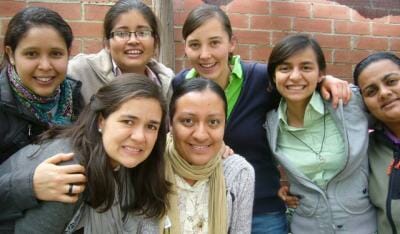
Young religious in Rome. The joy of consecrated life
 The objectives set by the 4,000 consecrated youth who will meet in Rome from 15-19 September is to achieve a formative experience through the biblical, theological-charismatic and ecclesiological in-depth study on consecrated life, and to have a concrete possibility to share their reality, wishes and expectations, celebrating and testifying to the beauty of their vocation. They will come from all over the world (countries like Iran, the Philippines, Ivory Coast, Zimbabwe) to take part in the World Day of Young Religious. Organized by the Congregation for the Institutes of Consecrated Life and Societies of Apostolic Life, the event will be held in the context of the Year of Consecrated Life. The calendar is varied and intense. In the morning the youth will meet in the Paul VI Hall in the Vatican to listen and reflect on the themes about vocations, fraternal life and the missions. In the afternoon they will meet in various parts of Rome to hold dialogue and sharing sessions, and in the evening they will have the chance to participate in the itineraries offered: the path of the announcement (missionary night in the centre of Rome), the path of encounter (meetings with social-ecclesiastical organisations: Caritas, St. Egidio community, Talitha Kum), the path of beauty (guided tours of the Vatican Museums and the Sistine Chapel). Some open-air events with the public will be: the prayer vigil in St. Peter’s Square (15 September at 20.30) presided by the Archbishop Secretary of the Congregation for the Institutes of Consecrated Life, His Excellency, Bishop José Rodríguez Carballo; the mass in St. Peter’s Basilica (19 September at 11.30) presided by the Prefect of the Congregation, His Excellency, Cardinal João Braz de Aviz; soiree of music and testimonials in St. Peter’s Square (18 September at 20.30). There will also be a meeting with Pope Francis during the general audience on Wednesday, 16 September. On this occasion, all those present will receive as a gift, the book entitled Love means giving all – Testimonials, edited in seven languages. Published by the Vie Consacrée Association and in Italian by Città Nuova, the book, upon its release, was presented to the Holy Father who expressed his deep appreciation for the new, fresh and attractive vision of consecrated life, and encouraged its widespread diffusion. Click here to see the programme of the event Source: New City publishers
The objectives set by the 4,000 consecrated youth who will meet in Rome from 15-19 September is to achieve a formative experience through the biblical, theological-charismatic and ecclesiological in-depth study on consecrated life, and to have a concrete possibility to share their reality, wishes and expectations, celebrating and testifying to the beauty of their vocation. They will come from all over the world (countries like Iran, the Philippines, Ivory Coast, Zimbabwe) to take part in the World Day of Young Religious. Organized by the Congregation for the Institutes of Consecrated Life and Societies of Apostolic Life, the event will be held in the context of the Year of Consecrated Life. The calendar is varied and intense. In the morning the youth will meet in the Paul VI Hall in the Vatican to listen and reflect on the themes about vocations, fraternal life and the missions. In the afternoon they will meet in various parts of Rome to hold dialogue and sharing sessions, and in the evening they will have the chance to participate in the itineraries offered: the path of the announcement (missionary night in the centre of Rome), the path of encounter (meetings with social-ecclesiastical organisations: Caritas, St. Egidio community, Talitha Kum), the path of beauty (guided tours of the Vatican Museums and the Sistine Chapel). Some open-air events with the public will be: the prayer vigil in St. Peter’s Square (15 September at 20.30) presided by the Archbishop Secretary of the Congregation for the Institutes of Consecrated Life, His Excellency, Bishop José Rodríguez Carballo; the mass in St. Peter’s Basilica (19 September at 11.30) presided by the Prefect of the Congregation, His Excellency, Cardinal João Braz de Aviz; soiree of music and testimonials in St. Peter’s Square (18 September at 20.30). There will also be a meeting with Pope Francis during the general audience on Wednesday, 16 September. On this occasion, all those present will receive as a gift, the book entitled Love means giving all – Testimonials, edited in seven languages. Published by the Vie Consacrée Association and in Italian by Città Nuova, the book, upon its release, was presented to the Holy Father who expressed his deep appreciation for the new, fresh and attractive vision of consecrated life, and encouraged its widespread diffusion. Click here to see the programme of the event Source: New City publishers
Young religious in Rome. The joy of consecrated life
Consecrated men and women from all over the world (countries such as Iran, the Philippines, Ivory Coast, Zimbabwe) will be arriving in Rome to participate in the World Day of Young Religious. The event is organised by the Congregation for the Institutes of Consecrated Life and Societies of Apostolic Life within the context of the Year of Consecrated Life.
- Prayer vigil in St. Peter’s Square (15 September at 20.30)
- Meeting with Pope Francis during the general audience (Wednesday 16 September)
- Mass in St. Peter’s Basilica (19 September at30)
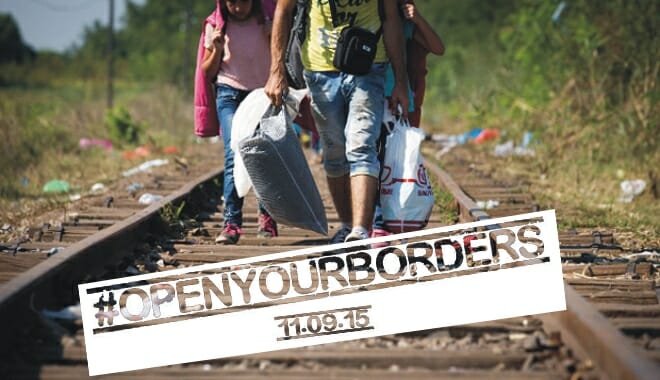
We want peace and unity among the peoples of the world
 Reduce public funding of weapons; work at the root level of inequality, to counter misery; revise current models of governance; adopt a model of organised legality in opposition to criminality; guarantee universal primary education. These are the five main points of the appeal made by the young people of the Focolare’s Youth for a United World (YUW) to national parliaments, the European Parliament, the National Commissions of UNESCO and the United Nations. On March 12th of this year, 350 young people representing 39 countries presented their appeal to the Chamber of Deputies of the Italian Parliament. Their words have great resonance these days when faced by a humanitarian drama that can wait no longer for political reflections or national and international bureaucracies: “We are well aware of the global scene that is dotted by numerous conflicts, which cause migrations of people who are fleeing from violence, extreme poverty, hunger and social injustice in their own lands. These deep wounds concern all of us directly and urge us to find concrete solutions that are personally engaging.” They add: “Personal good will, will never produce universal brotherhood. We are convinced, in fact, that political action, directed at intervention into the causes of the conflicts and into the conditions that generate inequality, is required.” In their appeal the young people not only denounced these causes but presented explicitly clear requests. In these times when we are immersed in such a pressing humanitarian drama, the YUW also raises its voice to say: “We want peace and unity among the peoples of the world.” They invite everyone to spread the appeal, presenting it as soon as possible to international, national and local organisations (UN, UNESCO, Heads of State, Parliaments, mayors, religious leaders, etc.) They have chosen September 11th to “flood the social media with the Hashtag #OpenYourBorders.” They will also increase concrete activities and take part in those that are already underway through the United World Project. Photos, personal testimonies, events and videos in favour of welcome and peace can be posted on Facebook at ‘Dialogue to unlock’ or at info@unitedworldproject.org. The proceeds my be given to the local Caritas or else sent as a donation to the Youth for a United World Fund. https://www.youtube.com/watch?v=gcAv0Lr34bw
Reduce public funding of weapons; work at the root level of inequality, to counter misery; revise current models of governance; adopt a model of organised legality in opposition to criminality; guarantee universal primary education. These are the five main points of the appeal made by the young people of the Focolare’s Youth for a United World (YUW) to national parliaments, the European Parliament, the National Commissions of UNESCO and the United Nations. On March 12th of this year, 350 young people representing 39 countries presented their appeal to the Chamber of Deputies of the Italian Parliament. Their words have great resonance these days when faced by a humanitarian drama that can wait no longer for political reflections or national and international bureaucracies: “We are well aware of the global scene that is dotted by numerous conflicts, which cause migrations of people who are fleeing from violence, extreme poverty, hunger and social injustice in their own lands. These deep wounds concern all of us directly and urge us to find concrete solutions that are personally engaging.” They add: “Personal good will, will never produce universal brotherhood. We are convinced, in fact, that political action, directed at intervention into the causes of the conflicts and into the conditions that generate inequality, is required.” In their appeal the young people not only denounced these causes but presented explicitly clear requests. In these times when we are immersed in such a pressing humanitarian drama, the YUW also raises its voice to say: “We want peace and unity among the peoples of the world.” They invite everyone to spread the appeal, presenting it as soon as possible to international, national and local organisations (UN, UNESCO, Heads of State, Parliaments, mayors, religious leaders, etc.) They have chosen September 11th to “flood the social media with the Hashtag #OpenYourBorders.” They will also increase concrete activities and take part in those that are already underway through the United World Project. Photos, personal testimonies, events and videos in favour of welcome and peace can be posted on Facebook at ‘Dialogue to unlock’ or at info@unitedworldproject.org. The proceeds my be given to the local Caritas or else sent as a donation to the Youth for a United World Fund. https://www.youtube.com/watch?v=gcAv0Lr34bw
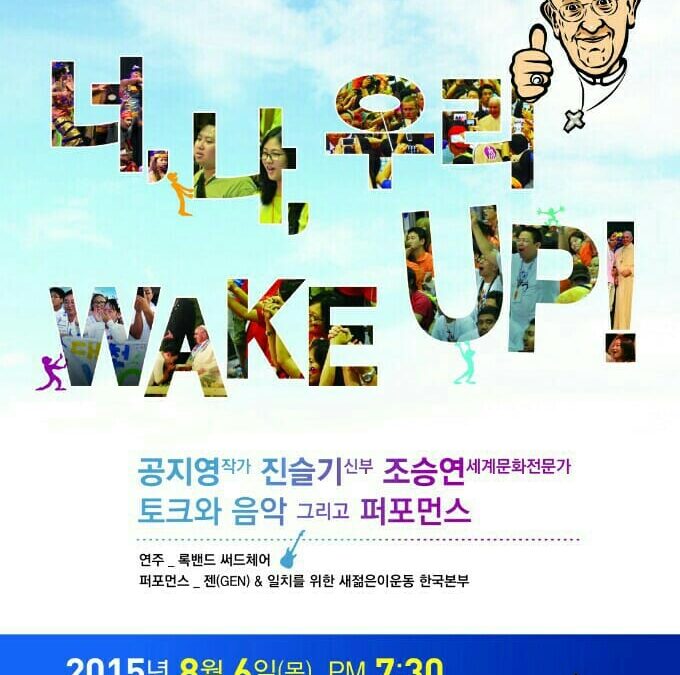
Korean young people: A voice of peace
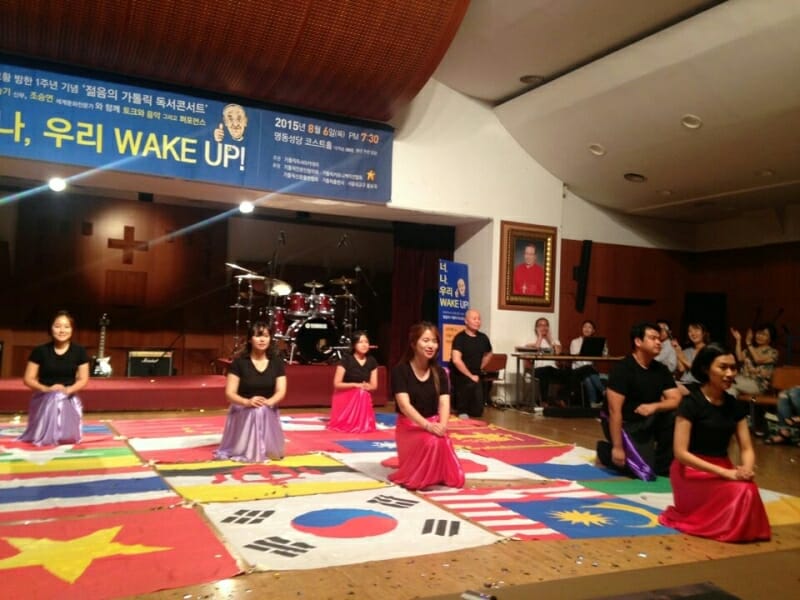 The Book Talk Concert is an event supported by the Korean Bishops Conference. It began three years ago with the goal of spreading the faith through monthly cultural events with popular artists and writers, and also newcomers. In August the Book Concert offered a special edition for young people lifting up the message of Pope Francis to today’s Korean society: “You, me, us – wake up!” The event was held at the beginning of the month in the Cathedral of Myeungdong where the Pope had celebrated the 2014 Mass for the Peace and Reconciliation of the Country . The main guests included authors such as: Kong Ji-young, a favourite author the young; Father Jin Seul-ki, a young priest; and Cho Seung-yeon, a young expert in global culture. ”Wake up” was the heart of the Pope’s message to the Asian young people gathered in Korea last year, and this year’s message was: Wake up and rise, get moving in favour society and your neighbours, especially the suffering.”
The Book Talk Concert is an event supported by the Korean Bishops Conference. It began three years ago with the goal of spreading the faith through monthly cultural events with popular artists and writers, and also newcomers. In August the Book Concert offered a special edition for young people lifting up the message of Pope Francis to today’s Korean society: “You, me, us – wake up!” The event was held at the beginning of the month in the Cathedral of Myeungdong where the Pope had celebrated the 2014 Mass for the Peace and Reconciliation of the Country . The main guests included authors such as: Kong Ji-young, a favourite author the young; Father Jin Seul-ki, a young priest; and Cho Seung-yeon, a young expert in global culture. ”Wake up” was the heart of the Pope’s message to the Asian young people gathered in Korea last year, and this year’s message was: Wake up and rise, get moving in favour society and your neighbours, especially the suffering.”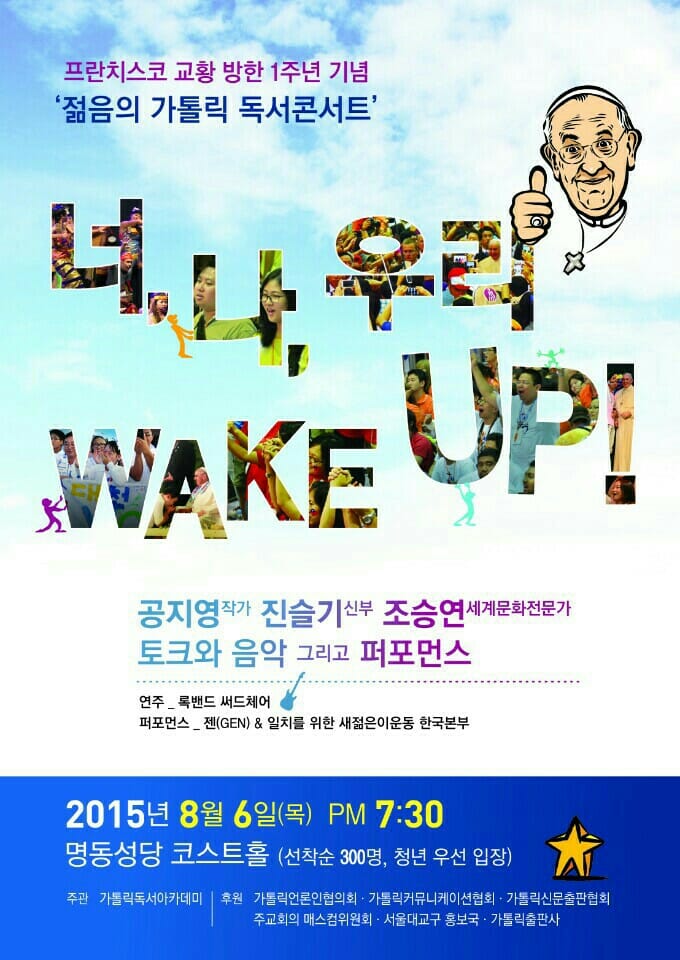 The writers talked about their personal awakenings, as they responded to the questions of the young people on how to face and overcome problems of faith and everyday life. There was a concert by Third Chair, followed by discussion and experiences. There was also a deep moment of prayer for peace, using the words of Pope Francis. Twenty flags from several Asian countries painted a scene of brotherhood and the overcoming of age-old hostilities among nations. One young man from the Focolare recounts: “I worked on two teams, scenario and art. We performed what we had prepared for last year’s Asian Youth Day, which concluded the Book Concert. There were difficulties and tension at times, but we always aimed for an atmosphere of mutual understanding, also between generations, knowing that this was the only way the event could be a gift for the young people who had been invited.” Another young volunteer commented: “Through our often hidden service, we were able to relive last year’s visit of the Pope and to convey that experience to many other young people.”
The writers talked about their personal awakenings, as they responded to the questions of the young people on how to face and overcome problems of faith and everyday life. There was a concert by Third Chair, followed by discussion and experiences. There was also a deep moment of prayer for peace, using the words of Pope Francis. Twenty flags from several Asian countries painted a scene of brotherhood and the overcoming of age-old hostilities among nations. One young man from the Focolare recounts: “I worked on two teams, scenario and art. We performed what we had prepared for last year’s Asian Youth Day, which concluded the Book Concert. There were difficulties and tension at times, but we always aimed for an atmosphere of mutual understanding, also between generations, knowing that this was the only way the event could be a gift for the young people who had been invited.” Another young volunteer commented: “Through our often hidden service, we were able to relive last year’s visit of the Pope and to convey that experience to many other young people.”
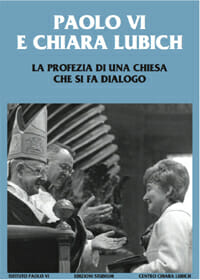
Paolo VI and Chiara Lubich
 The presentation of the book compiled in co-partnership between Paul VI Institute and Chiara Lubich Centre and published by Stadium Press, will be held on September 27, 2015 at the Mariapolis Centre of Castel Gandolfo, Italy, Via S.G.Battisti da La Salle,. This date has been chosen because of its proximity to the anniversary of Blessed Paul VI, which is celebrated on September 26th. There will be two sessions in the programme. Following the opening remarks by Maria Voce, President of the Focolare Movement, and by Father Angelo Maffeis, President of the Paul VI Institute, a roundtable discussion will begin with Bishop Vincenzo Zani, Secretary of the Pontifical Council for Catholic Education; Dr. Giulia Paola Di Nicola and Bishop Marcello Semeraro, bishop of Albano Laziale, Italy; and Alessandro De Carolis moderator. Meditazione in musica sulla vita del beato Paolo VI.This will be follwed by a concert featuring the piano music of Chopin, played by Father Carlo José Seno, titled Open to the World. Musical meditations on the life of Blessed Paul VI.
The presentation of the book compiled in co-partnership between Paul VI Institute and Chiara Lubich Centre and published by Stadium Press, will be held on September 27, 2015 at the Mariapolis Centre of Castel Gandolfo, Italy, Via S.G.Battisti da La Salle,. This date has been chosen because of its proximity to the anniversary of Blessed Paul VI, which is celebrated on September 26th. There will be two sessions in the programme. Following the opening remarks by Maria Voce, President of the Focolare Movement, and by Father Angelo Maffeis, President of the Paul VI Institute, a roundtable discussion will begin with Bishop Vincenzo Zani, Secretary of the Pontifical Council for Catholic Education; Dr. Giulia Paola Di Nicola and Bishop Marcello Semeraro, bishop of Albano Laziale, Italy; and Alessandro De Carolis moderator. Meditazione in musica sulla vita del beato Paolo VI.This will be follwed by a concert featuring the piano music of Chopin, played by Father Carlo José Seno, titled Open to the World. Musical meditations on the life of Blessed Paul VI.
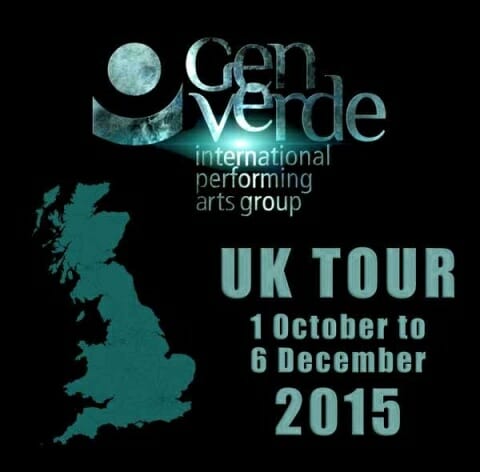
Gen Verde UK Tour
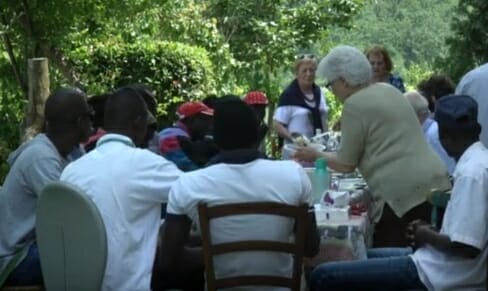
Refugees: a new commitment and greater collaborative effort
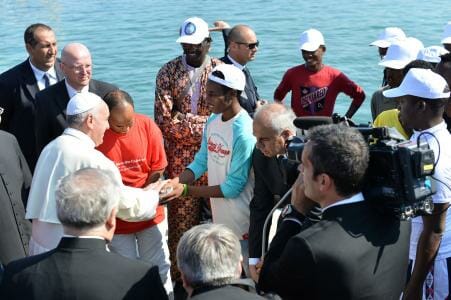 “Often we are closed in ourselves and create many inaccessible and inhospitable islands. Even the most elementary human relations sometimes create realities that are unable to open to each other: a closed couple, a closed family, a closed group, a closed parish, a closed homeland… And this does not come from God!” Pope Francis’s words at the Angelus on 6th September resound strongly, in his call for concrete action to support the hundreds of thousands of refugees forced to leave their homes: “As we draw close to the Jubilee of Mercy, I appeal to parishes, to religious communities, to monasteries and convents and all the shrines of Europe to show the concreteness of the Gospel and take in a refugee family”. In the name of the Focolare Movement, Maria Voce has expressed “gratitude” for this courageous and practical appeal by the Holy Father” and stressed the decision to do what he asks by “opening the doors of our houses and centres to receive people”.
“Often we are closed in ourselves and create many inaccessible and inhospitable islands. Even the most elementary human relations sometimes create realities that are unable to open to each other: a closed couple, a closed family, a closed group, a closed parish, a closed homeland… And this does not come from God!” Pope Francis’s words at the Angelus on 6th September resound strongly, in his call for concrete action to support the hundreds of thousands of refugees forced to leave their homes: “As we draw close to the Jubilee of Mercy, I appeal to parishes, to religious communities, to monasteries and convents and all the shrines of Europe to show the concreteness of the Gospel and take in a refugee family”. In the name of the Focolare Movement, Maria Voce has expressed “gratitude” for this courageous and practical appeal by the Holy Father” and stressed the decision to do what he asks by “opening the doors of our houses and centres to receive people”.
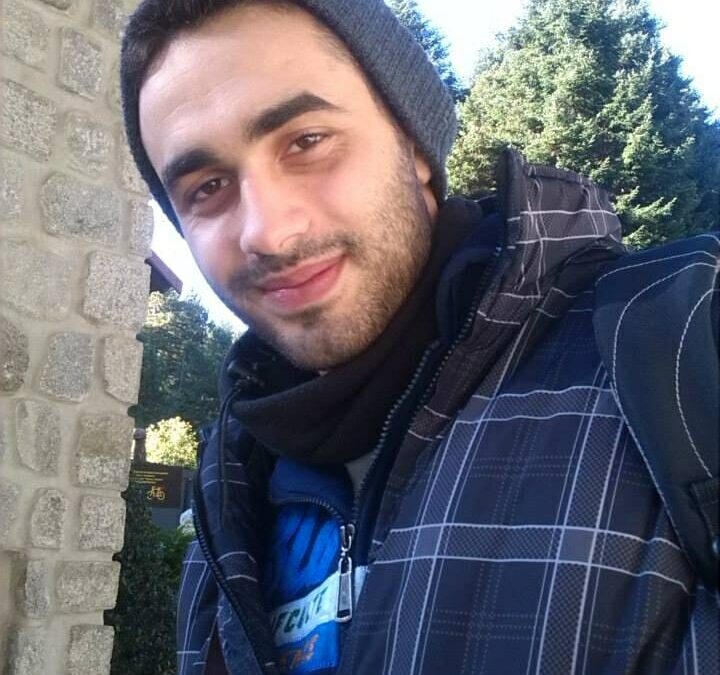
Vincenzo’s decision to look after young cancer patients
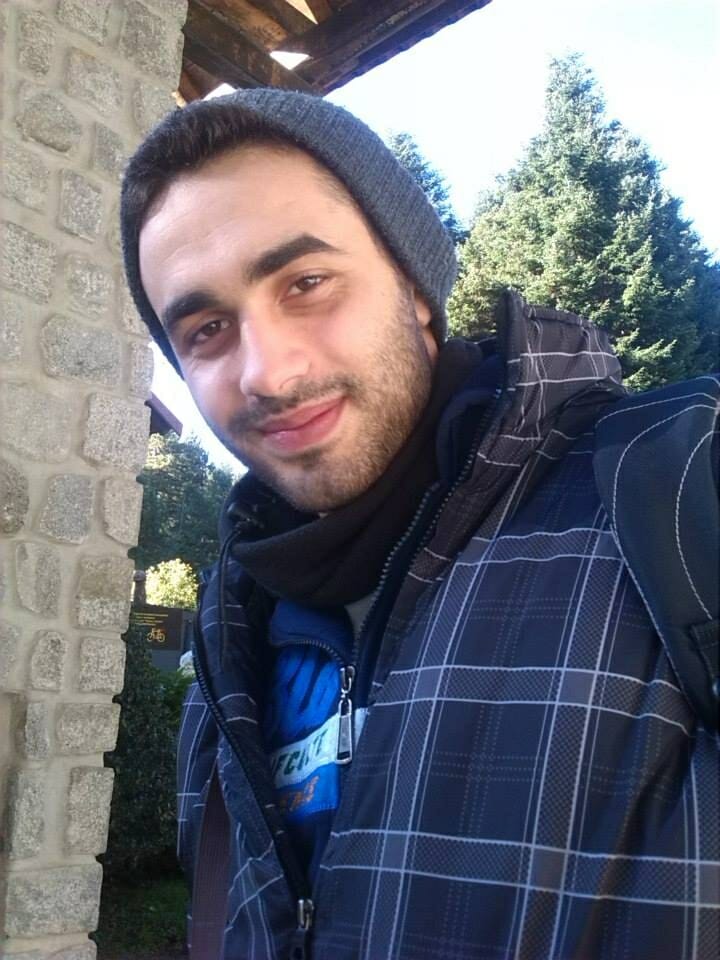 “For over 3 months now I have been doing my apprenticeship in pediatric oncology, in a ward where you never know if the children you are assisting today will still be there tomorrow. It is absolutely not easy to live in continuous contact with the suffering of the innocent, since it gets to the point of putting to the test one’s decision to study pediatric nursing. On the first day, I was ready for anything. But once I set foot in the ward, I came face to face with a beautiful little girl. She was afflicted by one of the worst types of malignant tumours, at the terminal stage. I had no idea at all of how I was to go about it. I had never ever felt so useless and incapable, and was convinced that there was nothing useful I could do for her. There are also other children in the ward, and the day seemed to pass very quickly, but every time I entered the little girl’s room I would feel the same sensation of helplessness and inadequacy. It was already 2 p.m.- time to end my shift. I felt I could not leave without doing something for her. But what? In trying to put in practice the spirituality of unity, I had experimented that what matters in love is to love. That you do not need to do sensational things, just start with a small thing, without expecting great results. I felt I had done all I could for that little girl. So why was I feeling I could do more? In the morning, upon entering the hospital, I had noted that there was a chapel. Perhaps, I thought, loving that child meant praying for her. So I sat on one of the last pews, but did not know what to ask for her. I just sat in silence, with a great, oppressing pain in my heart. Little by little I began to feel that Jesus was taking all my suffering onto himself. With a free heart I could then entrust the child to Him and then go once again to greet her and her mother, to make them feel my closeness and great support. From that moment on, I continued going to that chapel often. It was there that I found the light to face and also comprehend in some way, the mystery of the suffering of the innocent, which we so frequently encounter. And it is the Crucified and Risen Christ who gives me the strength and the right attitude with which to approach the children and their relatives. Often I do not understand what I should do for them, but then the answer never fails to come. One day a 10 year-old girl was interned. She had been tossed from one hospital to another. The suspicion was that she had a serious blood disease, which was confirmed, and all of a sudden, she and her mother collapsed as if they had been hit by the avalanche of a diagnosis that did not offer a way out. I felt the importance of standing by them and taking on their pain, helping them as I could, even if I had to stay a few hours more in the hospital. During the day I could not do much, but when I had some free time from my duties, I would go to their room, to listen to and reassure the mother and let the child play a bit. And every time I it seems like a veil of serenity returns to their eyes, a new hope in facing the trials awaiting them. I try to live this way in many other situations, taking every possibility to stay a bit with “my” kids, not only to administer their treatments but to see them smile and face with serenity their difficult paths.”
“For over 3 months now I have been doing my apprenticeship in pediatric oncology, in a ward where you never know if the children you are assisting today will still be there tomorrow. It is absolutely not easy to live in continuous contact with the suffering of the innocent, since it gets to the point of putting to the test one’s decision to study pediatric nursing. On the first day, I was ready for anything. But once I set foot in the ward, I came face to face with a beautiful little girl. She was afflicted by one of the worst types of malignant tumours, at the terminal stage. I had no idea at all of how I was to go about it. I had never ever felt so useless and incapable, and was convinced that there was nothing useful I could do for her. There are also other children in the ward, and the day seemed to pass very quickly, but every time I entered the little girl’s room I would feel the same sensation of helplessness and inadequacy. It was already 2 p.m.- time to end my shift. I felt I could not leave without doing something for her. But what? In trying to put in practice the spirituality of unity, I had experimented that what matters in love is to love. That you do not need to do sensational things, just start with a small thing, without expecting great results. I felt I had done all I could for that little girl. So why was I feeling I could do more? In the morning, upon entering the hospital, I had noted that there was a chapel. Perhaps, I thought, loving that child meant praying for her. So I sat on one of the last pews, but did not know what to ask for her. I just sat in silence, with a great, oppressing pain in my heart. Little by little I began to feel that Jesus was taking all my suffering onto himself. With a free heart I could then entrust the child to Him and then go once again to greet her and her mother, to make them feel my closeness and great support. From that moment on, I continued going to that chapel often. It was there that I found the light to face and also comprehend in some way, the mystery of the suffering of the innocent, which we so frequently encounter. And it is the Crucified and Risen Christ who gives me the strength and the right attitude with which to approach the children and their relatives. Often I do not understand what I should do for them, but then the answer never fails to come. One day a 10 year-old girl was interned. She had been tossed from one hospital to another. The suspicion was that she had a serious blood disease, which was confirmed, and all of a sudden, she and her mother collapsed as if they had been hit by the avalanche of a diagnosis that did not offer a way out. I felt the importance of standing by them and taking on their pain, helping them as I could, even if I had to stay a few hours more in the hospital. During the day I could not do much, but when I had some free time from my duties, I would go to their room, to listen to and reassure the mother and let the child play a bit. And every time I it seems like a veil of serenity returns to their eyes, a new hope in facing the trials awaiting them. I try to live this way in many other situations, taking every possibility to stay a bit with “my” kids, not only to administer their treatments but to see them smile and face with serenity their difficult paths.”
Guatemala: Elections at the doorstep
In April, a huge fraud by officials of the Tax Administration Service in collusion with senior level political leaders was uncovered. The close collaboration between the Public Ministry and the International Commission Against Impunity in Guatemala (CICIG) led to dozens of people being brought to trial for corruption, including the Vice President. It raised a wave of indignation among citizens, which continues to grow. In the midst of those events, Raúl e Cecilia Di Lascio from Argentina attended a meeting with local members of the Focolare community on the weekend of August 22-23. Raúl is an architect and Economy of Commuion business owner, and Cecilia is a member of the international commission of the Political Movement for Unity. During their discussions they delved into topics concerning politics and the economy in the light of the charism of unity. Meeting during a period of such collective effervescence, transformed the moments of discussion among citizens of all ages and backgrounds an opportunity to be open to a field that is generally looked upon negatively. Chiara Lubich’s vision of politics when she founded the Political Movement for Unity: the great values that political action manifests when it is seen as service in favour of the common good. Looking at politics through the lens of fraternity, which liberates courageous and socially committed attitudes, filled the hopes of the participants, supported by the exchange of experiences that are currently underway in several parts of the world. In the days that followed Guatemalan society held a mass protest demanding the resignation of the President – also requested by Catholic and other Christian church leaders – after connections to corruption were uncovered. Many businesses, schools and universities closed in order to allow people to take part in the protests, including the Mariapolis Centre and Fiore College. The large concentration of people in the Central Park of Guatemala became a solid mass: more than 100,000 people gathered in the time span of a day. Will states: “You can feel that there is a void in the heart of Guatemala that was not filled. We need to unite so that a change can come.” The fact of so many people peacefully demonstrating did not go unappreciated: “The nice thing is that even businesses closed, in order to allow people to take part in the demonstrations. As a Guatemalan I trembled as we cried ‘Guatemala, Guatemala’ or sang the national anthem.” Lina, a teacher states: “I saw a new sense of responsibility. We don’t want to allow the opportunity to change things, to pass us by, knowing that this time it’s possible.” For many it was encouraging to see entire families who were not afraid to bring along their children. “Rich families and poor families together,” Sandra remarks, “indigenous peoples, young people, children and adults – all of them together, and students prepared to resist violence in order to reach the common goal!” the goal that Alex calls: “a better country.” The latest news is that the President of the Republic lost immunity and resigned “for the good of society” and is now under arrest. On September 6 citizens will be invited to the election booths and all indications are that things will unfold in a peaceful and democratic way.
By Filippo Casabianca, Guatemala City
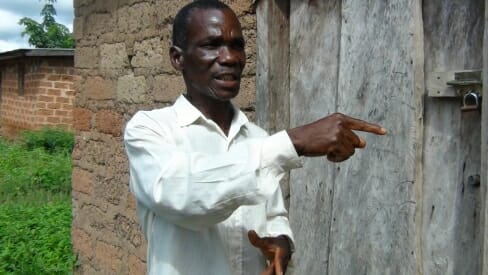
Glolé: We have a place for you to stay
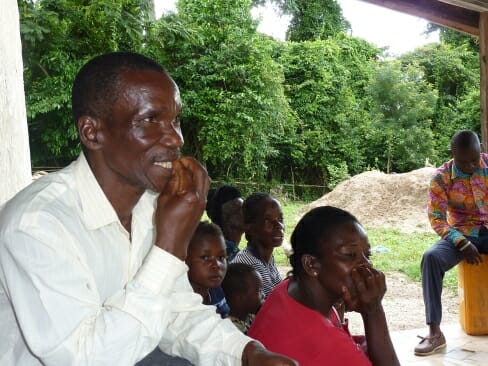 Seven kilometres into the forest, reachable on foot or by baka (van), which is the only thing capable of travelling over the mud and holes during the rainy season, lies the village of Glolé. It is one of eighteen Cantons in the region of Tonkpi, northwest of the Ivory Coast. There is no electricity, and therefore no television, internet or shops. Many of the people in that region have been touched by Chiara Lubich’s ideal of brotherhood. They live it in their daily lives beginning with putting into practice the Word of the Gospel; even the social and political structures have been gradually enriched and illuminated by the experience. Gilbert Gba Zio is a community leader, catechist and head of a family: “One day we asked ourselves what we should do for our little village,” he said during a recent meeting of the Economy of Communion in Nairobi, Kenya. “We saw that living out the Word of the Gospel could provide some guidelines.” Here are some of the concrete results of that decision. House for the strangers (guests). For Glolé the local saying “Kwayeko,” (We have a place for you to stay), was not merely a saying. “There are many people who walk through our area, they walk many miles and have sleep on the roadside until they reach their destination village. We always give our bed to our guests every time. This is also the Gospel’s way, but we said to ourselves: “Couldn’t we do more? Why don’t we build small houses, so when anybody arrives, we can offer them somewhere to sleep? So we began to make bricks, singing songs of joy. There were some bricklayers in our group and we built twelve small houses with one bedroom and a small living room in each. Now we can say to the strangers who arrive: “We have a house, come and sleep there. There is always some food, too, since we are all farmers. In this way, we took the first steps.
Seven kilometres into the forest, reachable on foot or by baka (van), which is the only thing capable of travelling over the mud and holes during the rainy season, lies the village of Glolé. It is one of eighteen Cantons in the region of Tonkpi, northwest of the Ivory Coast. There is no electricity, and therefore no television, internet or shops. Many of the people in that region have been touched by Chiara Lubich’s ideal of brotherhood. They live it in their daily lives beginning with putting into practice the Word of the Gospel; even the social and political structures have been gradually enriched and illuminated by the experience. Gilbert Gba Zio is a community leader, catechist and head of a family: “One day we asked ourselves what we should do for our little village,” he said during a recent meeting of the Economy of Communion in Nairobi, Kenya. “We saw that living out the Word of the Gospel could provide some guidelines.” Here are some of the concrete results of that decision. House for the strangers (guests). For Glolé the local saying “Kwayeko,” (We have a place for you to stay), was not merely a saying. “There are many people who walk through our area, they walk many miles and have sleep on the roadside until they reach their destination village. We always give our bed to our guests every time. This is also the Gospel’s way, but we said to ourselves: “Couldn’t we do more? Why don’t we build small houses, so when anybody arrives, we can offer them somewhere to sleep? So we began to make bricks, singing songs of joy. There were some bricklayers in our group and we built twelve small houses with one bedroom and a small living room in each. Now we can say to the strangers who arrive: “We have a house, come and sleep there. There is always some food, too, since we are all farmers. In this way, we took the first steps. 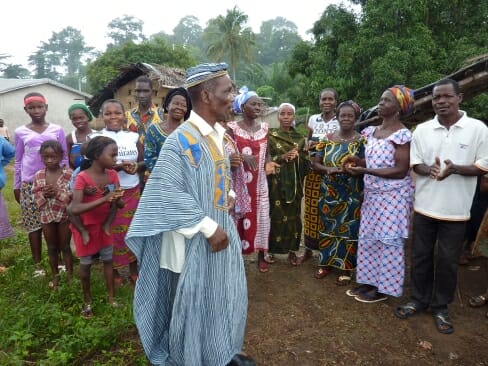 House of Health. During the rainy season it is difficult to reach the paved road and travel the additional 30 km to the city of Man, which is the closest urban centre. This makes it quite difficult in the case of a medical emergency. “One day there was a woman who was giving birth and it was a complicated labour,” Gilbert recounts. “We took her to the asphalt road in a wheelbarrow to get her in a car. Thank God, the woman was saved; but it was tough. Therefore it was necessary to build a house of health and bring some traditional midwives to help women in labour. But where to find the money? We have tenant farming in our region: the proprietor of a piece of land can give it to someone else to cultivate for one season. In the end, the harvest is divided in two equal parts and shared between them. Our community took a coffee plantation: the men pulled the weed out from among the plants, the women harvested the coffee. With the money we could buy the cement and build the House of Health.
House of Health. During the rainy season it is difficult to reach the paved road and travel the additional 30 km to the city of Man, which is the closest urban centre. This makes it quite difficult in the case of a medical emergency. “One day there was a woman who was giving birth and it was a complicated labour,” Gilbert recounts. “We took her to the asphalt road in a wheelbarrow to get her in a car. Thank God, the woman was saved; but it was tough. Therefore it was necessary to build a house of health and bring some traditional midwives to help women in labour. But where to find the money? We have tenant farming in our region: the proprietor of a piece of land can give it to someone else to cultivate for one season. In the end, the harvest is divided in two equal parts and shared between them. Our community took a coffee plantation: the men pulled the weed out from among the plants, the women harvested the coffee. With the money we could buy the cement and build the House of Health.  Children suffering from malnutrition. “There were children dying in the village and we did not know that we could actually save them. In the Focolare’s permanent Mariapolis, there is a centre taking care of them. We explained the problem to them and started bringing the children in. We were surprised to see that the children were getting healed in that place without any medications. They taught us how to feed them. One day, the head of the centre told us: ‘If you want, we can go to your place.’ In our culture a child belongs to the whole village! They explained to us how to prevent and how to cure this illness. We started to change our food related habits, and we learned that it is necessary to eat beans, peanuts, mushrooms . . . and we learned how to conserve food so we could give our children to eat even in times of famine.” Rice Bank. “We store the rice in smaller granaries, but they are frequently ‘visited’ by thieves and mice. So, we built a rammed earth house where everyone sent what they had. In the beginning, we were only 30 people. Nowadays, some farmers who are not members of our group have joined us, too, and 110 people are bringing their sacks of rice keep in our bank. In the months of March and April, during the sowing season, they take what they need for sowing and set aside what they need for feeding their children. At the right time, when the prices are good, they take away their rice and sell it. Everyone donates a part of their harvest according to their conscience and deposits it in the bank as a contribution to compensate for the needs of the community and for those who guard the rice bank.” One village is not enough. “‘Couldn’t you come to us with your business?’ the people of the neighbouring villages said to us. Today there are 13 villages that live like us in Glolé. Unity is our wealth. One day, there came an outside who wanted to help us make a well for the village. But we could not agree about the location of it. Had we insisted on having a well, it would have brought division to the village. So we preferred not to accept this gift in order to keep the unity amongst us. See “Economia di Comunione – una cultura nuova” n.41 – Eitorial insert from Città Nuova n.13/14 – 2015 – luglio 2015 See Nouvelle Cité Afrique Juillet 2015 Glolè (Ivory Coast): Congress EoC 2015
Children suffering from malnutrition. “There were children dying in the village and we did not know that we could actually save them. In the Focolare’s permanent Mariapolis, there is a centre taking care of them. We explained the problem to them and started bringing the children in. We were surprised to see that the children were getting healed in that place without any medications. They taught us how to feed them. One day, the head of the centre told us: ‘If you want, we can go to your place.’ In our culture a child belongs to the whole village! They explained to us how to prevent and how to cure this illness. We started to change our food related habits, and we learned that it is necessary to eat beans, peanuts, mushrooms . . . and we learned how to conserve food so we could give our children to eat even in times of famine.” Rice Bank. “We store the rice in smaller granaries, but they are frequently ‘visited’ by thieves and mice. So, we built a rammed earth house where everyone sent what they had. In the beginning, we were only 30 people. Nowadays, some farmers who are not members of our group have joined us, too, and 110 people are bringing their sacks of rice keep in our bank. In the months of March and April, during the sowing season, they take what they need for sowing and set aside what they need for feeding their children. At the right time, when the prices are good, they take away their rice and sell it. Everyone donates a part of their harvest according to their conscience and deposits it in the bank as a contribution to compensate for the needs of the community and for those who guard the rice bank.” One village is not enough. “‘Couldn’t you come to us with your business?’ the people of the neighbouring villages said to us. Today there are 13 villages that live like us in Glolé. Unity is our wealth. One day, there came an outside who wanted to help us make a well for the village. But we could not agree about the location of it. Had we insisted on having a well, it would have brought division to the village. So we preferred not to accept this gift in order to keep the unity amongst us. See “Economia di Comunione – una cultura nuova” n.41 – Eitorial insert from Città Nuova n.13/14 – 2015 – luglio 2015 See Nouvelle Cité Afrique Juillet 2015 Glolè (Ivory Coast): Congress EoC 2015
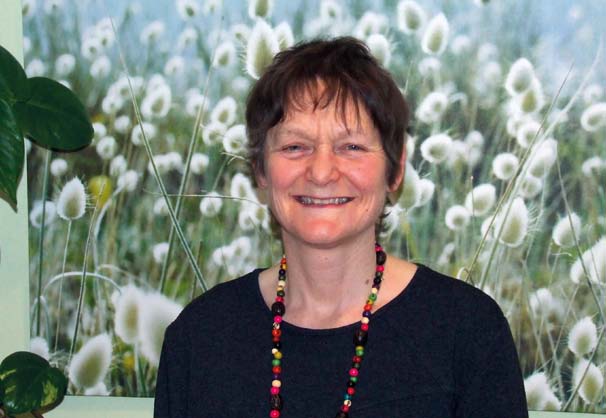
Londoner, Anglican and Focolarina
 “Aboard the bus to the hospital in Harefield, Great Britan, where I was studying nursing, I was impressed by one my colleague’s way of acting. I was very shy then, but she started to make friends with me, and I was impressed by that. She invited me to breakfast, in spite of having some of her ‘wilder’ friends nearby. She didn’t make a distinction. I was trying to be a Christian but wasn’t very happy. I would go to church on Sundays more to salve my conscience than anything else. But she spoke of joyful faith, genuine faith that she shared with other young women like herself, faith illuminated by love. One day she arrived at the hospital with a guitar to celebrate with one of the nurses who was notorious for not getting on with people. I said to myself, if this woman is able to do so much, perhaps it would be worthwhile to find out what’s behind behind it. She told me about the spirituality of unity that inspired her. I began to visit the people at the focolare and every time I found new ways to give of myself: sharing some clothing or food with those in need, offering to do something practical like the washing, etc. These small gesture, which were the fruit of the Gospel that I had also begun to put into practice, made me feel much joy inside me. Even though I still didn’t know what the Focolare Movement was, I knew it was the place I had to be. I looked at the radical choice the focolarinas and thought I would love to have the courage to be like them. But they’re Catholics, and I’m Anglican. . . I felt this voice inside me saying, ‘But you can, you know. Why don’t you just say your yes to me?’ I felt like taking a step off a cliff by saying my yes to God. It was so unlike me, but I was happy to want to follow him forever. I became a nurse specialised in midwifery, because of a deep desire to bring a change in society. I thought that with this specialization I could go abroad, and I had already put some money aside for the trip. When I entered the focolare I gave that money to the poor and began my formation to become a focolarina. My first destination was the focolare in Leeds for five years. I worked in an area of the city with deep rooted social problems. I had came from a middle class backgound and had a romanticised idea of what poverty was. When one particular girl came to the clinic, she always had the same clothes on and her tights were full of holes. It was important for me to build a relationship with her, to get to know her so that she could tell me about her situation, where she lived, and so on. One day I visited her home. Her partner was standing in the doorway, very verbally aggressive towards me. I was so shocked by the man and the state of the house, that I could hardly talk. Then I noticed a big tank of fish on the wall, so I started to talk about the fish and the tension melted. On my next visit I brought along some dresses, and the third time I found her sitting on the window sill ready to show off her new clothes. I now live in the focolare at Welwyn Garden City and continue to work for the National Health Service (NHS). In recent years there was upheaval in the NHS and it’s not so easy to bring that change that inspired me at the start of my career. But even in this upheaval I strive to do everything as an act of love towards God and my brothers and sisters. Living in community with people who have made the same choice in life is an important opportunity also for my job; but also to grow together in the unity amongst us and in our faith in God-Love, giving ourselves to others whether they are Catholic or Anglican.”
“Aboard the bus to the hospital in Harefield, Great Britan, where I was studying nursing, I was impressed by one my colleague’s way of acting. I was very shy then, but she started to make friends with me, and I was impressed by that. She invited me to breakfast, in spite of having some of her ‘wilder’ friends nearby. She didn’t make a distinction. I was trying to be a Christian but wasn’t very happy. I would go to church on Sundays more to salve my conscience than anything else. But she spoke of joyful faith, genuine faith that she shared with other young women like herself, faith illuminated by love. One day she arrived at the hospital with a guitar to celebrate with one of the nurses who was notorious for not getting on with people. I said to myself, if this woman is able to do so much, perhaps it would be worthwhile to find out what’s behind behind it. She told me about the spirituality of unity that inspired her. I began to visit the people at the focolare and every time I found new ways to give of myself: sharing some clothing or food with those in need, offering to do something practical like the washing, etc. These small gesture, which were the fruit of the Gospel that I had also begun to put into practice, made me feel much joy inside me. Even though I still didn’t know what the Focolare Movement was, I knew it was the place I had to be. I looked at the radical choice the focolarinas and thought I would love to have the courage to be like them. But they’re Catholics, and I’m Anglican. . . I felt this voice inside me saying, ‘But you can, you know. Why don’t you just say your yes to me?’ I felt like taking a step off a cliff by saying my yes to God. It was so unlike me, but I was happy to want to follow him forever. I became a nurse specialised in midwifery, because of a deep desire to bring a change in society. I thought that with this specialization I could go abroad, and I had already put some money aside for the trip. When I entered the focolare I gave that money to the poor and began my formation to become a focolarina. My first destination was the focolare in Leeds for five years. I worked in an area of the city with deep rooted social problems. I had came from a middle class backgound and had a romanticised idea of what poverty was. When one particular girl came to the clinic, she always had the same clothes on and her tights were full of holes. It was important for me to build a relationship with her, to get to know her so that she could tell me about her situation, where she lived, and so on. One day I visited her home. Her partner was standing in the doorway, very verbally aggressive towards me. I was so shocked by the man and the state of the house, that I could hardly talk. Then I noticed a big tank of fish on the wall, so I started to talk about the fish and the tension melted. On my next visit I brought along some dresses, and the third time I found her sitting on the window sill ready to show off her new clothes. I now live in the focolare at Welwyn Garden City and continue to work for the National Health Service (NHS). In recent years there was upheaval in the NHS and it’s not so easy to bring that change that inspired me at the start of my career. But even in this upheaval I strive to do everything as an act of love towards God and my brothers and sisters. Living in community with people who have made the same choice in life is an important opportunity also for my job; but also to grow together in the unity amongst us and in our faith in God-Love, giving ourselves to others whether they are Catholic or Anglican.”
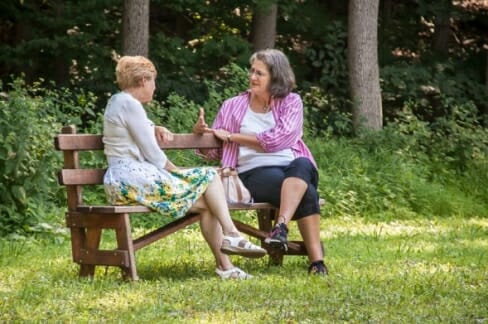
USA: Dialogue and the difficult questions
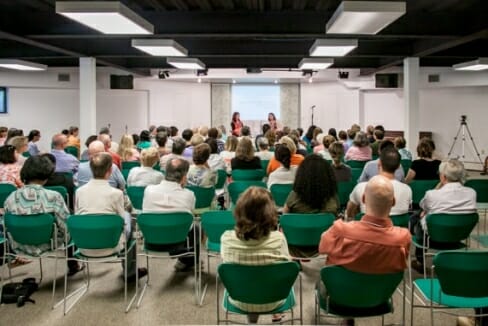 In 1998, Chiara Lubich established the Education for Dialogue Centre in Mariapolis Luminosa, the Focolare’s permanent Mariapolis in the State of New York. For that occasion she wrote: “May all those who take part in the activities of this centre also feel like builders of this new reality, collaborating with love, patience, mutual understanding and solidarity, in order to create an island of peace and a sign of unity for today’s world. . . may it especially be a school where one learns to live out this love, which is the only thing that can make the peoples of the earth a single family.” “These words from Chiara also informed a recent meeting of August 15 and 16 at the North American Mariapolis, titled: Dialogue and the Difficult Questions. It was attended by a hundred people and it focused on how to dialogue and communicate with people who think differently.”
In 1998, Chiara Lubich established the Education for Dialogue Centre in Mariapolis Luminosa, the Focolare’s permanent Mariapolis in the State of New York. For that occasion she wrote: “May all those who take part in the activities of this centre also feel like builders of this new reality, collaborating with love, patience, mutual understanding and solidarity, in order to create an island of peace and a sign of unity for today’s world. . . may it especially be a school where one learns to live out this love, which is the only thing that can make the peoples of the earth a single family.” “These words from Chiara also informed a recent meeting of August 15 and 16 at the North American Mariapolis, titled: Dialogue and the Difficult Questions. It was attended by a hundred people and it focused on how to dialogue and communicate with people who think differently.” 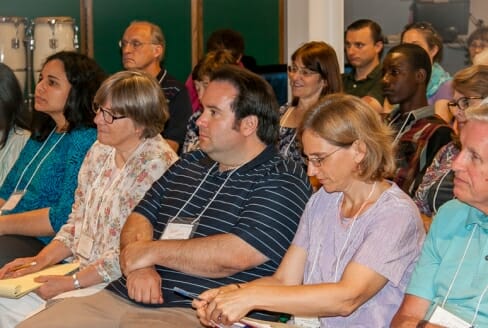 There were also very valuable contributions by four experts in moral theology and political theories from Fordham University (New York), Providence College (Rhode Island) and Georgetown University (Washington D.C.). They write: “We began with some words from Chiara Lubich on the dialogue that emerges particuarly from the spirituality of unity which, if practiced, helps to transform people’s relationships with eah other.” Charlie Camosy (Fordham) and Amy Uelman (Georgetown), examined the “reasons why USA society is so polarized by opposing positions and how the walls between people could be broken down by listening and being open to others.” Dana Dillon (Providence College) dealt with the delicate relationship between love and truth, based on one of the main points of the spirituality of unity: Jesus forsaken. The theologian presented Him as the true model of dialogue inasmuchh as “He entered into the disunity of that moment in which He felt abandoned by the Father, unifying the greatest division possible, the one between Heaven and earth.” In the afternoon there was an interactive programme offered by Claude Blanc, a leadership coach and team work consultant, who guided the participants in several exrecises in “learning to listen deeply and without pretexts.” A reflection on “Different Ways of Communicating” (imposing, discussing, trying to convince the other, and focusing on the common good), given by Bill Gould (Fordham),brought the session to a perfect conclusion.
There were also very valuable contributions by four experts in moral theology and political theories from Fordham University (New York), Providence College (Rhode Island) and Georgetown University (Washington D.C.). They write: “We began with some words from Chiara Lubich on the dialogue that emerges particuarly from the spirituality of unity which, if practiced, helps to transform people’s relationships with eah other.” Charlie Camosy (Fordham) and Amy Uelman (Georgetown), examined the “reasons why USA society is so polarized by opposing positions and how the walls between people could be broken down by listening and being open to others.” Dana Dillon (Providence College) dealt with the delicate relationship between love and truth, based on one of the main points of the spirituality of unity: Jesus forsaken. The theologian presented Him as the true model of dialogue inasmuchh as “He entered into the disunity of that moment in which He felt abandoned by the Father, unifying the greatest division possible, the one between Heaven and earth.” In the afternoon there was an interactive programme offered by Claude Blanc, a leadership coach and team work consultant, who guided the participants in several exrecises in “learning to listen deeply and without pretexts.” A reflection on “Different Ways of Communicating” (imposing, discussing, trying to convince the other, and focusing on the common good), given by Bill Gould (Fordham),brought the session to a perfect conclusion.  The roundtable discussion on Sunday, evidenced the need for being prepared to confront some current burning issues as well as the challenges of daily life. Two impressions: “The workshop on listening helped me to see how importnat and fruitful this can be in daily relationships;” “I leave quite enriched by this experience.”
The roundtable discussion on Sunday, evidenced the need for being prepared to confront some current burning issues as well as the challenges of daily life. Two impressions: “The workshop on listening helped me to see how importnat and fruitful this can be in daily relationships;” “I leave quite enriched by this experience.”

Environmental campaign by Religions for Peace
 Climatic change is one of the major moral challenges of our times. Several religious leaders unite in order to support a worldwide petition in favour of 100% of renewable energy by 2050. Religions for Peace is the world’s largest and most representative multi-religious coalition-advances common action among the world’s religious communities for peace. Religions for Peace works to transform violent conflict, advance human development, promote just and harmonious societies, and protect the earth. The global Religions for Peace network comprises a World Council of senior religious leaders from all regions of the world; six regional inter-religious bodies and more than ninety-two national ones; and the Global Women of Faith Network and Global Interfaith Youth Network. The President of the Focolare Movement, Maria Voce, who is one of the co-presidents of Religions for Peace, is aware of the moral responsibility necessary for the care of our planet. She is personally supporting the petition addressed to heads of states and invites all the interested to join the campaign. To sign the online petition visit http://faithsforearth.org and select your country.
Climatic change is one of the major moral challenges of our times. Several religious leaders unite in order to support a worldwide petition in favour of 100% of renewable energy by 2050. Religions for Peace is the world’s largest and most representative multi-religious coalition-advances common action among the world’s religious communities for peace. Religions for Peace works to transform violent conflict, advance human development, promote just and harmonious societies, and protect the earth. The global Religions for Peace network comprises a World Council of senior religious leaders from all regions of the world; six regional inter-religious bodies and more than ninety-two national ones; and the Global Women of Faith Network and Global Interfaith Youth Network. The President of the Focolare Movement, Maria Voce, who is one of the co-presidents of Religions for Peace, is aware of the moral responsibility necessary for the care of our planet. She is personally supporting the petition addressed to heads of states and invites all the interested to join the campaign. To sign the online petition visit http://faithsforearth.org and select your country.

World Day of Prayer for the Care of Creation
 It was a decidedly ecumenical move on the part of Pope Francis to dedicate a “World Day of Prayer for the Care of Creation.” He not only identified the current ecological crisis as one of the most pressing urgencies of our time but also wanted to highlight the urgent need to act no longer fragmented and in isolation but “together” – not only in the field of ecology but in all the challenges facing humankind. The idea of a World Day of Prayer had been suggested to him by Orthodox Metropolitan John of Pergamom who spoke at the public presentation of the Encyclical Letter Laudato sì on June 18th. To underscore the added value of a prayer that is made by agreement (Mt. 18:19), in the letter that institutes the Day of Prayer (June 8, 2015) the Pope exhorts: “Sharing the concern of my beloved brother, Ecumenical Patriarch Bartholomew, for the future of creation, and at the suggestion of his representative, Metropolitan John of Pergamum . . .” As if to say that it was not important who had the idea; we can always learn from each other! And to reiterate the idea, towards the end of the document, the Pope urges Cardinal Koch, president of the Pontifical Council for the Promotion of Christians Unity, “to ensure that it is coordinated with similar initiatives undertaken by the World Council of Churches.” The World Council of Churches will dedicate “the period between September 1st (the first day of the Orthodox Liturgical Year) to October 4th (feast day of Saint Francis of Assisi on the Roman Catholic liturgical calendar) – to a Time for Creation with a variety of initiatives in favour of the environment and its connection to justice and peace. The Pope’s choice of September 1st for the yearly celebration of the World Day is quite significant, since it is the same as that of the Orthodox brothers and sisters and the day that begins the Time for Creation that was established by the World Council of Churches. Also significant is his wish that other churches and ecclesial communities join in, so that it might be a fruitful opportunity for giving witness “to our growing communion.” The annual World Day of Prayer for the Care of Creation will offer individual believers and communities “the precious opportunity to reaffirm their personal vocation to be stewards of creation, to thank God for the wonderful handiwork which he has entrusted to our care,” and precisely because it is destined to involve Christians from various denominations speaking with one voice, it will be a further concrete and common message from Christians to the world. A passion for the protection of Creation has also characterised the Focolare’s commitment with its international network EcoOne that offers a space for anyone working in the field of the environment to share ideas and concrete projects. The Movement’s involvement in the field of ecumenism is also significant, especially in places where there is a high concentration from people of different denominations. For the Focolare the World Day of Prayer for the Protection of Creation represents a magnificent providential world event that will join its members in prayer, beseeching from God the preservation of the Home that welcomes the great human family. But it will also join together people of good will from all backgrounds and beliefs in coming up with new strategies and answers for the environment and for a more united world.
It was a decidedly ecumenical move on the part of Pope Francis to dedicate a “World Day of Prayer for the Care of Creation.” He not only identified the current ecological crisis as one of the most pressing urgencies of our time but also wanted to highlight the urgent need to act no longer fragmented and in isolation but “together” – not only in the field of ecology but in all the challenges facing humankind. The idea of a World Day of Prayer had been suggested to him by Orthodox Metropolitan John of Pergamom who spoke at the public presentation of the Encyclical Letter Laudato sì on June 18th. To underscore the added value of a prayer that is made by agreement (Mt. 18:19), in the letter that institutes the Day of Prayer (June 8, 2015) the Pope exhorts: “Sharing the concern of my beloved brother, Ecumenical Patriarch Bartholomew, for the future of creation, and at the suggestion of his representative, Metropolitan John of Pergamum . . .” As if to say that it was not important who had the idea; we can always learn from each other! And to reiterate the idea, towards the end of the document, the Pope urges Cardinal Koch, president of the Pontifical Council for the Promotion of Christians Unity, “to ensure that it is coordinated with similar initiatives undertaken by the World Council of Churches.” The World Council of Churches will dedicate “the period between September 1st (the first day of the Orthodox Liturgical Year) to October 4th (feast day of Saint Francis of Assisi on the Roman Catholic liturgical calendar) – to a Time for Creation with a variety of initiatives in favour of the environment and its connection to justice and peace. The Pope’s choice of September 1st for the yearly celebration of the World Day is quite significant, since it is the same as that of the Orthodox brothers and sisters and the day that begins the Time for Creation that was established by the World Council of Churches. Also significant is his wish that other churches and ecclesial communities join in, so that it might be a fruitful opportunity for giving witness “to our growing communion.” The annual World Day of Prayer for the Care of Creation will offer individual believers and communities “the precious opportunity to reaffirm their personal vocation to be stewards of creation, to thank God for the wonderful handiwork which he has entrusted to our care,” and precisely because it is destined to involve Christians from various denominations speaking with one voice, it will be a further concrete and common message from Christians to the world. A passion for the protection of Creation has also characterised the Focolare’s commitment with its international network EcoOne that offers a space for anyone working in the field of the environment to share ideas and concrete projects. The Movement’s involvement in the field of ecumenism is also significant, especially in places where there is a high concentration from people of different denominations. For the Focolare the World Day of Prayer for the Protection of Creation represents a magnificent providential world event that will join its members in prayer, beseeching from God the preservation of the Home that welcomes the great human family. But it will also join together people of good will from all backgrounds and beliefs in coming up with new strategies and answers for the environment and for a more united world.

